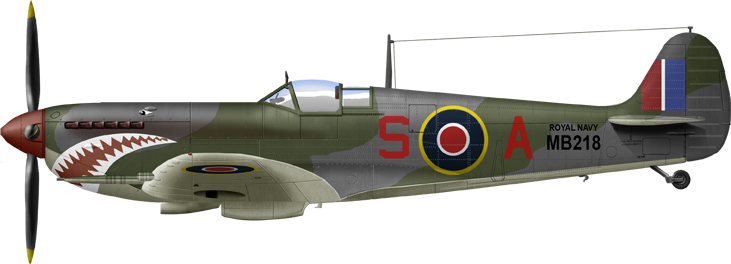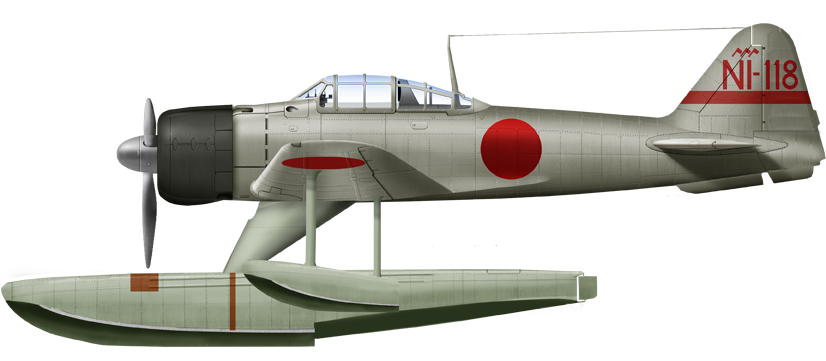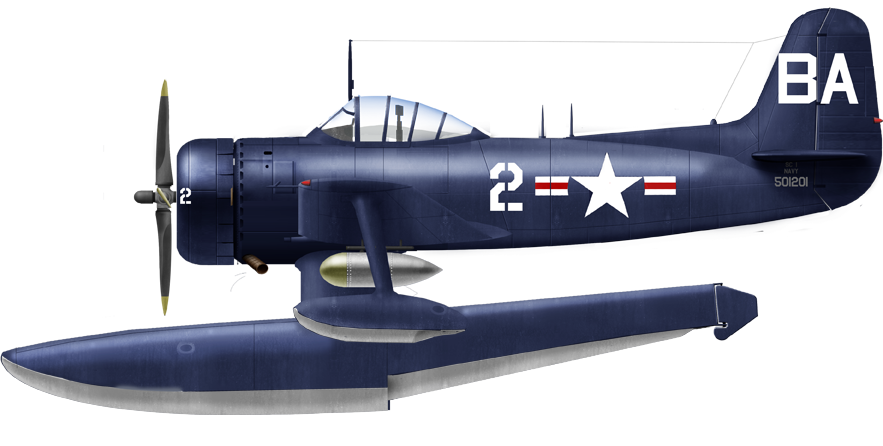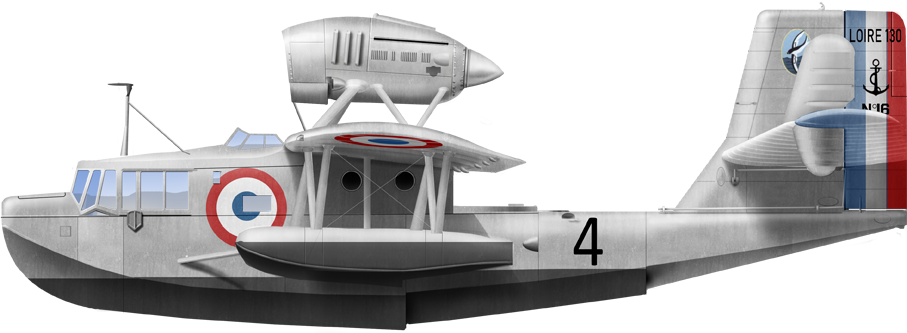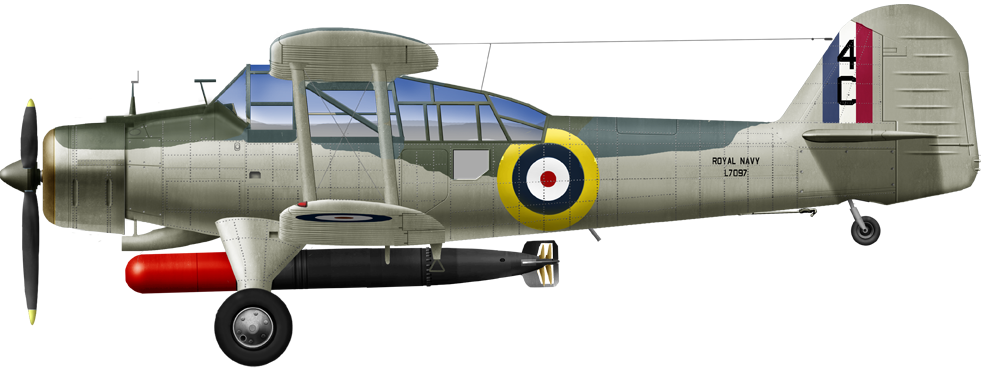Past Posts

✈ 10/12/2025
 Albatros W.8 (1918)
Albatros W.8 (1918)
The Albatros W.8 was a German biplane fighter floatplane of the late First World War, on patrol in the latter half of 1918. It was classic in its approach with a wooden fuselage wrapped in canvas similar to most designs of that period, as well as the wings and tails, but a pair of wooden flattened floats. The W.8 was unique for its aft T style tail unit, and in that it was powered by water-cooled Benz Bz.IIIb eight-cylinder engine. More classically it was fitted with a fixed two-bladed wooden propeller. The W.8 was a two-seater fighter/reconnaissance model and merely a late war prototype, albeit three were still manufactured. A rarity worth investigating...
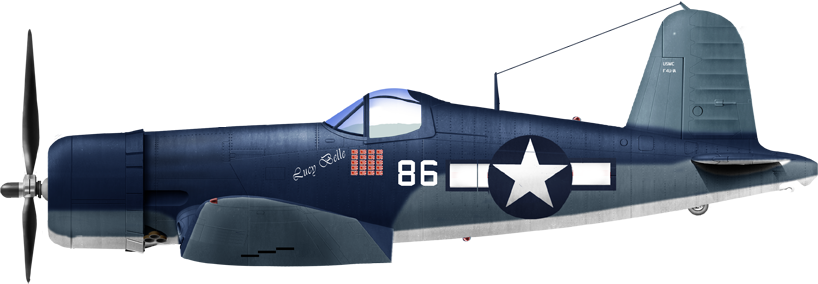
✈ 30/11/2025
 Vought F4U-1A/C/D Corsair (1943)
Vought F4U-1A/C/D Corsair (1943)
Second entry on the most famous naval fighter of WW2 and beyond, the F4U-1A, C and D, successors of the Birdcage (F4U-1) developed in 1942. They introduced the trademark bubble canopy improving visibility among others, and way more were produced (a combined 3,941 between 1943 and 1944) than the F4U-1A (758) and really cemented the final look of the Crorsair, which most fampus version evolved into the F4U-4. Brewster, lambasted for its disastrous handling of the Buffalo and especially Buccaneer was forced to accept its share in production of the Corsair with the F3A-1 and F3A-1D, and Goodyear as well with the FG-1 and FG-1D. It was also massively used by the FAA (510 Mark II from Vought, 430 Mark III from Brewster). It marked the transition from land-based only to carier-barsed operations for the USN as pioneered by the FAA, and really bore the brunt of 1944-45 operations in the Pacific.
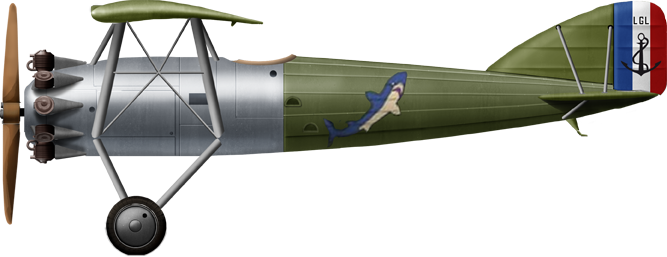
✈ 20/11/2025
 Loire Gourdou-Lesseure LGL-32 C1
Loire Gourdou-Lesseure LGL-32 C1
From 1925, Gourdou-Leseurre was absorbed by Loire shipyard and the fighter LGL.32 was the only one pushed for serial contruction, primarily for the Armée de l'Air, exported and declined into a multitude of variants. Powered by Gnrome-Rhone 9Ady engine with two synchronized 7.7 mm nose MGs and flying first in 1925, the naval aviation received 15 C.1 versions intended for for the Aircraft Carrier Béarn, just completed. By 1935, new models tested dive bombing for the Navy with a "V" landing gearand fourch, with six made. They were maintained on the Béarn until replaced by the Dewoitine D373, another parasol fighter.
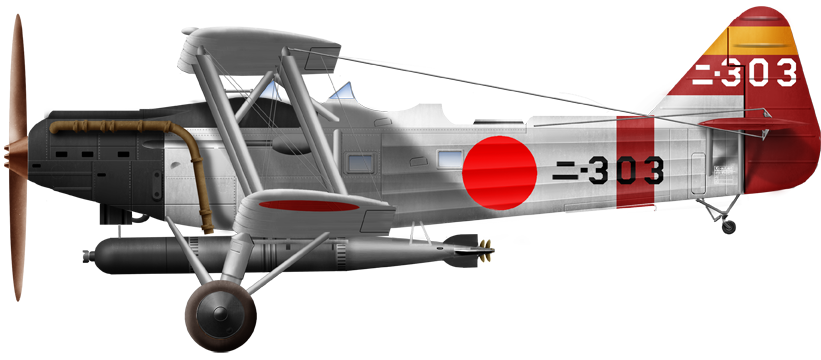
✈ 10/11/2025
 Mitsubishi B2M (1934)
Mitsubishi B2M (1934)
The Mitsubishi B2M was a Japanese carrier-based torpedo bomber developed from 1930. It was built by Mitsubishi to a design by Blackburn Aircraft of Britain and was operated by the Imperial Japanese Navy from 1934. After the failure of the B4M in 1934, Mitsubishi would ony produce the 2-engine land based G3M torpedo-bomber and concentrated on fighters. Th B2M1 was a carrier based model that pioneered new ship attack techniques from Hosho, Kaga and Akagi, and the B2M2 was used for bombing at high and low-level against China during the early phases of the Second Sino-Japanese War (1937). The B2M was replaced by the Nakajima B5N "Nate" monoplane.

✈ 30/10/2025
 Blackburn Shark (1934)
Blackburn Shark (1934)
The Shark was the last of Blackburn's torpedo-bombers, largely eclipsed in WW2 by the Fairey Swordfish, but still active from the Channel to Malaya until 1942. It first flew in 1933, as the Blackburn T.9 B6 to answer the Air Ministry Specification S.15/33 for a combined torpedo-(naval artillery) spotter-reconnaissance aircraft or "TSR", to which Fairey answered with the TSR-1, future Swordfish. The Shark Mark I was approved in 1934 with 16 aircraft, followed by the Mark II for the specs. 13/35. and 13/38 and the Mark III entering service in 1935 with 820 NAS. It was also declined as a floatplane for HMS Warspite and HMS Repulse, and saw service from some carriers, but gradually replaced by the swordfish from 1937. The last were used in Malaya in 1942 and the Canadian Shark III until 1944 as floatplane trainers.
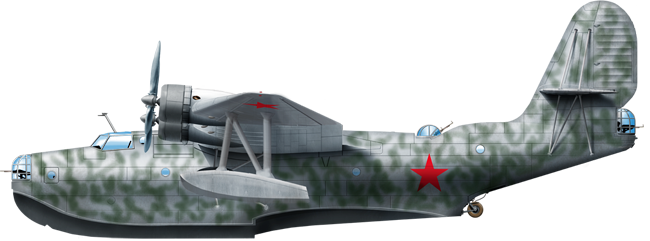
✈ 20/10/2025
 Tupolev MTB-2 (1937)
Tupolev MTB-2 (1937)
The Tupolev MTB2 heavy bomber (ANT44) was a four-engined flying boat designed in 1935. The first of two prototypes flew on April 19, 1937. In 1938, the four initial Gnome Rhône Mistral Major were replaced by 840-hp Tumansky M-87S and the next prototype ANT44bis had 950-hp M-87A engines, set several world records in class. However the option of land based bombers was preferred and the program cancelled so after the first prototype crashed, the second from the summer 1941 flew in the Black Sea until 1943, as bomber and transport until it was shot down by Me-109s.
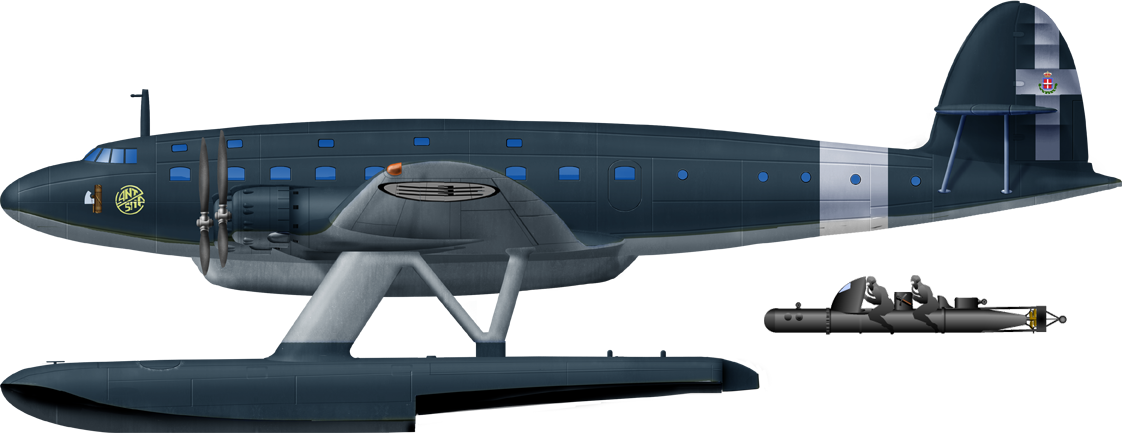
✈ 10/10/2025
 CANT Z.511 Idrogigante (1942)
CANT Z.511 Idrogigante (1942)
The CANT Z.511 was a four-engine long-range seaplane designed by Filippo Zappata of the "Cantieri Riuniti dell'Adriatico" (CRDA) company. Originally designed for the Central and South Atlantic passenger routes, it was later adapted as a military transport and special raider with plans to convert it as a long range bomber with up to 4t (8,800 lb) of bombs or fout 450 mm (17.9 in) air-launched torpedoes in antiship role, or special operations with "Maiale" manned torpedoes or midget submarines. In 1943 however the first prototyppe was still without purpose, endlessely evaluated until damaged by the RAF on Lake Trasimeno and scuttled after September 1943 at the Vigna di Valle seaplane base, then blasted out by explosives in June 1944. A sad end for the world's largest floatplane ever built.
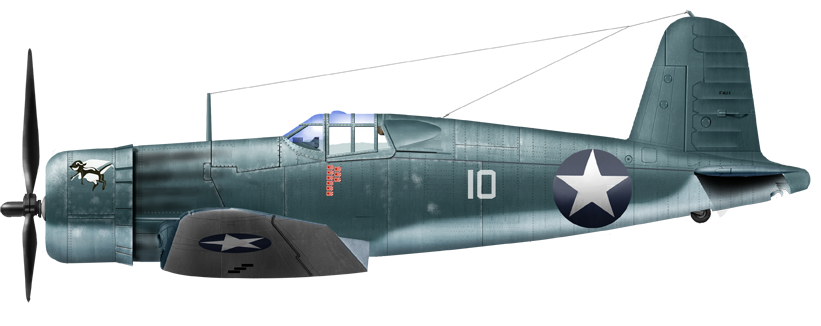
✈ 30/09/2025
 Vought F4U1 Corsair (1940)
Vought F4U1 Corsair (1940)
Probably the most famous fighter ever designed for any Navy, arguably, was the Vought F4U Corsair. Not only for its production went further than the Hellcat, but it outlived all for a very long active service. The very last in action were 19 Honduran F4U in the 1969 "soccer war" versus El Salvador, retired in 1976, for 36 years of service. Now this post is Part I, about the genesis of the model and the F4U-1 "Birdcage".
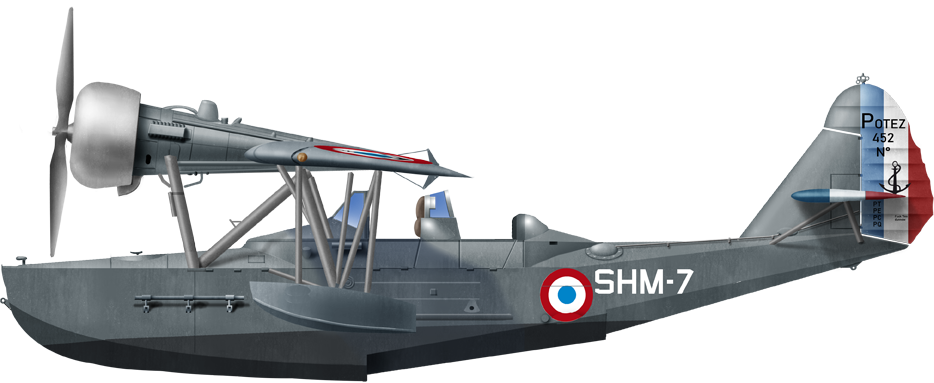
✈ 20/09/2025
 Potez 452 (1935)
Potez 452 (1935)
The Potez 452 was designed as a shipboard flying boat for observation on board cruisers and battleships of the Marine Nationale, in service from 1936 to 1944 in the Marine Nationale, notably to replace the loire-Gourdou Lesseure floaplanes of the 1920s. It saw service frontline until 1938-39 and was even developed as a single-seat fighter variant. However it was replaced by the Loire 130 before the war started, but continued operations until 1944.

✈ 10/09/2025
 Nakajima E2N (1927)
Nakajima E2N (1927)
The Nakajima E2N (Type 15) was an IJN interwar reconnaissance, single-engine, two-seat, sesquiplane with two floats. Developed as a short range reconnaissance floatplane for catapult launch from cruisers and battleships it was ordered to replace the Hansa-Brandenburg inspired Aichi and Yokosuka monoplanes. It was selected in instead of Aichi's Type 15 in 1927. The E2N2 was a training version made in 1928-1929 and in all c80 were produced until 1929, inc. a few by Kawanishi, and 2-3 used by the civilian fishery patrol. Replaced in 1932-1933 by the E4N, they lingered in training or were sold to civil buyers. The last trainer was retired from Kasamigaura Kōkūtai in 1936.
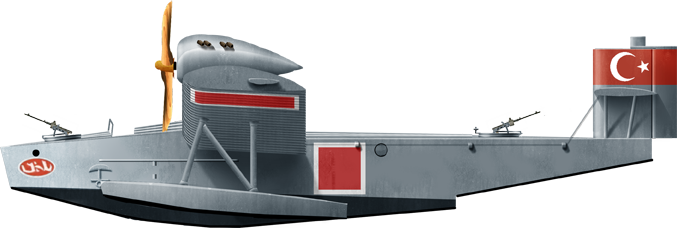
✈ 30/08/2025
 Rohrbach R.III (1924)
Rohrbach R.III (1924)
The Rohrbach Ro III was a twin-engined, all-metal flying boat built in Germany in the mid-1920s. A development of the Ro II, it could be configured either as an airliner or a reconnaissance aircraft. It was developed into the similar but more powerful Ro IIIa Rodra (Ro + dr(ei) + a), intended only as a military reconnaissance/bomber. Four Ro IIIs were bought by Japan and two Rodras by Turkey.
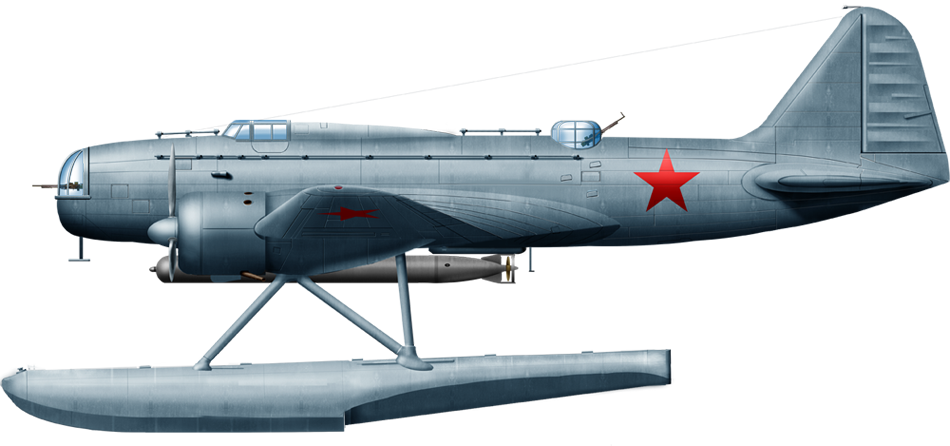
✈ 20/08/2025
 Illuchine DB-3T (1936)
Illuchine DB-3T (1936)
The DB-3T (torpedonosyets) was introduced in 1937, based on the Ilyushin DB-3 long-range bomber. It was adapted for Soviet Naval Aviation with minimal modifications with externals torpedo sling mounts as well as gear for naval mines or bombs. It was specifically configured for maritime operations with the 940kg 45/36/AN or /AV torpedo and either M.86 (195 kW / 950 hp) or M.87A radial engines. Torpedoes were dropped under 30m at 320km/h. In 1938, Ilyushin developed the floatplane DB-3TP (torpedonosyets poplavkovyi) using T-1P floats for sea-based operations with a structural reinforcement to the wings and center-section and stil capable of 343 km/h. It had limitations with operational complexity, maintenance, and logistics so there was a very limited production of the TP variant.
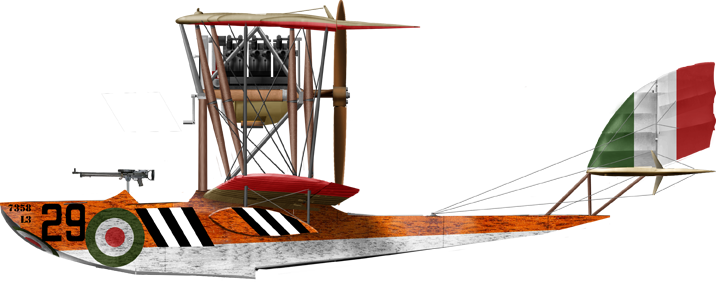
✈ 10/08/2025
 Macchi M3 (1916)
Macchi M3 (1916)
The Macchi M3 The Macchi M.3 (originally designated L.3, renamed M.3 in 1917) was an Italian biplane flying boat use by the Regia Marina. Developed from the earlier L.2 inspired by the Austrian Lohner, it retained only the unequal-span biplane wings combined with a new refined hull and tailplane structure, powered by a single Isotta Fraschini V.4B pusher, and armed with a single trainable machine gun and four light bombs. One set a world altitude record for seaplanes. Over 200 examples were built for patrol, bombing, reconnaissance, escort, succeeded by the M5 but sill around for training in 1924 and later in civilian hands.
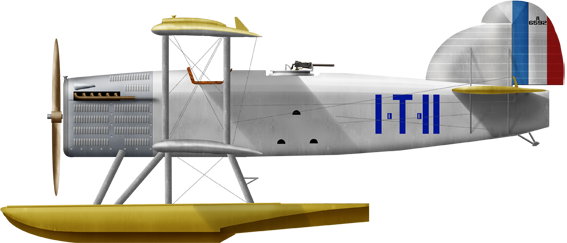
✈ 30/07/2025
 Douglas DT (1921)
Douglas DT (1921)
The Douglas DT-2 was the first dedicated USN torpedo-bomber and first Douglas Aircraft Company's military contract. It was a modern, yet ungainly beast with an all-welded-steel fuselage wrapped in aluminum as well as wood and fabric rudder, tails and wings. The DT-1 preserie first flew in November 1921 followed by a gradual production until 1924 of the DT-2. Variations designated DT-4, DT-5, DT-6, and DTB and export models to Norway and Peru added to the 90 delivered overall. They performed the first torpedo attacks from USS Langley or NAS Pensacola and even from Lexington and Saratoga in 1928, when retired. They opened a completely new chapter for the US. The type became also the basis for the USAAF record-setter Douglas World Cruiser.
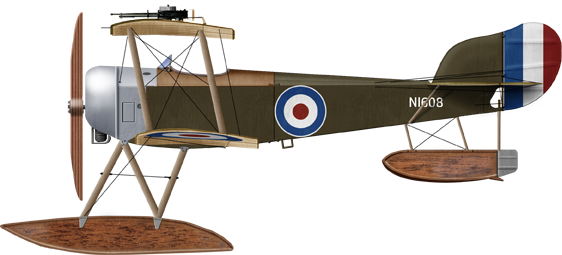
✈ 20/07/2025
 Sopwith Baby (1915)
Sopwith Baby (1915)
The Sopwith Baby was an observation seaplane developed from the Sopwith Schneider, the latter derived from a 1913 sports seaplane. The latter also had a land-based equivalent, the Tabloid. This was the first major success of Sopwith. The Baby had a better engine, a single seat, and was later improved by Blakckburn and Fairey, as well as Parnall, with 386 built total for the RNAS for all versions. Its other name was "Admiralty 8200 Type". It was active until 1918, used by Australia, France, Norway, and was also licenced to Italy for the Aviazione della Regia Marina.
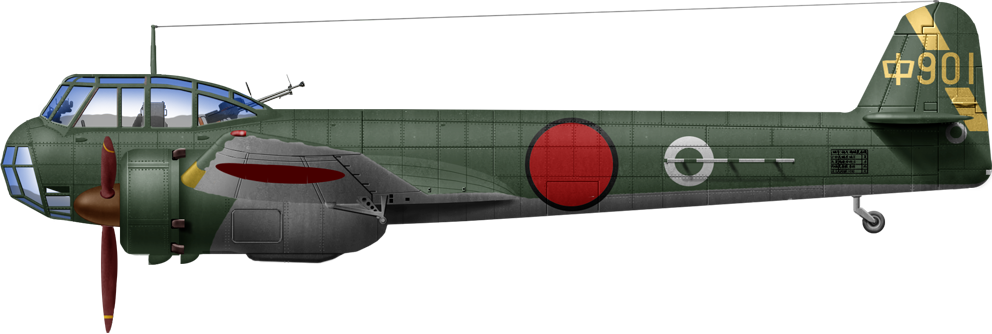
✈ 10/07/2025
 Kyushu Q1W Tōkai "Lorna" (1944)
Kyushu Q1W Tōkai "Lorna" (1944)
The Kyūshū Q1W Tōkai ("Eastern Sea") was the first Imperial Japanese Navy (or world's first) dedicated anti-submarine patrol aircraft (Allied name "Lorna"). Although superficially similar to the German Junkers Ju 88 it owe little to it in technical terms, being made deliberately slow and underpowered as well as much smaller, but for dive attacks still. But beyond its technical specs, it embodied the realization by late 1942 by the Imperial Japanese Navy staff that US submarines at large could pose a serious threat to its communication lines in its recently acquired Empire.
Something that will haunt the IJN for the next years. Development of the Kyūshū Q1W as the "Navy Experimental 17-Shi Patrol Plane" started indeed all the way back to September 1942, but it only first flew a year later in September 1943, and worst still, only entered service by October 1944. The core spec was not speed but visibility, electronic detection, and ability to fly low and slow for long period of time. The all-wooden Q3W1 Nankai (South Sea) was a successor developed alongside but went nowhere. Only 153 were delivered, and they arrived way too late to make a difference.
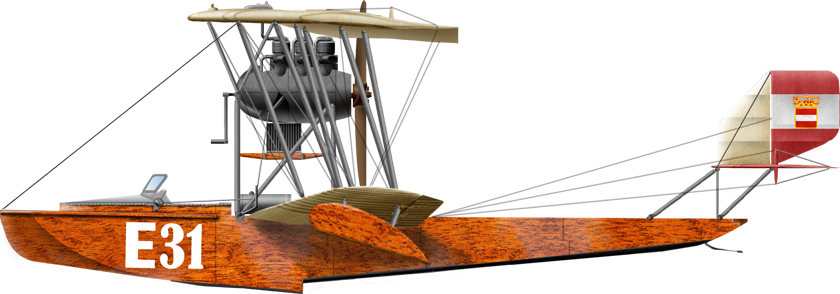
✈ 30/06/2025
✠ Lohner E
The Lohner E was an Austro-Hungarian reconnaissance flying boat of World War I. It was the first engaged in 1914, with "E" standing for Igo Etrich, one of Lohner's engineers in charge of the project. This conventional design featured slight sweepback, pusher engine in the interplane gap and crew of two seated side by side in the open cockpit, one pilot and one observer. The aircraft was unarmed, lacked speed and agility, and was soon recoignized as underpowered, but it was rugged and agile. After 40 were made, Lohner moved towards the far more powerful model L, copied by the Italians.
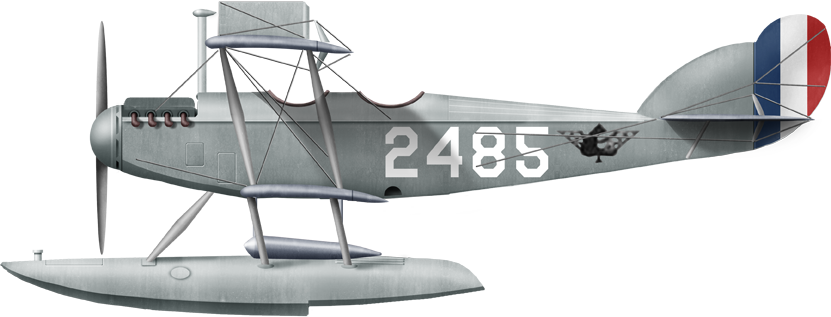
✈ 20/06/2025
 Curtiss Model N
Curtiss Model N
The Curtiss Model N was an early American trainer aircraft developed in the 1910s by the Curtiss Aeroplane and Motor Company, primarily used by the U.S. Navy. It played a significant role in the evolution of naval aviation training just before and during the early part of World War I. This single-engine biplane had a two-seat tandem cockpit, with space for both student and instructor with several versions (N-8, N-9, N-9H Floatplane. It was the first successful seaplane trainer for the U.S. Navy, pioneering naval aviation training methods and techniques in carrier and water takeoff and landing training. One example can be found at institutions like the National Naval Aviation Museum in Pensacola, Florida.
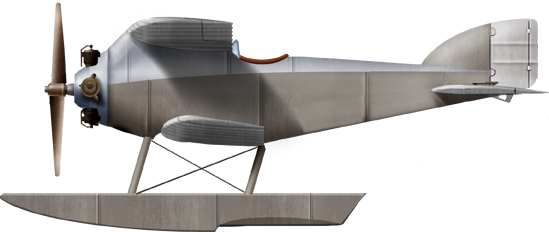
✈ 10/06/2025
 Caspar U.1 (1922)
Caspar U.1 (1922)
The Caspar U.1 (in some publications Caspar-Heinkel U.1) was a 1922 German patrol seaplane tailored for use on board a submarine. It was the world's first of its kind, tailor designed by Ernst Heinkel and built by Caspar-Werke. The U.1 was indeed designed to fit inside a cylindrical container carried and then launched from a submarine to solve the issue of reconnaissance. A U-boat standed quite low over the water and often had its visual horizon quite limited. A seaplane was for this an excellent spotted. The idea was alredy tested in WWI on many U-Boat with a regular seaplane simply carried on deck and launched when needed. To fit stringent requirements, the Caspar U1 was a really small aircraft, unarmed and compact enough, when dismounted, to fit inside a 1.70 m diameter tube. Tests were performed on a mock submarine built on the coast (as the Reichsmarine was forbidden to have submarines), but tests remained negative. The USN was interested as it looked for its own cruiser submarine to have up to seven seaplanes, and one was tested as NAS Anacostia in 1922. Overall, the concept was not resurrected by the Kriegsmarine, but tested by UK, France and in particular Japan, which developed a whole family around the idea in the interwar and WW2. U-Boats however had a more practical Fa 330 kite, used by U-177, U-181, and U-852.
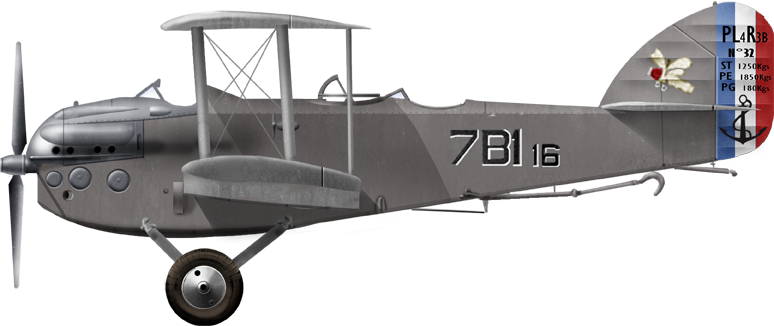
✈ 30/05/2022
 Levasseur PL.4 (1926)
Levasseur PL.4 (1926)
The Levasseur PL.4 was a carrier-based reconnaissance aircraft and conventional, single-bay biplane witha a crew of three in tandem open cockpits. The Aéronavale purchased 40 to operate the aircraft carrier Béarn, which conversion was just completed. It incorporated several safety features with a boat-like watertight fuselage, small floats underwing, jettisonable undercarriage and tailskid. It was rather mediocre however, slow and suggish to commands, with a poor range. The PL.7 torpedo bomber was developed a year later as well as the PL.8 "oiseau blanc" of Nungesser and Coli for their attempted Atlantic crossing before Lindbergh.
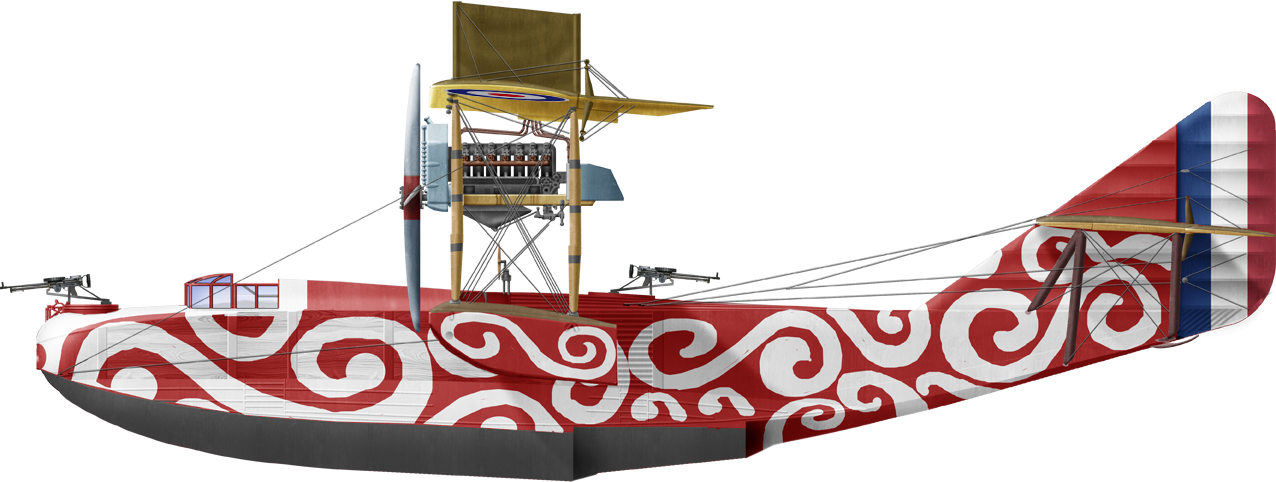
✈ 20/05/2025
 Felixtowe F.2 (1917)
Felixtowe F.2 (1917)
The Felixstowe F.2 was a 1917 British flying boat class designed and developed by Lieutenant Commander John Cyril Porte RN at the naval air station, Felixstowe during the First World War adapting a larger version of his superior Felixstowe F.1 hull design married with the larger Curtiss H-12 flying boat. The Felixstowe hull had superior water contacting attributes and became a key base technology in most seaplane designs thereafter.

✈ 10/05/2025
 Polikarpov I-16 in naval service (1936-45)
Polikarpov I-16 in naval service (1936-45)
The famous I-16, nicknamed "rata", "moska", "mule", was a very modern low wing canatilever all metal retractable landing undercarriage fighter model developed by Nikolai Polikarpov in 1933, and world's first deployed in operation by 1934, before the Hurricane, Spitfire and Me-109 or Curtiss P-36. More than 10,000 in 9 versions were cranked up until production stopped in the summer of 1941. Of these, 778 were assigned to squadrons defending the Baltic, Northern, Black Sea and Pacific Fleets of the Soviet Navy in world war two. This is a not well known chapter or soviet naval aviation, covered here in detail along the Black sea fleet's only Zveno "flying Aircraft carriers" successful operations in 1941.

✈ 05/05/2025
 CANT Z508 (1936)
CANT Z508 (1936)
The CANT Z.508 was a three-engine Italian flying boat developed from the CANT Z.501 for use as a heavy bomber, designed as a scaled-up three-engine version of the single-engine Z.501 for use as a heavy bomber. The aircraft was not put into production although the prototype set several world records for its class, including the lifting of a 1,000 kg (2,200 lb) load.

✈ 30/04/2025
 Brewster SBN (1941)
Brewster SBN (1941)
The N.A.F. SBN (initially Brewster SBA-1) was the first model of the infamous company that signed the Buffalo and Buccaneer. This three-seat mid-wing monoplane which first flew in 1936 as XSBA-1 was designed as a scout bomber/torpedo aircraft, to be built later under license by the Naval Aircraft Factory in Philadelphia, Pennsylvania. Its landing gear was similar to that on the Brewster F2A Buffalo fighter but it had non-folding wings with perforated flaps. NAF delivered 30 SBN in 1940, which only saw service on USS Saratoga (CV-3). Already obsolete, they were assigned to VT-8 and passed on for use as trainers aboard USS Hornet (CV-8), and due to the lack of spares, retired in August 1942.

✈ 20/04/2025
 Albatros W.4 (1916)
Albatros W.4 (1916)
The W.4 was a military floatplane designed and produced by Albatros Flugzeugwerke. This was a floatplane derivative of the famous Albatros D.I land-based fighter aircraft, with a modified wing and tail, greater span but the same 120 kW (160 hp) Mercedes D.III engine and fuselage. The first were armed with one lMG08 7.92 mm (.312 in) machine gun, two later. Three prototypes were produced in 1916, first combat seen in September 1916 in the North Sea and Baltic and last of 118 delivered in December 1917, supposed to be replaced by the W.8 in 1918 (only prototype).
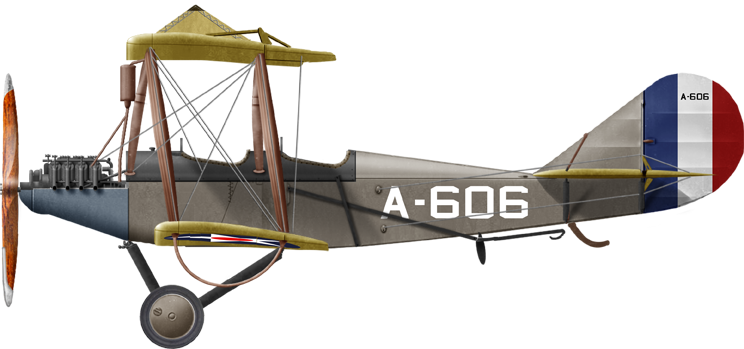
✈ 10/04/2024
 Aeromarine 39
Aeromarine 39
The Aeromarine 39 was an American two-seat training seaplane ordered by the US Navy in 1917 and built by the Aeromarine Plane and Motor Company of Keyport, New Jersey. Of conventional biplane configuration and construction, the aircraft was designed so that its pontoons could be speedily detached and replaced with wheeled undercarriage for shore operations.
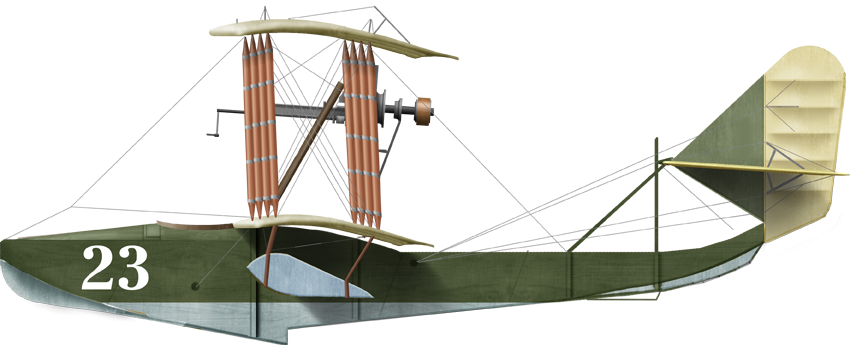
✈ 01/04/2025
 Grigorovich M-5 (1915)
Grigorovich M-5 (1915)
The Grigorovich M-5 (Or Shchetinin M-5) was the best Russian World War I seaplane by far. It led to a mass production with multiple variants, for a lineage that lived on until the late 1920s, and later lost to Beriev. The Grigorovitch M5, which followed two prewar prototypes and unbuilt projects was a sturdy and dependable two-bay unequal-span biplane flying boat with a single step hull. This was the first mass production flying boat built in Russia, a name synonimous with "seaplane" in tha era.
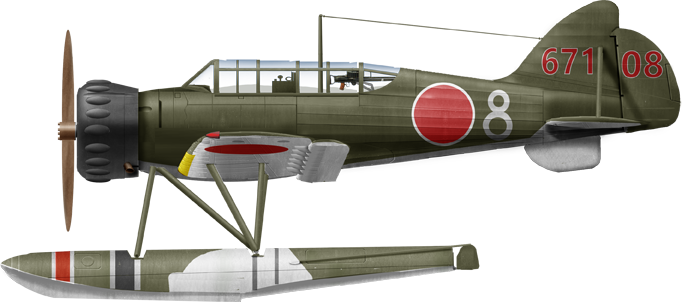
✈ 20/03/2025
 Kugisho (Yokosuka) E14Y "Glen" (1941)
Kugisho (Yokosuka) E14Y "Glen" (1941)
The Kugisho (Later produced by Yokosuka) E14Y "Glen" was an Imperial Japanese Navy reconnaissance seaplane, transported aboard and launched from Japanese submarines during World War II. IJN designation was "Type 0 Small Reconnaissance Seaplane". Production was limited to 125 and they served from 1942 to 1945. One such floatplane made the only air attack on American soil on 9 September 1942 in what was known as the "The Lookout Air Raid", burning a few hectares of Oredon pine forest. This relatively confidential model was designed to treplace the 1934 Watanabe EW9 biplane for long range reconnaissance for the fleet and mapping allied ports, notably over Australia and New Zealand. One even attacked Sydney. This was an "origami" floatplane, stored in 14 parts and folded elements inside a waterpoof hangar and deployed in 7 minutes.
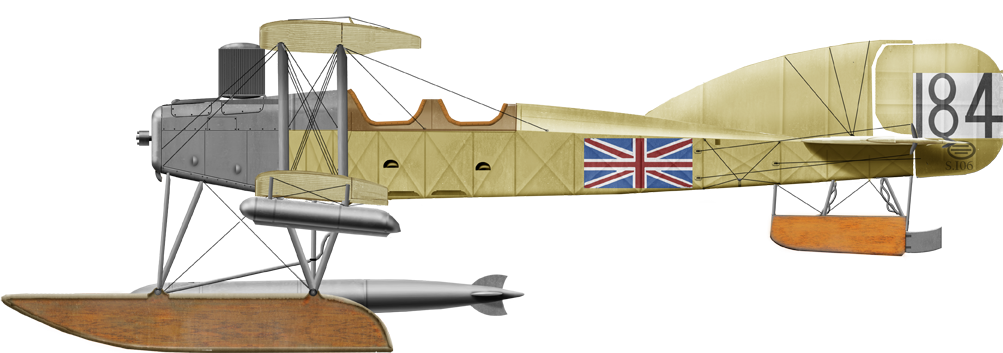
✈ 10/03/2024
 Short 184 (1915)
Short 184 (1915)
The Short Admiralty Type 184, often called the Short 225 after the power rating of the engine first fitted, was a British two-seat reconnaissance, bombing and torpedo carrying folding-wing seaplane designed by Horace Short of Short Brothers. It was first flown in 1915 and remained in service until after the armistice in 1918. A Short 184 was the first aircraft to sink a ship using a torpedo, and another was the only British aircraft to take part in the Battle of Jutland.

✈ 20/02/2024
 Curtiss F11C(BFC-2) Goshawk (1932)
Curtiss F11C(BFC-2) Goshawk (1932)
The Curtiss F11C Goshawk is now a somewhat forgotten USN naval biplane fighter of limited production (28 for the BFC-2). Declined into the C2 with landing undercarriage and a sole prototype with Grumman's retractable undercarriage (C3), it only saw service for a time on USS Saratoga (BFC-2/VB-2B, VF-1B) and Enterprise (VB-6). It had far more success at export as the Hawk I and II for China, Thailand or Colombia and Peru (all seeing action) as well as Chile, Norway, and Turkey.
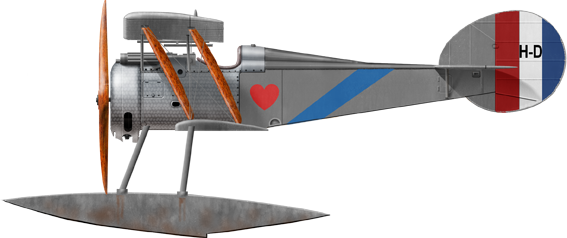
✈ 10/02/2024
 Hanriot HD2 (1917)
Hanriot HD2 (1917)
The Hanriot HD.2 was a biplane floatplane fighter aircraft produced in France during the First World War that was used after the war for testing the use of aircraft from warships. Derived from the excellent late war fighter HD1, it was designed as an interceptor to defend flying boat bases and their reconnaissance assets engaged in ASW duties over the channel, north sea and Atlantic. They were also used postwar to be launched by ships, notably the battleships Paris and USS Mississippi with the USN. Around 30 were built in 5 variants, used until 1925.
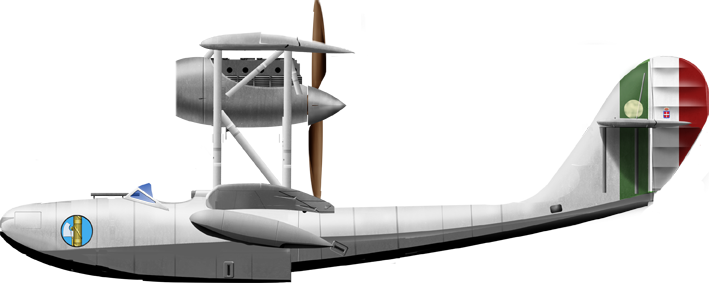
✈ 05/02/2025
 CANT 25 (1927)
CANT 25 (1927)
The CANT 25 was a single-engine biplane seaplane developed by the aeronautical division of the Italian company Cantieri Riuniti dell'Adriatico (CRDA CANT). It made its maiden flight in 1927 but was only accepted in 1938. With 38 built in an amphibious and catapulted versions, it became the Adriatic shipyard's first success. The CANT 25 deroved from the 18ter and stayed in service until 1943 with the Regia Aeronautica.
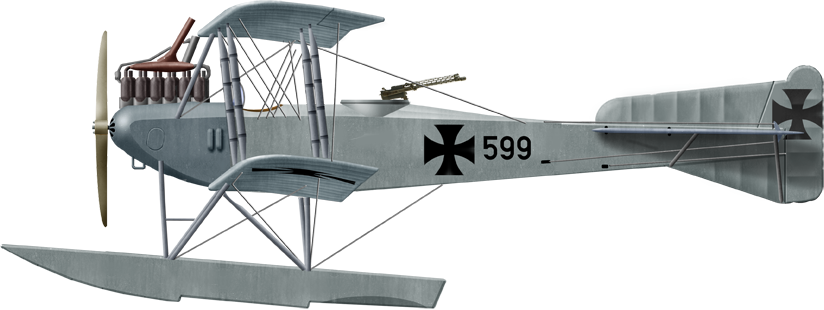
✈ 19/01/2025
 Friedrichshafen FF.33 (1914)
Friedrichshafen FF.33 (1914)
Friedrichshafen FF.33 was a German single-engined reconnaissance three-bay wing structure biplane, using twin floats, designed by Flugzeugbau Friedrichshafen in 1914 for the Marine-Fliegerabteilung aviation forces of the Kaiserliche Marine. This prolific model (315 manufactured) became the prime German observation seaplane in WWI and of Poland, the Netherlands, Finland and Sweden postwar.
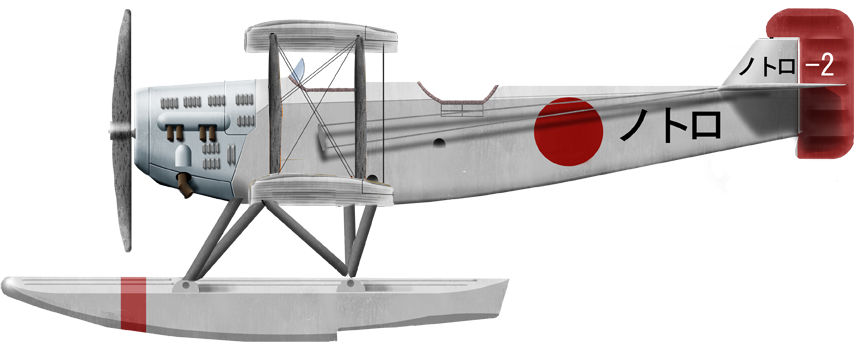
✈ 07/01/2025
 Yokosuka E1Y (1923)
Yokosuka E1Y (1923)
The Yokosuka E1Y was a Japanese observation floatplane of the twenties, one of the first. It was single-engined, designed and developed by the Yokosuka Naval Air Technical Arsenal for the Imperial Japanese Navy. With 320 built as the Type 14 Reconnaissance Seaplane, entering service in 1925 it remained one of the main reconnaissance types until gradually replaced from 1932, but still in service until 1937. It found use from all Cruisers and IJN Battleships of that era and fought in China, notably from IJN Notoro.
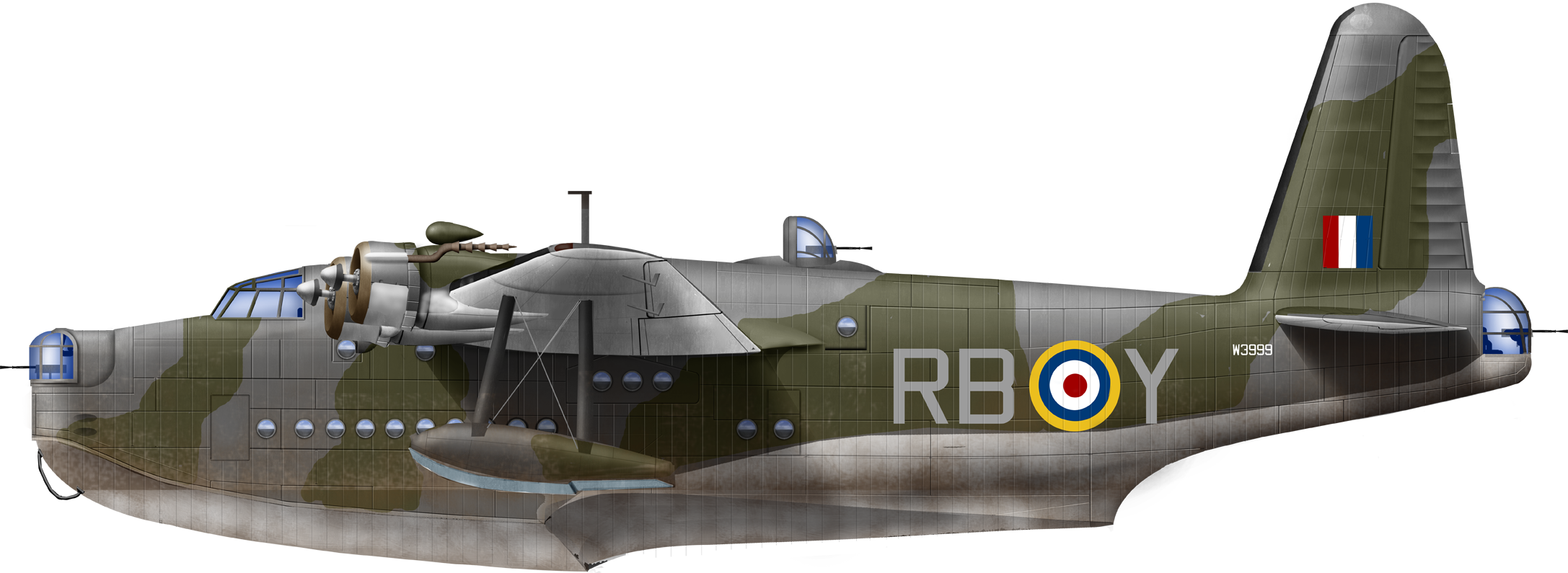
✈ 28/12/2024
 Short Sunderland
Short Sunderland
As far as naval matters goes, the Short Sunderland, was the U-Boat's worst nightmare, equal part than the other allied angel of the Atlantic, the PBY Catalina. This was arguably the most successful British flying boat of WW2, for many reasons. Studied from 1935, built from 1938 to 1942 and used by many navies (777 built), the last were retired in 1967. A very rugged machine, it gained its nickname of Fliegendes Stachelschwein ("Flying Porcupine") allegedly during an engagement by six Ju-88C fighters off Norway in 1940.
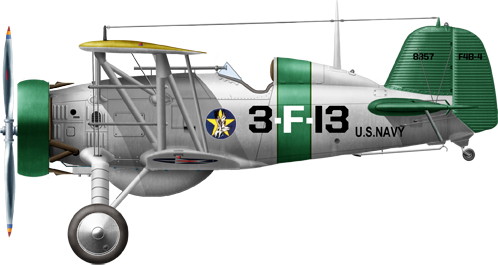
✈ 16/12/2024
 Boeing F4B (1928)
Boeing F4B (1928)
The Boeing F4B was an anticipation by Boeing of the Needs of the US Navy for a successor to the F2B and F3B just introduced in 1928. The Type 99 had impressive performancs and a first batch of 27 F4B1 was soon followed by more, until the much modified F4B-3 and F4B-4b whereas the Army had the Boeing P-12, most widespread U.S. military pursuit biplane fighter of the interwar. The last lingered with training units of the USMC until 1941... They served on the Lexington, Saratoga, Ranger and even Yorktown before being replaced in 1937 by the Grumman F3F.
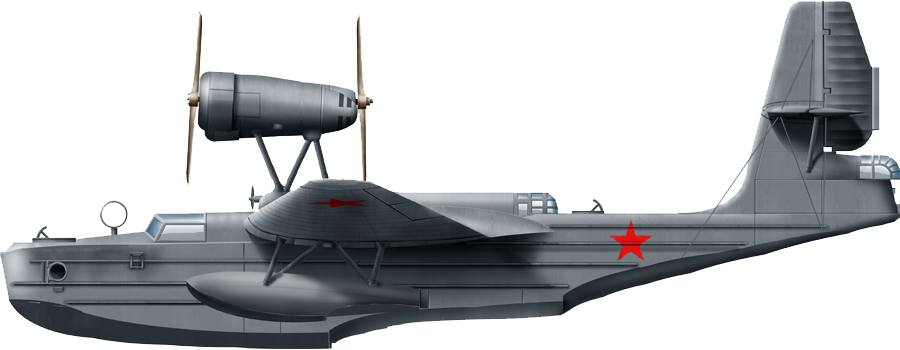
✈ 06/12/2024
 Tupolev-MTB-1 (1940)
Tupolev-MTB-1 (1940)
The Tupolev MTB-1 was initially started as the MDR-4 (internally by Tupolev, ANT-27) in 1933, a project of patrol flying boat answering a specification for the Soviet Naval Aviation. It was a refined version of the failed Chyetverikov MDR-3, not accepted. The revised design retained the latter hull, but Tupolev created a brand new, full-cantilever wing and new tail with a triple engine installation (two pulling, one pushing). Trials by March 1934 had the prototype destroyed at takeoff. A second prototype was tested in 1935 but redesignated MTB-1 to be torpedo-carrier. Poor performance in trials should had it shelved, but it was urgently needed to fill a niche in the Soviet Navy, and so accepted for production before even tests were complete. 15 were produced and despite structural failures, they remained in service until 1942.
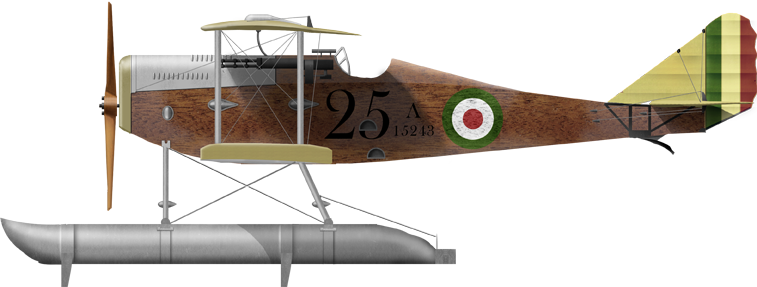
✈ 26/11/2024
 Ansaldo Idro S.V.A. (1918)
Ansaldo Idro S.V.A. (1918)
A single-seat float fighter version of the S.V.A., the I.S.V.A. (the "I” prefix indicating Idro or water) was built at La Spezia in 1918. Power was provided by a 205 hp SPA 6A engine and armament consisted of two synchronised 7,7-mm Vickers machine guns. A total of 50 I.S.V.A. fighters was manufactured and these aircraft were used both for the defence of naval bases and coastal reconnaissance.

✈ 18/11/2024
 Dornier D J "Wal" (1922)
Dornier D J "Wal" (1922)
The Dornier Do J. "Wal" was probably the most famous flying boat of the German company by Claude Dornier, also father of the 1929 mighty Do.X and its 12 engines. The Do J. "wal" (whale) was an impressive all-metal model that was pioneered back in 1923 when introduced as an all-metal parasol twin engine (in push pull configuration) general purpose flying boat. Albeit only around 250 were built, already considerable for interwar standards it was declined into 30 versions and exported to 16 countries, such as Japan, the USSR, Spain or Italy among others, some as civilian carriers on regular lines, others for various navies and some kept in operation as late as 1950. In Germany it was known in its Luftwaffe variant the Dornier Do 16, the first of a long and successful lineage of flying boats, kept in operation as late as 1940 as well as those of the KNIL, until 1942. A truly legendary model.
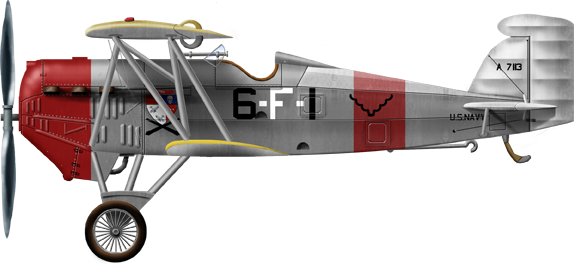
✈ 07/11/2024
 Boeing FB-5 (1926)
Boeing FB-5 (1926)
The Boeing FB-5 was a naval biplane fighter developed in the mid-1920s, derived from Boeing's earlier PW-9 design. It was one of the first true carrier-based fighters used by the U.S. Navy and Marine Corps. The FB-5, introduced in 1927, was powered by a 520-horsepower Packard 2A-1500 V-12 engine, allowing it to reach a top speed of around 175 mph and a service ceiling of 22,000 feet. It featured several design improvements over its predecessors, including an altered wing configuration for better visibility and balanced rudder to enhance control. These aircraft were primarily used for carrier operations, initially serving aboard the USS Langley and Saratoga, and were equipped with two forward-firing machine guns.
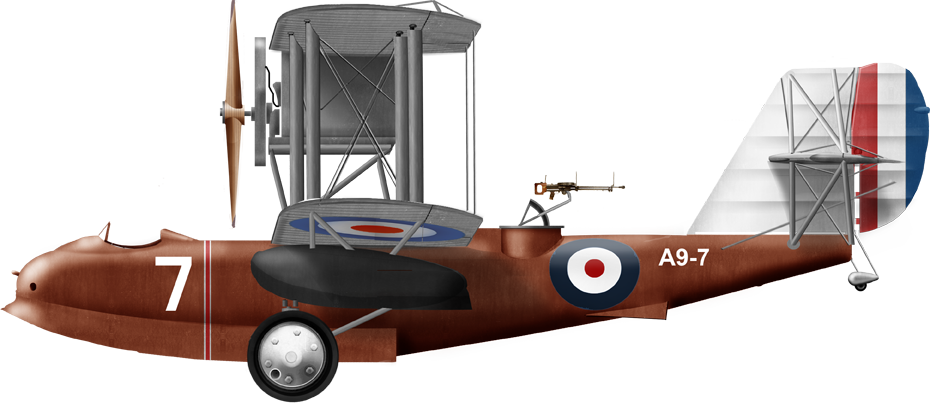
✈ 27/10/2024
 Supermarine Seagull (1921)
Supermarine Seagull (1921)
The Supermarine Seagull was a flying boat produced developed by Supermarine's chief designer R.J. Mitchell, from the experimental Supermarine Seal II in 1920. In June 1921 the Seagull was evaluated but rejected, so it was further developed as a private venture. In February 1922 this time it impressed the air ministry which placed an initial order for two aircraft for evaluation. Later production is believed to have assisted Supermarine to survive in its recession and gave Britain the superb spitfire. The Seagull was used by the British Fleet Air Arm mostly for gunnery spotting, from land bases or fore tenders, and for reconnaissance. It was operated by the Royal Australian Air Force from its only seplane carrie HMAS Albatross. When the latter asked for a catapult-capable model the company developed the Seagull IV which ultimately became the Walrus and remaining Seagulls ended in the civilian market.
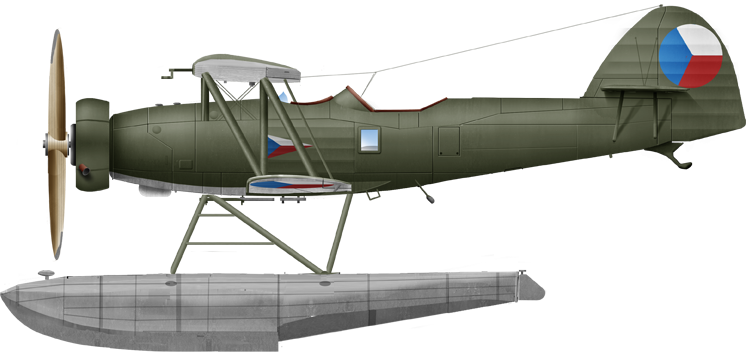
✈ 18/10/2024
 Letov Š-328V (1932)
Letov Š-328V (1932)
The Letov Š-328 was a Czechoslovak biplane developed in the 1930s, primarily used for reconnaissance and light bombing missions. Introduced in 1935, it served various roles, including reconnaissance, bombing, and anti-partisan operations during World War II. Despite its somewhat outdated design by the time of the war, it remained in service due to its versatility. The aircraft featured a single-engine, twin-seat configuration and could be equipped with floats for maritime operations. The Š-328v was a floatplane variant used by the Czechoslovak Air Detachment, with its floats being replaceable with standard undercarriage during winter months. The Letov Š-328 had several versions, some of which were used as night fighters, while others served as target tugs
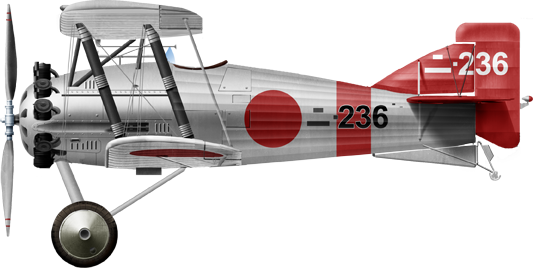
07/10/2024
✈ Nakajima A1N (1929)
The Nakajima A1N was a Japanese carrier-based fighter developed from 1927, essentially a licensed version of the British Gloster Gambet, close to the Gamecock. This single-seat biplane constructed mostly of wood, was armed with two 7.7mm machine guns and was equipped with naval features like a tailhook for carrier landings and flotation devices for emergency water landings. When accepted in 1929 it came in two main variants: the A1N1 and A1N2 powered by the Nakajima(Bristol) Jupiter VI or the Kotobuki. 150 were manufactured until 1932 for the Imperial Japanese Navy, seeing action in the 1932 Shanghai Incident, recording a first aerial victory. It was replaced by the A2N from 1934-35.
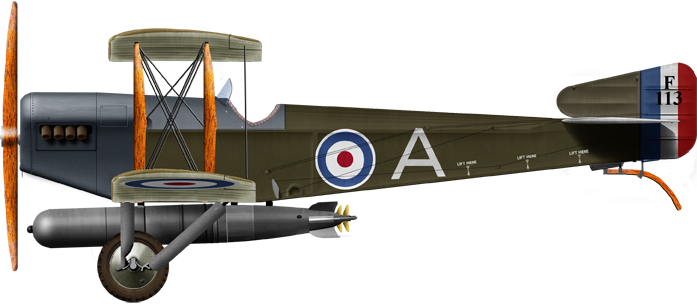
28/09/2024
✈ Sopwith Cuckoo (1917)
The Sopwith T.1 Cuckoo was a British torpedo carrier created by Sopwith, produced by Blakcburn, and operated by Royal Naval Air Service (RNAS), and later the RAF. The T.1 was the first landplane specifically designed for carrier operations and carrying a torpedo, but completed too late for service in the First World War. The T.1 was resptropsctively called Mark I, as a Mark II was produced postwar and both were named the "Cuckoo", possibly because like the bird, it was officially a Sopwith design conceived and produced by Blackburn. Althiygh this model "did the job" it could never had the chance to perform the carrier attacks planned for late 1918 on Wilhelsmhaven. It still was the first and last such type ever designed by Sopwith and quickstarted the career of Blackburn as main provider of torpedo bombers for the Royal Navy's carriers, the last being the Shark, still in service in WW2 as an alternative to the Swordfish.

17/09/2024
✈ CANT 18 (1926)
The CANT 18 was a flying boat trainer developed in Italy in the 1920s to prepare pilots for flying boat airliners. A development of the CANT 7, it incorporated various aerodynamic and hydrodynamic refinements. While remaining broadly similar in configuration, the new design replaced the CANT 7's conventional struts with Warren truss bracing for the wings. Most of the aircraft produced were used by S.I.S.A.
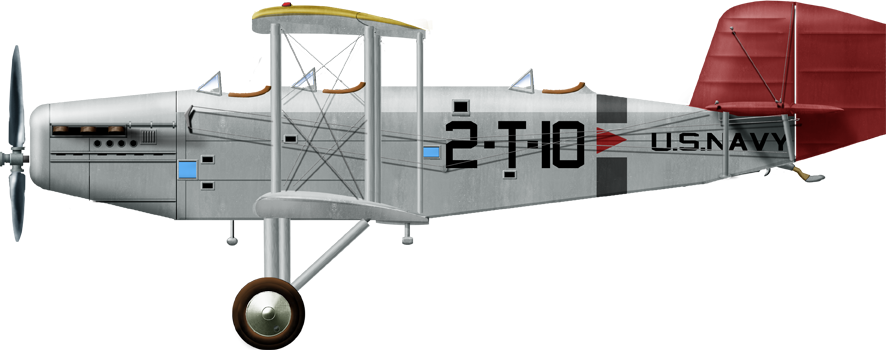
08/09/2024
✈ Martin T3M (1926)
The Martin T3M is a 1926 carrier-borne torpedo bomber, introduced a year before the Lexington class were operational and also equipped with floats. It was flown in February 1926 and accepted for production and service later that year. Service time averaged 4-5 years, as the T3M was replaced in 1927 by the T4M, and itself by the TBD devastator from Douglas in 1937. Martin returned to army bombers ans its T4M was manufactured by Great Lakes. This bulky, slow biplane derived from the T3M was not liked by mechanics, nor pilots that called it "the cow". This pushed the Navy to swap for the radial engine that became the T4M. In grand total, 124 T3M (24 M-1, 100 M-2), 102 T4M and 40 Great Lakes TG-1/2 equipped the US Navy until 1937.
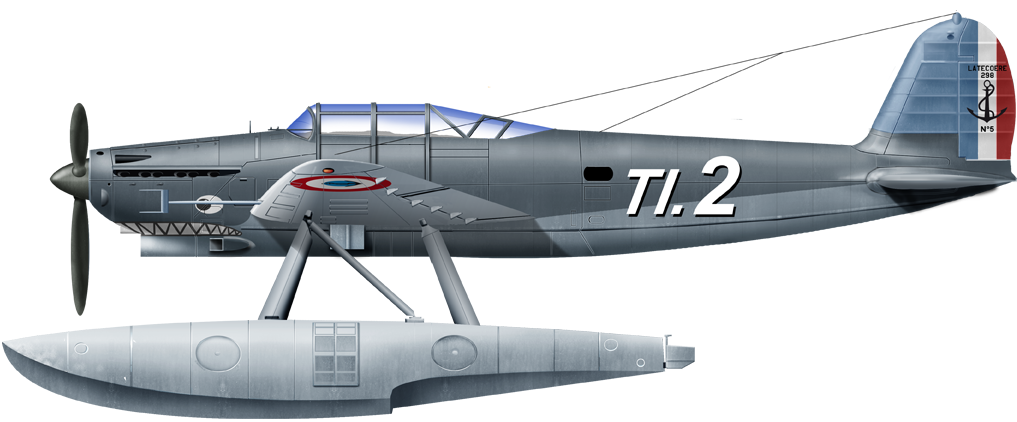
29/08/2024
✈ Latécoere 298 (1937)
The Latécoère 298 was a single engine, low cantilever monoplane floatplane capable of many missions, as reconnaissance and torpedo carrier with a crew of three. It was perhaps the best French seaplane in WW2. Studies started from a specification to replace the medciocre Latécoère 290, a reconditioned civilian Aeropostale (the ancestor of Air France) model, which was ill-suited as a torpedo carrier. The Laté 298 prototype was its first flight in 1936 and was approved for production, which went on from 1938 to 1942, with 129 delivered total. They ended in eight squadrons and took part in the battle of France in May-June 1940, with heavy losses. Some survived until 1951 as trainers.

16/08/2024
✈ Chyetverikov MDR-6 (1937)
The Chyetverikov MDR-6 was a 1930s Soviet Union reconnaissance flying-boat aircraft, and the only successful aircraft designed by the design bureau led by Igor Chyetverikov. It first flew in July 1937, as a two-engined high-wing monoplane, built in all-metal stressed skin construction. The prototype had two M-25 radial engines replaced in production (20 ordered) by M-63 engines from 1940 to 1941. They were withdrawn from service in 1942, plagued by structural problems. Despirte of this Chyetverikov tried to correct these issues and made several advanced prototypes until 1945, but none were greenlighted for production.
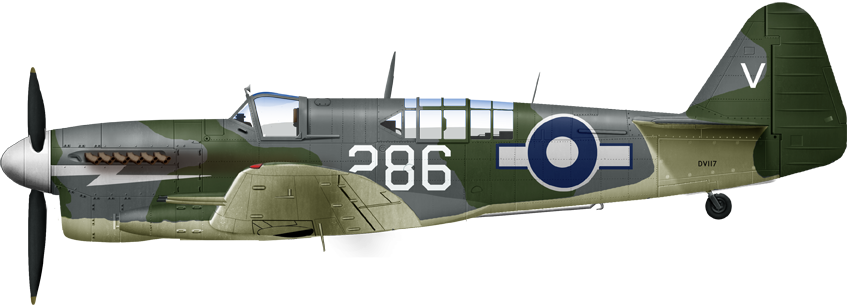
06/08/2024
✈ Fairey Firefly (1943)
The last generation of WW2 British aircraft carrier multirole aircraft was the quite successful Firefly. It was essentially a replacement for the Fairey Fulmar of 1940, with a much more powerful engine, a more rugged structure, and carrying twice as much payload while having blstering performances cloe to a regular fighter while capable of long range escorts unlike the short-legged, fragile seafire, or reconnaissance and strikes. Introduced in 1943, it was declined in two main versions and constantly improved until production stopped in 1955 with 1702 made. That's a measure of its quality and it served until 1956 for the RN, but soldiered on for many more years in other aviations, being exported to Australia, Canada, Denmark, Ethiopia, the Netherlands, India, Sweden, Thailand and also tested by the USN. A Legend.

27/07/2024
✈ Kawanishi H6K "Mavis" (1938)
The H6K was an Imperial Japanese Navy flying boat manufactured by the Kawanishi Aircraft Company in 1936, produced from 1938 to 1941. It was used during World War II for maritime patrol duties with the Allied reporting name "Mavis" and a Navy designation "Type 97 Large Flying Boat". Its genesis went back to 1934 and it was to be a very long range and versatile model designed for reconnaissance, regular and VIP transport, bombing, naval warfare, with the national airline also using its commercial airliner variant.

13/07/2024
✈ Blohm & Voss 138 Seedrache (1940)
The Blohm & Voss BV 138 Seedrache (Sea Dragon) was a trimotor flying boat by a famous shipyard, which became in WW2 the primary seaborne long-range maritime patrol and naval reconnaissance aircraft of the Luftwaffe during. Designed prewar by Richard Vogt, under Hamburger Flugzeugbau and known as the Ha 138 it had quite unusual design features for the type: Twin boom tail unit, short hull, trimotor engine configuration. Due to its hull-fuselage it was nicknamed "Der Fliegende Holzschuh" ("Flying Clog") and development was protracted due to multiple redesigns and engine issues. 297 BV 138s were built between 1938 and 1943. It was found surprisingly resilient, notably off Norway, where early Sea Hurricanes were unable to shot it down.
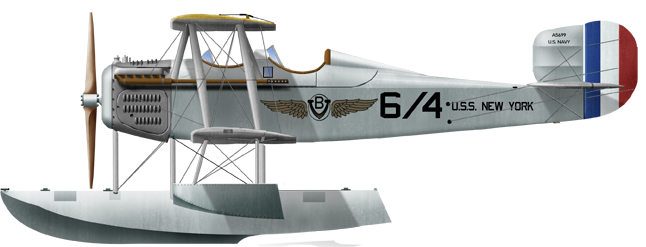
27/06/2024
✈ Vought VE-7 (1917)
The Vought VE-7 "Bluebird" was an early biplane of the United States. First flying in 1917, it was designed as a two-seat trainer for the United States Army, then adopted by the United States Navy in 1920. In 1922, a VE-7 became the first airplane to take off from an American aircraft carrier, USS Langley. It was a brillant design by all accounts, praised by all (notably Billy Mitchell), far superior to the Curtiss Jenny it replaced, but cut short by the end of the war. It was also the first USN catapulted spotter (from battleships in the 1920s), and distant ancestor of the Corsair family.
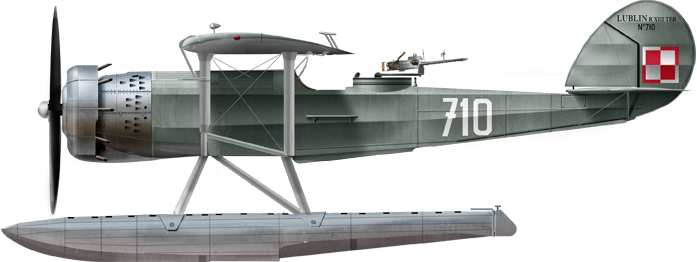
20/06/2024
✈ Lublin R.XIII Hydro (1932)
The Lublin-RXIII hydro (1931). The Lublin-RXIII was a popular multirole Polish parasol cooperation monoplane used for observation and liaison. It was designed in 1930, first flew in 1931, ordered and built at the Plage i Laśkiewicz factory in Lublin. 273 were available during the Invasion of Poland and many were also made in the variant Lublin R-XIV military trainer. The one we are interested about was the Polish marine version, used for naval observation from shore bases: The R.XIII Hydro produced from 1931 to 1936 with 20 made in all in three variants.
11/06/2024

✈ Fairey Barracuda (1942)
The Fairey Barracuda was a British torpedo and dive bomber used during World War II. It was designed and built by the Fairey Aviation Company and served primarily with the Royal Navy's Fleet Air Arm. The Barracuda entered service in 1943 and saw action in various theaters of the war, including the Atlantic and Pacific. It was intended to replace the older Fairey Swordfish biplane, offering improved performance and capabilities. The Barracuda was notable for its distinctive appearance, featuring a large, bulbous fuselage and a high-mounted wing...
29/05/2024
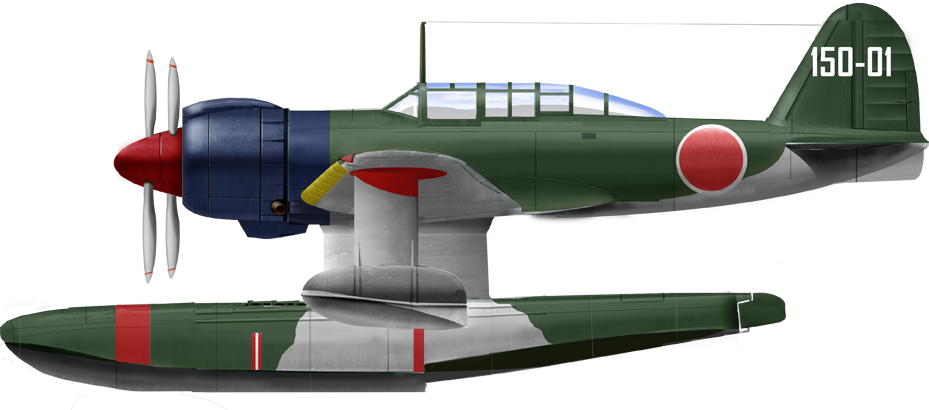
✈ Kawanishi E15K Shiun "Norm" (1941)
In 1939, the Imperial Japanese Navy commissioned Kawanishi to develop a 2-seat high-speed reconnaissance seaplane capable of leaving behind land-based fighter of the time. It needed notably to equip the new sub flagship cruisers of the Ōyodo class, also ordered in 1939. Kawanishhi presented in 1940 a very impressive model sporting contrarotative blades propeller, jettisonable main float and retractable underwings support floats. Six preserie were made, but trials dragged on until late 1942 as problems accumulated. Eventualy eight production were made in 1944 until it was cancelled. They flew from Rabaul during the war, but could be shot down with ease by the Hellcats and Corsairs, as the P-38.
13/05/2024
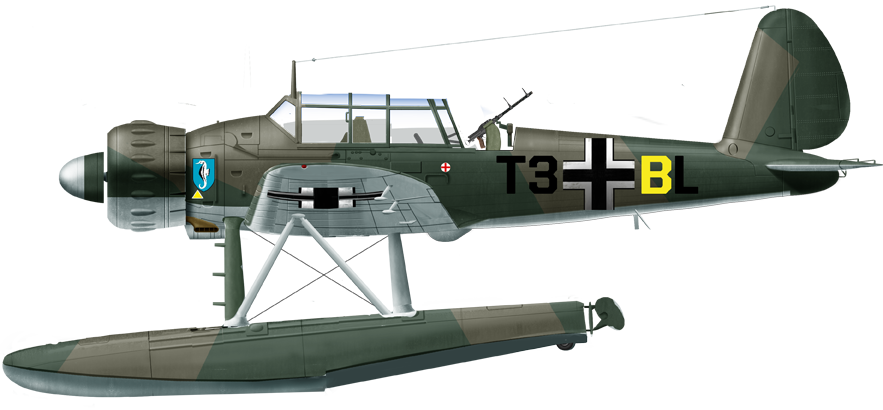
✈ Arado 196 (1940)
The Arado Ar 196 was a German single-engine reconnaissance seaplane used during World War II. It was designed by Walter Blume and produced by the Arado Flugzeugwerke. This floatplane was primarily used by the Kriegsmarine for maritime reconnaissance and observation missions and became the standard shipborne reconnaissance aircraft, catapult-launched. It had a modern monoplane configuration with a metal framework, two seats under a generous glasshouse cockpit. Lightly armed, its two floats and general configuration recalled the Japanese Aichi E13 "Jake".
24/04/2024
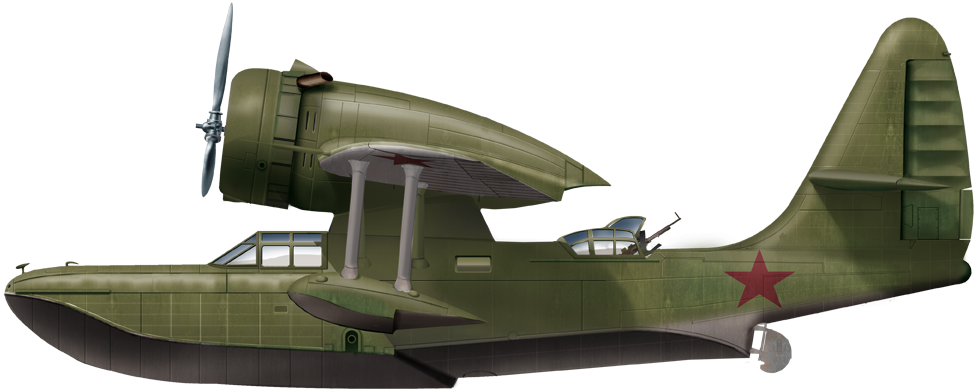
✈ Beriev BE-4 (1940)
The BE-4 was a new ship-based Soviet reconnaissance seaplane, design to replace the BE-2 (KOR-1) biplane. Only 47 were manufactured however and it had a short service life. On May 30 1912, Vice-Admiral of the Imperial Russian Navy Alexander Karl Nikolai von Lieven in his report No. 127 proposed the creation of aviation detachments operating in close coordination with the three fleets (Baltic, Black sea and Pacific)...
16/04/2024

✈ WW2 Soviet Naval Aviation (1919-1945)
A full review of all models of the Soviet Naval Air Forces from the start of the civil war to the Interwar and through the second world war. Organization, bases, units, doctrine, tactics and listing of mainmodels, from seaplanes to bomber and fighters.
16/02/2024
✈ Nakajima B6N Tenzan “Jill” (1942)

In 1942 at Midway and before that at Cora Sea and in many other operations including Pearl Harbor, the Nakajima B5N (allied code “Kate”), proved to be the successful first line aircraft carrier torpedo bomber of the Imperial Japanese Navy. But its original conception dated back from 1936, under the direction of Katsuji Nakamura. Very modern for its time, it was obsolete in 1941, as its first limitations already appeared in 1938 over China. By December 1939 a Navy specification to Nakajima was issued for the “14-Shi Carrier Attack Aircraft”, capable of carrying the same load as the B5N and same three-man crew, cantilever all-metal construction, but this time with a top speed of 250 knots (460 km/h; 290 mph), cruising speed of 200 knots (370 km/h; 230 mph) and 1,000 nmi (1,900 km; 1,200 mi) range, with the standard 800 kg (1,800 lb) bomb load and 2,072 nmi (3,837 km; 2,384 mi) in taxiing conditions, without armament.
16/01/2024
✈ CANT Z.506 Airone (1937)
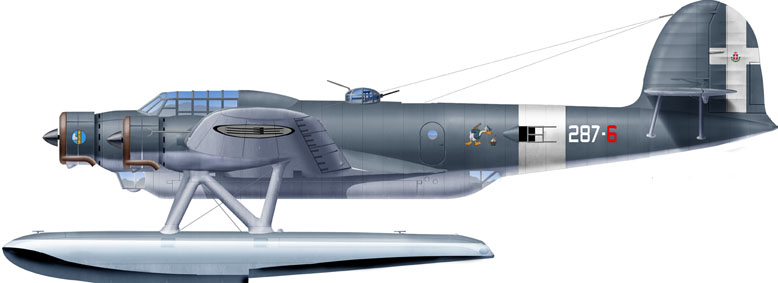
The CANT Z.506 Airone (“Heron”) was a trimotor floatplane designed and manufactured by CANT from 1935. It emerged as a transport and postal aircraft with “Ala Littoria” and established 10 world records in 1936, 10 in 1937, becoming an asset for Mussolini’s propaganda. In WW2 it was used as a reconnaissance aircraft as well as torpedo bomber and air-sea rescue plane or ambulance. It saw action in Spain with volunteers, was tested by Poland, and served for the Italian Regia Aeronautica as well as the Regia Marina and after the Italian surrender in September 1943, with the Aeronautica Cobelligerante del Sud. Many were also used by the Aeronautica Nazionale Repubblicana and the Luftwaffe. The Z506 is probably one of the very best floatplanes ever built by Italy and often compared to the equally good and-based SM79 Sparviero. It had an old-school wooden structure, yet very sturdy for handling rough seas, was fast, had a good range was was overall reliable. The SAR used the Z506B until 1959. #ww2 #navalaviation #italiannavy #regiamarina #aviazioneausilariaperlaregiamarina #z506airone #floatplane #trimotor
26/12/2023
✈ Supermarine Seafire (1942)
To complete an overview of the early Fleet Air Arm for this year, here is a final post on the Seafire, the navalized variant of the legendary Supermarine Spitfire. It arrived by late 1942 in the Fleet Air Arm, and evolved through multiple variants, Mk.I, II, III, 15, 17, 45, 46 and 47, from earlier iterations of the Rolls Royce Merlin to the Griffon, from three bladed props to, four, five and double contra-rotative ones. It fought from the Atlantic to the Mediterranean, in the far east with the British Pacific Fleet, later version seeing action over burma and in Korea, replaced either by the Sea Fury or new jets. The Seafire was also adopted by France, Canada, and flew long after WW2 with Irish and Burmese air forces. It was not without issues, not having folding wings at the start, weak undercarriage, limited range, and some torque and stability issues… But it was the best interceptor the RN ever had at this point, and was head and shoulders above the Sea Hurricane. It’s ultimate evolution, the Seafang (1945) was too late to the party, only 16 were tested. Jets became all the rage in the fleet air arm. This is the full development story, evolution of all versions until 1947 and combat operations, plus 30 profiles. #fleetairarm #royalnavy #britishaicraftcarriers #supermarine #seafire #britishpacificfleet #korea
26/11/2023
✈ A6M2-N “Rufe” (1941)
The A6M2-N floatplane was developed as requested by the Navy to support amphibious operations (operated by one of the many IJN seaplane tenders), or defend remote bases. Based on the A6M-2 Model 11 technically, it had a modified tail to keep stability with a much higher drag, cauised by the added floats: One large under the fuselage to keep balace and two small underwing. 327 total were built, and it was deployed in 1942 as the “Suisen 2” (“Hydro fighter type 2”). Its first actions were mostly defensive, in the Aleutians and Solomon Islands. They were found surprisingly good at harassing PT boats at night, causing the latter to increase AA and adopt projectors. They were also found useful to drop flares on them, allowing destroyers to fire on them. A6M2-N also were used to protect fueling depots in Balikpapan and Avon Bases in the Dutch East Indies, sparing land fighters or the Shumushu base in the North Kuriles, relatively “quiet” sectors. They were operated notably in several operations from IJN Kamikawa Maru in the Solomons and Kuriles and the Hokoku Maru and Aikoku Maru during the Indian Ocean raids. The Aeutians saw the first kills, RCAF Curtiss P-40 Warhawk, Lockheed P-38 Lightning and B-17 Flying Fortress. They were found versatile enough to be used for patrols, as fighter-bomber and short reconnaissance support during amphibious landings, spotting targets of opportunity for escorting vessel’s artillery.
10/11/2023
✈ Curtiss SC-1 Seahawk (1944)
The Curtiss Seahawk was the last onboard reconnaissance/spotting floatplane in service with the US Navy. It was designed to replace the Curtiss SO3C Seamew and Vought OS2U Kingfisher but design development and adoption meant it only arrived in mid-1945, operated by Battleships mostly, still useful for arrtillery spotting at the age of radar. For this reason it spent a short peacetime career until 1947-48, replaced by helicopters.
28/10/2023
✈ CANT Z501 Gabbiano (1934)
The CANT Z.501 Gabbiano (“Gull”) was a high-wing central-hull flying boat with a single pusher engine whch first flew in 1934 (setting a world distance record) and was produced to 454 until 1943. It served with the Aviazione Ausiliaria per la Regia Marina, a branch of the Regia Aeronautica in WW2 as main reconnaissance model. Obsolete by 1940, it was gradually replaced by the CANT Z506 Airone. It was still used however until 1945, taking many losses, the last being retired in 1950. It was also used by Spain and Romania.
06/10/2023
✈ Loire 130M (1940)
Loire 130) is a French seaplane – a flying boat during the Second World War, the main purpose of which was as an ejection reconnaissance aircraft. It was a single-engine all-metal monoplane with a pusher propeller. It had a single fin with two washers. It was developed at the design bureau of the company Chantiers de la Loire. It was in service with most ships of the French fleet and coastal bases, being the most common type of seaplane.
23/09/2023
✈ Fairey Albacore (1940)
The Fairey Albacore (“Applecore”) is a single-engine biplane torpedo bomber operated by the Royal Navy Fleet Air Arm (FAA) in WW2, planned replacement of the legendary Swordfish of the same manufacturer. It had the same role or recce/spotting/torpedo/dive bombing with a crew of three, better engine and enclosed cokcpit. It fist flew on 12 December 1938, and was produced betwene 1939 and 1943, entering FAA service with the 826 Naval Air Sqn by March 1940. It flew from land bases over the English Channel and later from aircraft carrier in the Med and Atlantic from November 1940, then with 15 first-line FAA squadrons. The Albacore soldiered in the Battle of Cape Matapan, Second Battle of El Alamein, landings at Sicily, Salerno, until replaced by the Fairey Barracuda and Grumman Avenger. #ww2 #fairey #faireyalbacore #fleetairarm #royalnavy
02/09/2023
✈ Mitsubish G3M “Nell” (1935)
The main twin engine torpedo bomber of the Imperial Japanese Navy in 1941 was the Mitsubishi G3M. It was soon codenamed by the allies “Nell”. After an already well-filled career in China, it was made famous notably by sinking Force Z’s Repulse and Prince of Wales, the attack on Darwin in February 1942, its rampage in the Dutch East Indies and sinking the heavy cruiser USS Chicago among others. Despite being obsolete, the G3M soldiered on in the 1944 Battle of the Philippines, but at that stage most were used as glider tugs, trainers, VIP transports or else...
23/08/2023
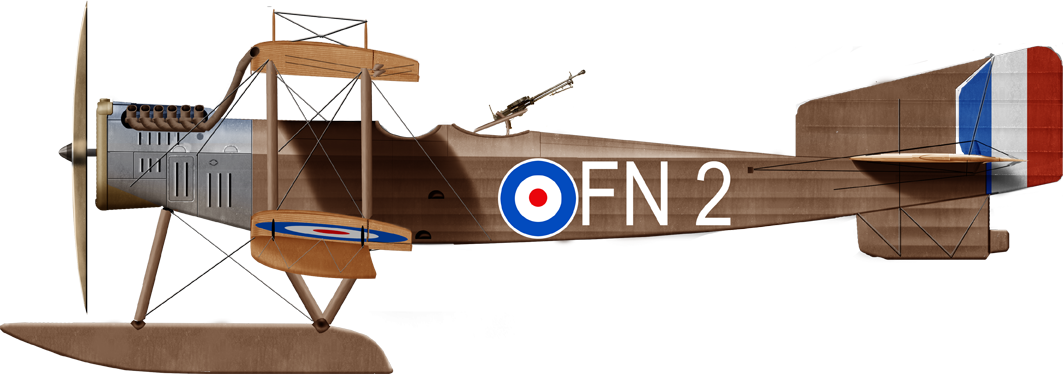
✈ Fairey Campania (1917)
The Fairey Campania was a ship-borne, patrol and reconnaissance aircraft, single-engine, two-seat with two main floats, backward-folding wings, the first aeroplane ever designed specifically for carrier operations. Naturally after seeing HMS Campania, here is the RNAS bird named after her: The Fairey Campania. First successful model of the company, it was ordered by the admiralty for the RNAS at the time, specially to serve on the aircraft carrier, but she appeared late in the war, as a reconnaissance and bomber aircraft. Only 62 were built and they were retired in 1919. #rnas #royalnavy #fairey #faireycampania #ww1 #greatwar #navalaviation
05/08/2023

✈ Tupolev MR-6 (1932)
The Tupolev MR-6 is a forgotten interwar soviet model that was a floatplane version of the multirole "escort/fighter/reconnaissance/light bomber" called the R6. Tupolev's "little brother" to the TB-1, internally called ANT-7 had the same Junkers-inspired corrugated aliminium construction and two inline engines M17. However if it was modern from 1932, it was too anemic to do anything else than reconnaissance and 150 became floatplanes for the Navy, "M" for "Mor" (sea) and "R" for "razvedchik", reconnaissance. Production ended in 1936 and the model was still active in the far east in 1941, albeit mostly replaced by the Beriev MBR-2 since 1937 in the Baltic and Black sea. #interwar #ww2 #floatplane #tupolev #navalaviation #sovietskiyflot
22/07/2023
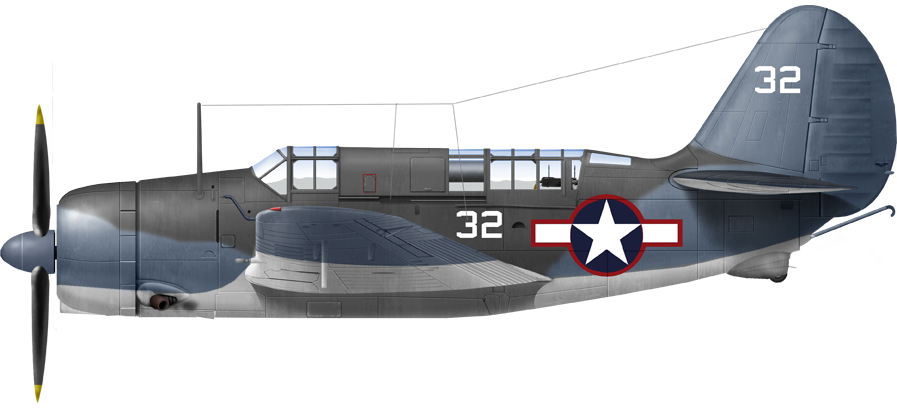
✈ Curtiss SB2C Helldiver (1942)
A bit like Brewster products, the Buffalo and Buccaneer, the 1942 Helldiver suffered from a poor reputation. The Curtiss A-25 Shrike dive bomber was developed as a carrier-based bomber, intended for supplementing, and replacing the Douglas SBD Dauntless on the Pacific theater. However it was initially plagued by poor handling characteristics during a lenghtly development and entered service in short numbers from mid-1942 to late 1943. Heavily criticzed by pilots which came with all sorts of nicknames, the model was considered a debacle investigated by the Truman Committee postwar. This led to a scathing report, contributing to the disaffection of Curtiss as a company for the USN, after the failure of the SO3C Seamew.
10/07/2023

✈ Yokosuka D4Y Suisei “Judy” (1940)
The Yokosuka D4Y Suisei "Judy" had an interesting story. It was designed almost at the same time as the D3A "Val" dive bomber, at first based on the Heinkel 118, then with the DB601 German inline engine, which proved troublesome to produce, and delayed its entry into service. The Suisei ("comet") was a completely new animal, much faster, agile, and declined in both reconnaissance version (before being replaced by the C6N in 1944) and dive bomber. With the D4Y3 however it swapped for a radial Mitsubishi Kinsei engine, easier to maintain, while improving performances. It took part in the great battles of the Pacific from Midway (with two prototypes) to Okinawa, partly as Kamikaze and proved one of the most successful and deadly IJN warbirds with a tally rivalling the D3A's. #ww2 #IJN #imperialjapanesenavy #japanesenavy #yokosuka #divebomber
24/06/2023

✈ Beriev MBR-2 (1935)
The MBR-2 (Medium Reconnaissance Seaplane, Type II) is a Soviet flying boat developed at the Central Design Bureau of MS under the leadership of G. M. Beriev, the most plentiful of all types during WW2. It Actively used as a patrol, transport, reconnaissance, and rescue seaplane, but also as bomber and antisubmarine patroller. It was nicknameed "barn" or "cow" given its construction, being a modern looking but all-wooden design, quite performing for its time (1932), but far less in 1941. This really was the model that launched the career of Georgian-born G.H. Beriev and put his name in the world's map for seaplanes. #ww2 #sovietnavy #Voyennomorskoyflot #seaplane #beriev
✈ June 2023 Boulton Paul P.105 (1944)
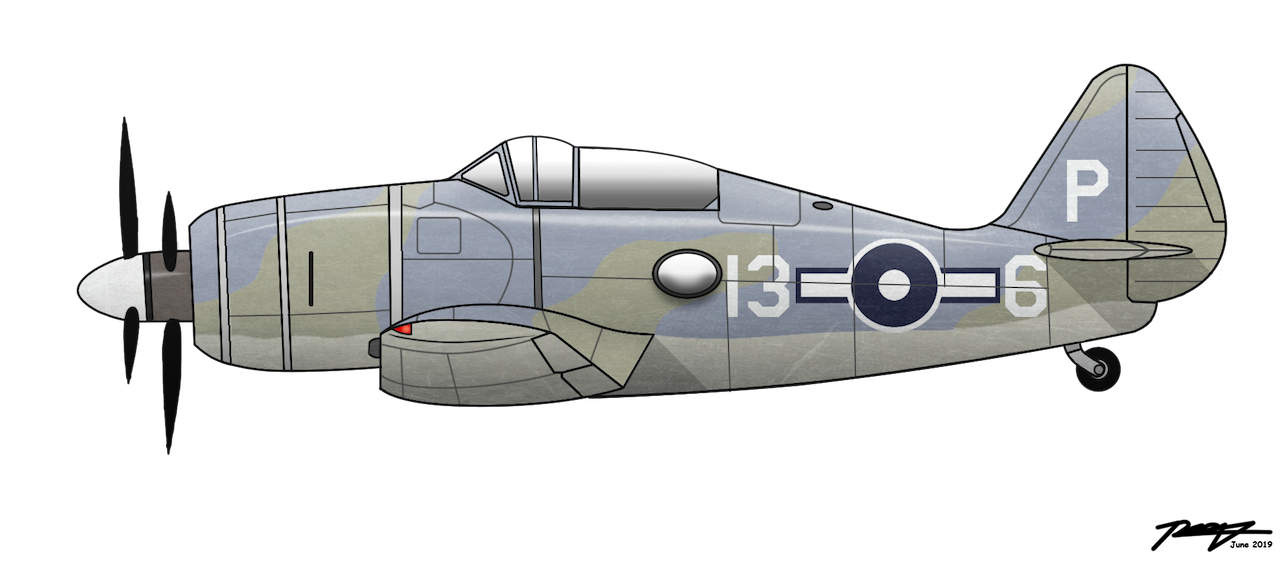
From Plane-Encyclopedia ! - The The Boulton Paul P.105 was a concept for a multi-purpose, single-engine aircraft that was designed to fill a number of carrier based roles. To do so, the P.105 would utilize a unique and innovative method that would use interchangeable fuselage sections and cockpit modules that would allow the aircraft to perform different missions. These modules could be changed quickly to fill a needed role aboard carriers or airbases. The aircraft would not be chosen for production, and The P.105 would be developed further into the P.107, a land-based escort version. The P.107 would have a rear-facing turret and a twin boom tail design to allow greater traverse of the gun. This design wouldn’t be adopted either, and the program would conclude before the war’s end.
✈ 2022 Vought F4U Corsair (1940)
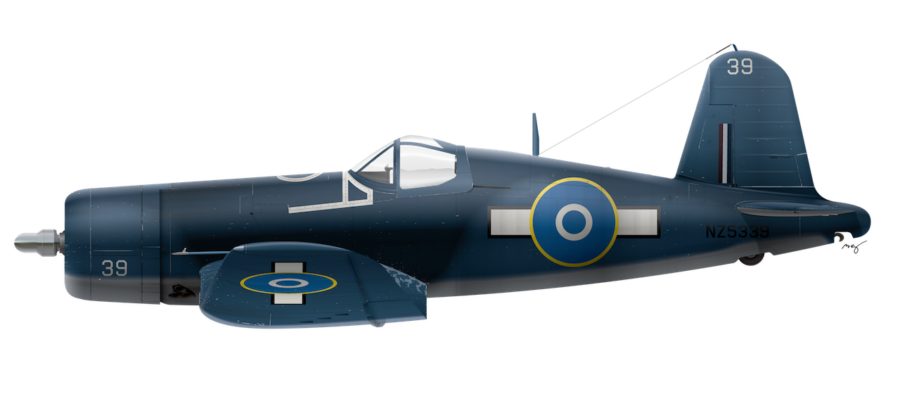
From Plane-Encyclopedia ! - The F4U Corsair is another most famous fighter and fighter-bomber of WWII, although it saw action mostly against the Japanese in the Theatre of the Pacific, therefore being primarily used by the US Navy and the Marines. This airplane in particular was specifically designed for aircraft carriers, being a naval aircraft in essence, although initial doubts over its performance on-board an aircraft carriers made it to serve initially as a land-based asset. It saw also action during the Korea War as a ground attack and Close Air Support (CAS) aircraft, and with the French in the Indochina, Algeria, and Suez Canal crisis. It also saw some service in the Atlantic during WWII, mainly with the British Fleet Air Arm, where reportedly provided air cover to the airplanes attacking the battleship Tirpitz, and served in the Indian and Pacific Oceans. The Corsair contributed to change the balance over the skies of the Pacific by shooting down many Mitsubishi A6M Zeros, although not as much as the Grumman F6F Hellcat.
✈ 2022 Grumman F14 Tomcat (1970)

From Plane-Encyclopedia ! - The F-14 Tomcat is the most iconic Cold War US Naval fighter, next to the McDonnel Douglas F-4 Phantom. It is also a replacement for the F-4 Phantom and the failed F-111B, incorporating the lessons and experiences acquired during Vietnam as well, like the F-15 Eagle. It has a similar origin to that of the F-15, but it is also the result of two additional factors. First, the Navy’s quest to find a Fleet Air Defence asset, with long-range and high-endurance interceptor characteristics to defend the aircraft carrier battle groups, mainly against long-range anti-ship missiles launched from Soviet bombers and submarines, in addition to intercepting those same Soviet bombers. It also needed a more capable radar and provision for longer range missiles.
The role of then Secretary of Defence Robert McNamara was also crucial in this case, as he directed the Navy to take part in the Tactical Fighter Experimental program. But the Navy stepped out in fears that the USAF’s need for a low-attack aircraft would hamper the fighter abilities of the new airplane. Second, the ongoing TFX F-111B project was facing a large number of issues in the late 60s that made both the Navy and Grumman, which happened to be the builder of the F-111B alongside General Dynamics, to consider a new option with better capabilities and less operational and development issues.
The F-111B proved unsuitable for the conditions of the Vietnam War and had no long-range missile capability. The Naval Air Systems Command (NAVAIR) also had a role, as it issued requirements for a tandem two-seat, twin-engine fighter with mainly air-to-air capacities capable of reaching speed of up to 2.2 match and able to operate with a new generation missiles. It was also directed to have a secondary Close Air Support (CAS) role and incorporate an internal M61A1 20mm Vulcan cannon, correcting the mistake made with the previous Phantom F-4, as it had no internal gun for close-range combat.
A feat achieved by the Tomcat was that it had its first flight 23 months after the contract was awarded, making the of the Tomcat a milestone in the development of new air assets. NASA also had an important role during the development stage as it did with the F-15 through the Langley Research Centre, mainly related to the F-14’s most advanced feature: the geometrically variable wings. But it also played a role in the overall design of the fighter, working very closely with Grumman providing the company with technical assistance and data.
✈ 2022 S3 Viking (1972)
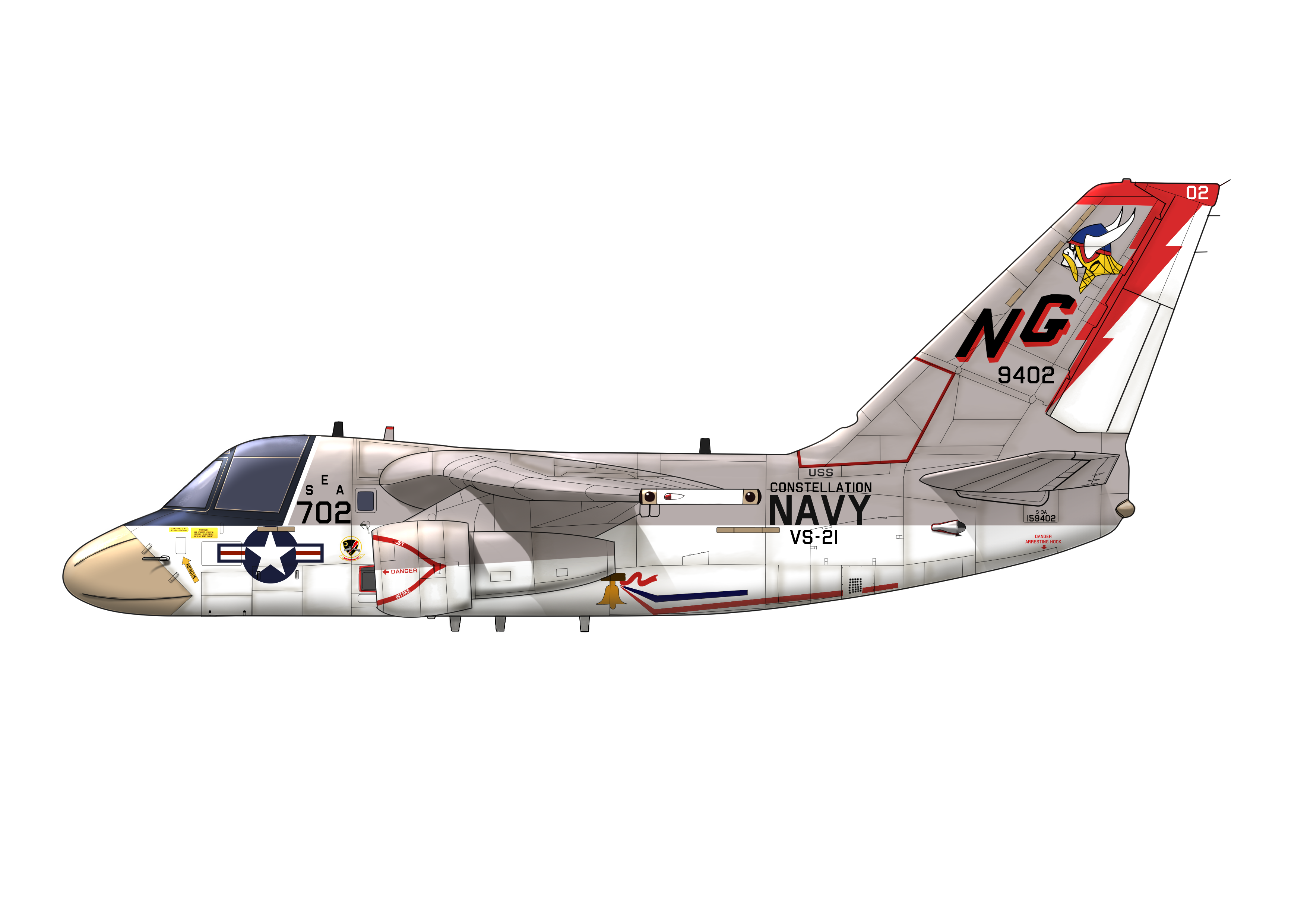
From Plane-Encyclopedia ! - The Lockheed S-3 Viking was an anti-submarine warfare aircraft designed to replace the aging S-2 Tracker, later becoming one of the most important components of the US Navy’s anti-submarine strategy during the late Cold War. Designed in anticipation of modern Soviet Nuclear submarines, the Viking could boast of a host of cutting edge sensors and computerization that put it well above the curve, and all wrapped up in an airframe that was reliable and versatile.
Its exceptional anti-submarine capabilities were augmented even further during its mid-life improvements which lead to the introduction of the improved S-3B. After the Cold War, the aircraft transitioned away from its traditional anti-submarine duties to surface surveillance, signals intelligence, and aerial tanker duties. A thoroughly reliable and advanced aircraft, the Viking easily ranked among the most important and versatile aircraft to ever serve aboard US carriers.
✈ 2023 Grumman F2F (1933)

New Salty Bird ! - The Grumman F2F is the forgotten link between the F3F (which was very similar, but received far more coverage) and the famous Grumman FF or "Fifi" which really put Leroy's company on the map for the USN. It came from a private venture, the iead of converting the FF as a single seat fighter. The Navy adopted it, but only 55 F2F-1 were ever built, replaced in 1937-38 by the new F3F, precedessor of the F4F Wildcat of WW2 fame. It was also lauded as one of the "prettiest naval biplanes" ever built. The last still flew as advanced trainers in 1941. #interwar #ww2 #usn #yorktown #lexington #grumman #navalfighter.
✈ 2023 Loire 210 (1941)
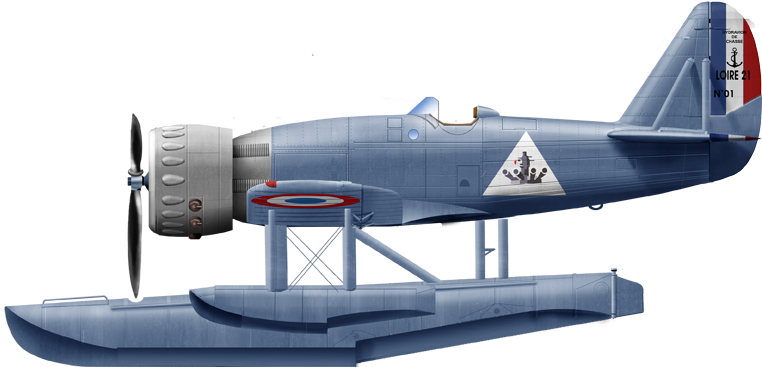
New Salty Bird ! - The Loire 210 was to be the main fighter floatplane of the French Navy in WW2. Based on 1933 specifications, on unrealistic specifications and after a lot of procrastination from the Marine Nationale it was only ordered in 1937, delivered in 1938. Plagued by structural issues, the experiment was terminated in 1939 and the Navy turned to Dewoitine to create a floatplane variant of the rather excellent D520, but far too late... #ww2 #aeronavale #frenchnavy #marinenationale #loire.
✈ 2023 Blackburn ROC (1938)
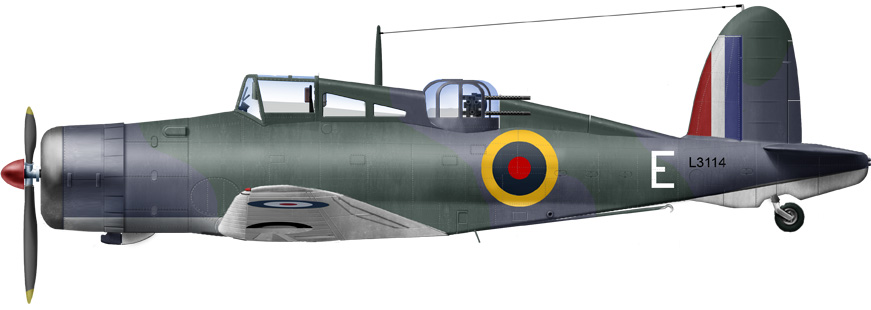
New Salty Bird!
The Blackburn Roc was a fleet air arm fighter that would see a meteoritic use in the Royal Navy, based on 1934 specifications. The Air Ministry indeed (which decided procurement for the Royal Navy) wanted a turret fighter for carrier use, as this concept seems promising at the time. It was based around the turret created by Boulton Paul and the latter competed with Blackburn for the contract, which eventually was won by the latter, proposing a derivative of its just ordered Skua dive bomber... Accepted in 1938, the Roc (a fabled middle east giant bird) could not be produced by Blackburn however due to industrial bottlenecks.
It was given instead to... Boulton Paul to be manufactured. We know how well this concept performed in WW2. The only carrier combat use of the Roc (used as escort for Skuas) was in Norway, 1940. It was quickly retired front frontline operations and the last were still in service in remote areas by 1944. #ww2 #fleetairarm #royalnavy #blackburn #roc.
✈ 2023 Hawker Sea Hurricane (1941)

The Sea Hurricane was developed at first as a Mk.I conversion to serve on CAM ships, catapulted; This was a stopgap measure until enough escort carriers were available. Later, it was modified for carrier service, through four more variants taken from later Marks. In total circa 800 were provided to the FAA, providing the Royal Navy's aircraft and escort carriers a much needed modern dedicated fighter, sharing task with the Grumman Martlet. The Sea Hurricane was gradually retired from fleet carriers, replaced from 1943 by the Supermarine Seafire, but soldiered on until the end of WW2 from some escort carriers.
✈ 18/03/2023 Curtiss SBC "Helldiver" (1936)
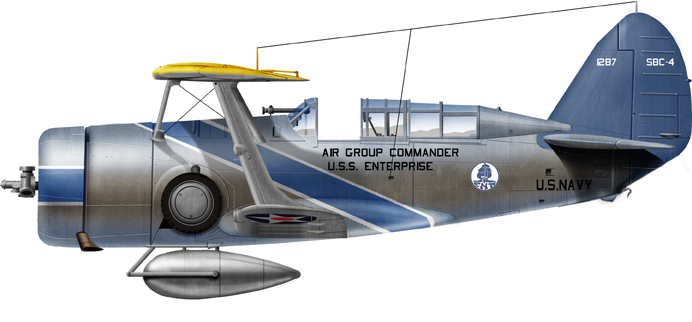 The Curtiss SBC Helldiver, first of the name (the forgotten one). Last biplane dive bomber of the USN, this 1936 model was still operational in 1940 when the Douglas SBD Dauntless started to replace it (before being replaced ultimately with the SB2C of the same name). The SBC Helldiver, unlike its successor, was quite appreciated at a time dive bombing tactics were still a work in progress. They still served with the USMC until 1943, but also with the RAF (as Cleveland Mark.1) and French Armee de l'Air in 1940. With 257 built and 4 versions, the last were training crews still in 1944. #usnavy #curtiss #curtisshelldiver #sbchelldiver #biplane #interwar #usaircraftcarrier #divebomber
The Curtiss SBC Helldiver, first of the name (the forgotten one). Last biplane dive bomber of the USN, this 1936 model was still operational in 1940 when the Douglas SBD Dauntless started to replace it (before being replaced ultimately with the SB2C of the same name). The SBC Helldiver, unlike its successor, was quite appreciated at a time dive bombing tactics were still a work in progress. They still served with the USMC until 1943, but also with the RAF (as Cleveland Mark.1) and French Armee de l'Air in 1940. With 257 built and 4 versions, the last were training crews still in 1944. #usnavy #curtiss #curtisshelldiver #sbchelldiver #biplane #interwar #usaircraftcarrier #divebomber
✈ 2023 Nakajima C6N Saiun "Myrt" (1943)

The Nakajima C6N Saiun was a carrier-based reconnaissance aircraft used by the Imperial Japanese Navy Air Service in World War II. Advanced for its time, it was the fastest carrier-based aircraft put into service by Japan during the war. The Allied reporting name was Myrt. The 彩雲 ("Iridescent Cloud") first flew on 15 May 1943, and was produced and introduced from September 1944 on the few surviving carriers. Allied reporting name "Myrt" (M for reconnaissance models). Only 463 were delivered in six main and two sub-versions on a short production span. It was not a dogfighter but more Mosquito-like in some ways. No fighter of the USN or USAAF could catch the Saiun in WW2. #IJN #imperialjapanesenavy #nakajima #saiun
✈ 18/10/2021 (completed 15 January) Grumman FF (1936)

The Grumman FF, soon nicknamed "Fifi", was the very first model proposed by Grumman to the USN. (Planned Post)
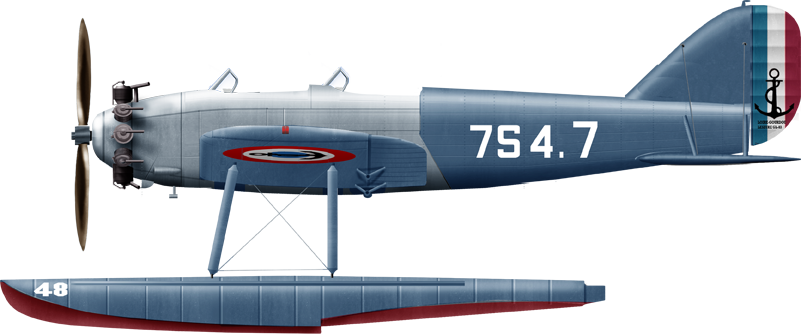
✈ 24 December 2022 Gourdou-Lesseure GL-800 series (1926)
The Gourdou-Lesseure serie of floatplanes secured its place on French cruisers, as main spotter and reconnaissance floatplane of the French Navy in the interwar. The serie comprised L2, L3, GL-810, 811, 812, 813, 830, 831, 832 HY, the last being built in 1936. They saw action for some in WW2 (like at the Battle of Khoh Chang in 1941), and evolved as the serie progressed, but most were replaced by the Loire 130, the "French Walrus". This post tries to shed some light on a little known salty bird. (Scheduled Post)
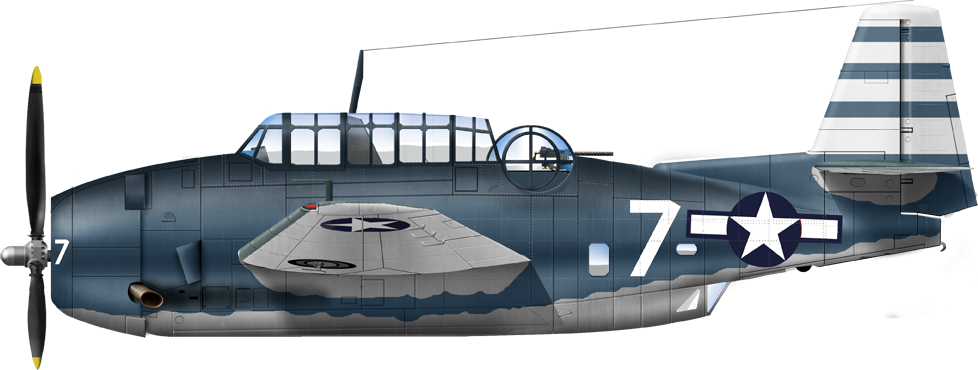
✈ 03 December 2022 Grumman TBF Avenger (1941)
The massive Grumman Avenger was adopted as soon as presented to the USN in order to replace in emergency the now obsolete Douglas Devastator as main carrier-based torpedo bomber. Built at first by Grumman as the TBF and then by General Motors and Ford as the TBM, the Avenger, designed in a few weeks and ordered even before the first flight, impressed everyone by its ruggedness and versatility. Nearly 10,000 were built in about forty variants, some stille flying in numerous navies in 1960. (Scheduled Post)

✈ November, 18, 2022 Kaman SH-2F Seasprite (1974)
The Kaman SH-2 Seasprite was for decades the main ASW and SAR helicopter onboard most ships of the USN. The prototype first flew in 1959, and it was adopted from 1966, the SH-2D/F LAMPS I version being the first deployed from december 1971. Later the 2F was developed (Plane Encyclopedia Post)

✈ 12/11/2022 Fairey Seafox (1936)
The Fairey Seafox was designed and built by Fairey Aviation to be catapulted from light cruisers. It entered service in 1937 and stayed active until 1943 with just 66 produced, in service with 11 naval air squadrons. This biplane was powered as pet an admiralty request by the air-cooled Napier Rapier H engine, and was used both for observation and artillery spotting. Among others it played an important role during the battle of Rio de la Plata between Sturdee’s cruisers and KMS Grav Von Spee and from HMS Emerald, Neptune, Orion, Ajax, Arethusa and Penelope, plus the MACs HMS Pretoria Castle, Asturias and Alcantara.

✈ 30/10/2022 Cold War Naval Aviation (1947-90)
The development of aviation, which had a formidable confirmation in WW2, wen haywire in the cond war era. For 44 years, jets and turprops, missiles and electronics, plus the jet age revolutionize the art of air warfare. This was the end of seaplanes, now solidly complemented by land-based patrol planes, helicopters which took a multitude of roles and replaced former floatplanes present on all cruisers and battleships. Air power could now be not only carried by traditional fleet carriers, but also missile destroyers or even frigates and corvettes, amphibious assault ships and helicopter carriers.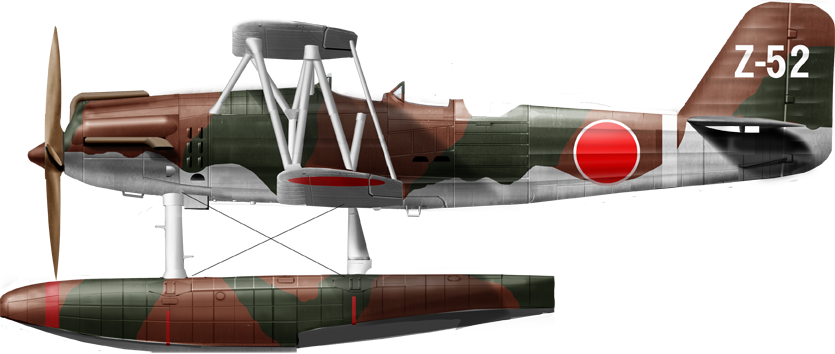
✈ 22/10/2022 Kawanishi E7K "Alf" (1933)
The Kawanishi E7K "Alf" first flew in 1933, and the E7K-1 fitted with an inline-engine was soon replaced by the a reliable Radial. This E7K-2 became the main production model, deployed from 1936 over China, first line until 1943, some ending as kamikaze in 1945. It was often compared to the Nakajima E8N, but the latter was used for artillery spotting on capital ships. In contrast, the E7K was based on cruisers, and became the staple of maritime reconnaissance before countless engagements. It even motivated the conversion of entire cruisers like the Mogami as hybrid seaplane carriers, or construction of the Tone class. https://bit.ly/3fR99LV #IJN #imperialjapanesenavy #ww2 #japanesenavy #kawanishi #floatplane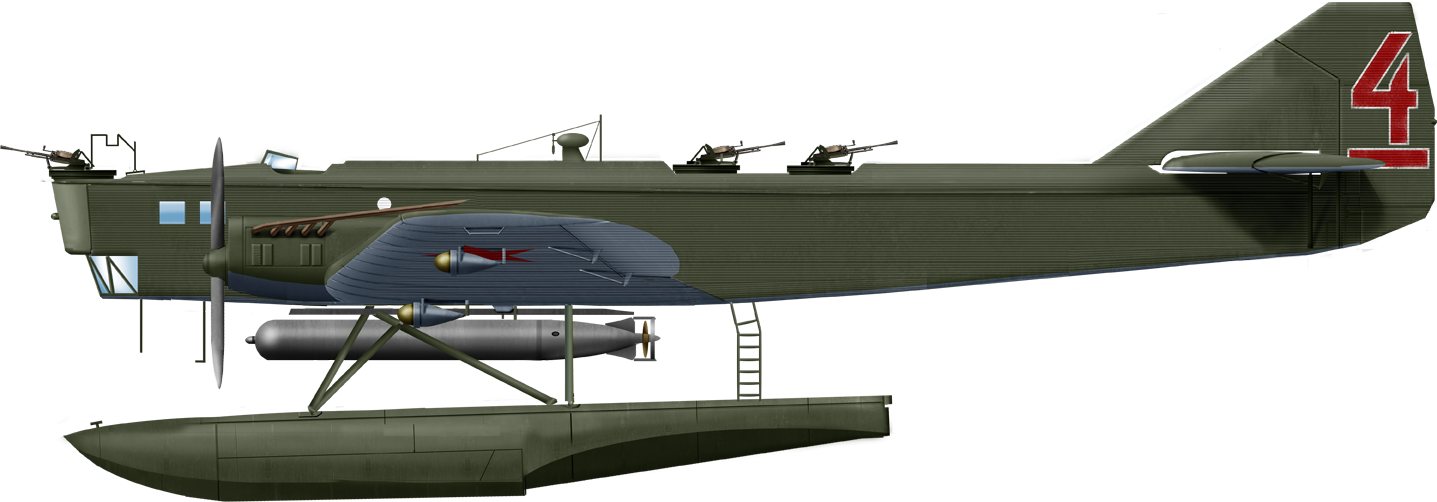
✈ 30/09/2022 Tupolev TB-1P (1932)
The Tupolev TB-1P was a specialized floatplane variant of the famous 1930 all metal two-engin bomber, first great success of aviation legend Andrei Tupolev. This variant built to around 60 or more models which production started after the bomber production stopped equipped several units of the Baltic and Black sea but a few were still operational in a training unit in 1941.
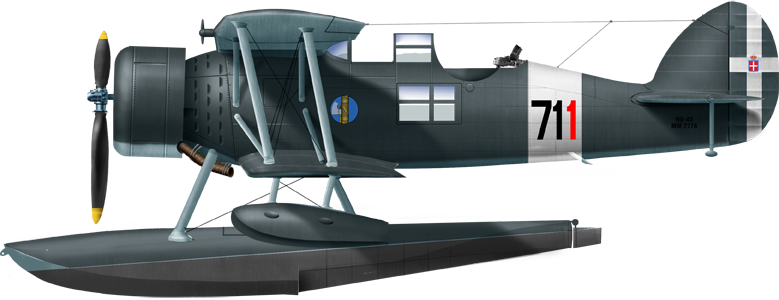
15/09/2022
✈ IMAM RO 43
The IMAM Ro.43 was Regia Marina's main onboard catapulted observation biplane floatplane (1934-43), 193 were delivered, but production stopped in 1943, its fighter version RO.44 was a failure and its replacement the Reggiane Re. 2000 was not even a floatplane. (1934-43)

27/08/2022
✈ Mitsubishi A6M Zero (1940)
After seeing its main allied opponents, the Wildcat and Hellcat, it was logical to see their nemesis: A legenday fighter introduced in 1940 in the #imperialjapanenavy. Just named colloquially "zero", still popularly known as such today, "Mitsubishi Navy Type 0 carrier fighter" or A6M was probably the most famous creation of aviation designer Jiro Horikoshi. A superb dogfighter, mass-produced more than any Japanese model in history, and combined with perhaps the best trained naval fighter pilots in the world in 1942. However, it was stretched to the limit and obsolete by 1944, soldiering on until the end due to the lack of its planned replacement. https://bit.ly/3PVEfOX #IJN #IJNA #mitsubishizero #a6m #japanesenavy #ww2 #pacificwar #rabaul #midway #leyte.

13/08/2022
✈ Blackburn Skua (1937)
The Blackburn Skua was developed as the first Fleet Air Arm model all-metal monoplan dive bomber. Innovative for its time it was however slow and vulnerable, but very active until its gradual replacement from 1941, completely obsolete by then. In practice the Skua, less doubtful as the related Roc, was replaced in the Navy by the Fairey Barracuda from 1943, a long gap for which no modern dive bomber was in service.

23/07/2022
✈ Grumman F6F Hellcat (1942)
The legendary 16:1 navy butcher bird. The Grumman Hellcat would be forever associated with the second phase of the Pacific war. It replaced the hard-pressed F4F Wildcat on board all USN fleet carriers (the F4F would continue operating on escort carriers until 1945). Still barrel-like like all previous Grumman fighters, it was far more powerful and resilient than its nemesis, the Zero...

16/07/2022
✈ Shavrov Sh-2 (1930)
The "sea sabot", or Shavrov Sh-2 is a now somewhat forgotten Soviet flying Boat designed at young age by the Sovit engineer and later aviation historian BV Shavrov in 1928-1930. It had an amazing longevity, the last of these transport parasol wing amphibious models discarded the later 1950s or 1960s after its development lasted until 1955. #ww2 #sovietaviation #russianaviation #flyingboat #interwar #shavrov

✈ 09/07/2022
✈ Blackburn T.5 Ripon (1926)
Forgotten today, this predecessor of the Swordfish was the standard carrier-based torpedo bomber of the Royal Navy until 1933. Designed to replace the Blackburn Dart, it was developed from the Air Ministry Specification 21/23, winning against the Handley Page Harrow and Avro Buffalo, served in the Fleet Air Arm in 1930-1935, before being withdrawn and replaced by the improved Blackburn Baffin, and seeing action with the Finnish Air Force in the winter war of 1939.
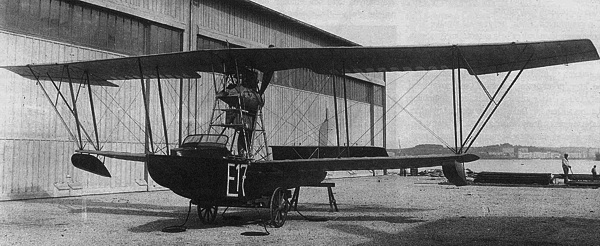
✈ 02/07/2022
✈ Austro-Hungarian Naval Aviation (1912-18)
The K.u.K. Seefliegerkorps, or Austro-Hungarian naval aviation was created in 1915 and shared resources and manufacturers with the regular air force, or Kaiserliche und Königliche Luftfahrtruppen. Yet, the Austro-Hugarian Navy (KuK Kriegsmarine) independent air force called the K.u.K. Seeflugwesen (Imperial and Royal Naval Air Corps), operated many models above the Adriatic, Hansa-Brandenburg, Fokker, Aviatik, Albatros and Phönix models as well as Lohner seaplanes.

25/06/2022
✈ Nakajima B5N "Kate" (1940)
The Nakajima B5N was completely unknown by US Intel before 1941, and vastly underrated (like most Japanese aviation, seen as mediocre western copies). Little was known that this model, albeit of the same generation, vastly outperformed the Douglas TBD Devastator, its rival at the time, which in all western publications was proudly accumulating records and "world's firsts". The B5N was simply faster and more capable overall. For some authors it was even the world's best carrier-borne torpedo bomber when WW2 broke out. Best proof of that, the "Kate", much like the "Val" was soon much feared in the early phase of the Pacific Campaign, never truly replaced and fighting on the frontline to the end. #pacific #midway #WW2 #imperialjapanesenavy
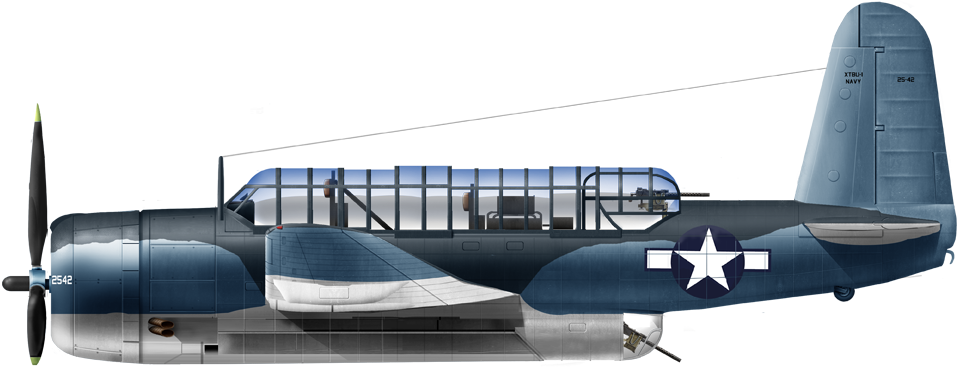
15/06/2022
✈ Consolidated TBY Seawolf (1941)
When good enough beats better: The TBY Sea Wolf was a 1940 designed USN carrier-borne torpedo aircraft from Vought as the TBU, unlucky contender and contemporary to the Grumman TBF Avenger. Its development dragged on and its production went to Consolidated in 1943, redesigned as the TBY-2. It never saw battle with the last cancelled in September 1945 after 180 were completed. The Seawolf was the ultimate "what if", an arguably better alternative to the legendary Avenger and now largely forgotten. #WW2 #USNavy
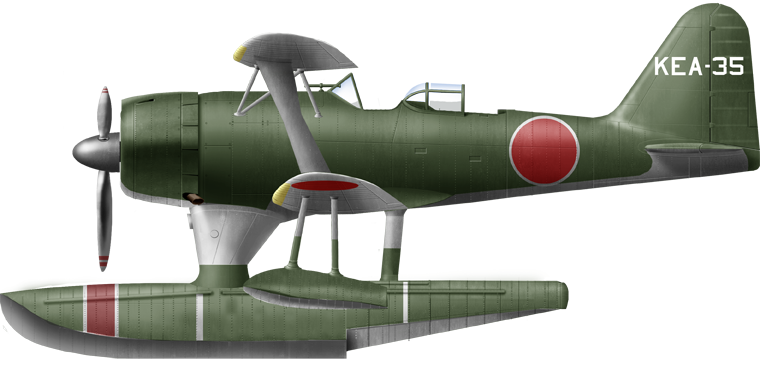
04/06/2022
✈ Mitsubishi F1M "Pete" (1936)
The IJN customary had two reconnaissance/spotter floatplanes in service, one for battleships, and one for cruisers, the latter model bing mostly used for reconnaissance. The F1M (WW2 allied code "pete") was the last biplane ever designed by Mistubishi. It was a replacement planned in 1935 for the Nakajima E8N ("Dave") as main catapult-launched navy spotter from cruisers, reliable but slow and underpowered. It first flew in 1936 and introduced in 1941, in service until 1945 and produced up to 944 machines. #WW2 #ImperialJapaneseNavy

25/05/2022
✈ Curtiss SO3C Seamew (1939)
The Curtiss SO3C was supposed to be the main reconnaissance and spotting floatplane in service on board capital ships, cruisers and aircraft carriers of the US Navy in 1940, in its convertible versions. However it was a such mediocre seabird, that the production was cut short aft 800 delivered, and it was often replaced by the previous SOC Seagull and Kingfisher on battleships. It nevertheless served from 1942 to 1944 mostly from cruisers.
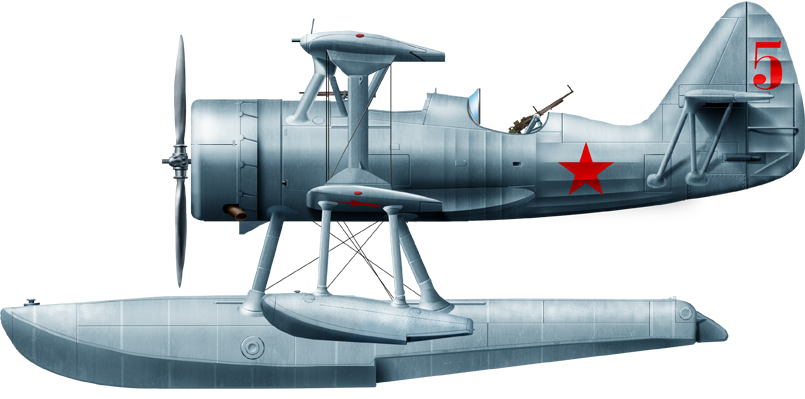
19/05/2022
Beriev BE-2 (KOR-I) (1936)
The Beriev BE-2 was the first soviet navy dedicated catapult-launched observation and reconnaissance floatplane. It first flew in April 1936 and was introduced in 1938, but produced to just 12 machines, with a land-based version, and retired in 1942.
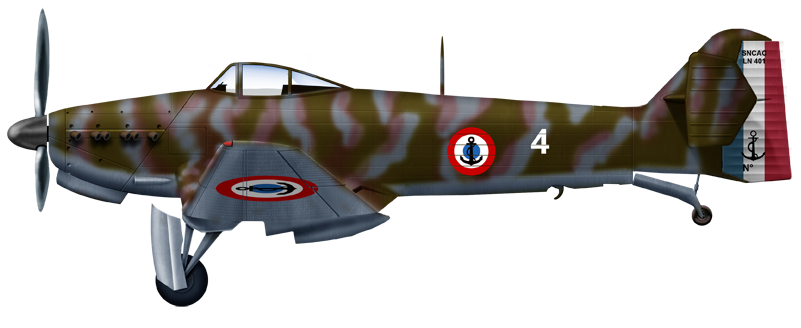
14/05/2022
✈ Loire Nieuport 40 (1938)
The "French Stuka" as it was called, was an attempt by the Navy to acquire a modern dive bomber to be based on the aircraft carrier Béarn and coastal units. It was a rugged, inline engine model which initial development started in 1934, but when introduced in 1939 with the Béarn already at sea, they served on land and were mostly destroyed in action by May 1940.

03/05/2022
✈ Ryan FR-1 Fireball (1945)
The Ryan FR Fireball was the sole US Navy mixed-power (piston and jet-powered) fighter aircraft, designed by Ryan Aeronautical during WW2, hence it's classification here. It was one of these numerous projects never completed in time to take part in WW2, but it's purpose was defeated by its experimental value. But it has at least the distinction of being Navy's first jet aircraft. Only 66 were built before Japan surrendered in August, just enough to fill a single squadron, training and not seeing any combat. It proved that structural strength was required for aircraft carriers operations, as well as it's transitional, uneasy nature, and was withdrawn quickly, in mid-1947.
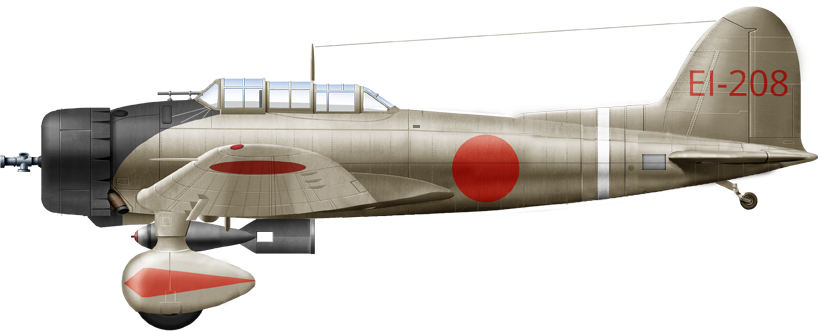
22/04/2022
✈ Aichi D3A "Val" (1936)
The standard dive bomber of the Imperial Japanese Navy in WW2, until replaced in 1943 by the "Judy", the famous D3A "Val" was the terror of the US Navy in 1941-42, starting with Pearl Harbor and the battles of the Coral Sea, Midway and the Solomons Campaign. Slow, but deadly accurate, this dive bomber was also quite agile.

02/04/2022
✈ Brewster SB2C Buccaneer (1941)
The Brewster Buccaneer was an ill-fated scout bomber designed in 1940, which first flew in 1941, but was plagued by so much problems and manufacturing issues, that it was soon retired from active units, sent to mechanics training only, or scrapped altogether on arrival (British ones); It caused an abrupt cancellation of the contract, followed after the war, by a full commission of enquiry on the company. It is a solid contender for the title of worst plane of WW2, for all categories.
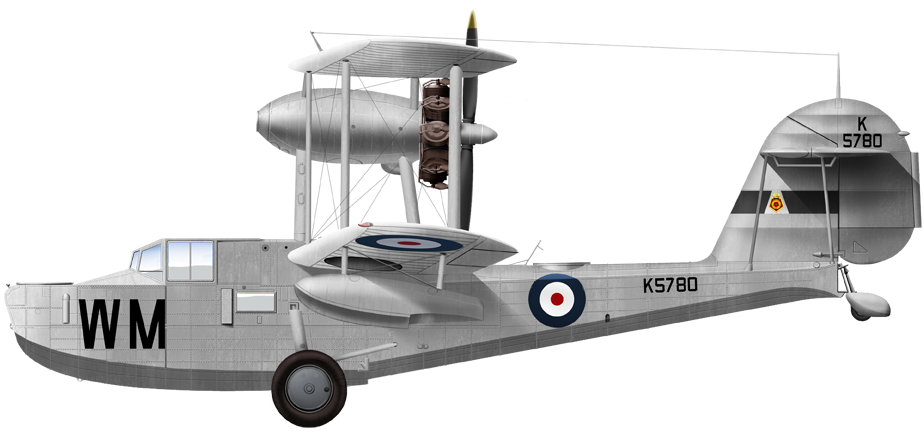
09/03/2022
Supermarine Walrus (1933)
The most common WW2 catapulted amphibious reconnaissance seaplane of the Royal Navy, on board cruisers and battleships, but also aircraft carriers, was the Supermarine Walrus. It was a slow pusher biplane, but innovative for its time, very sturdy, with a fully retractable carriage and foldable wings... Its contribution to the war has been considerable, although often overlooked by another product from Supermarine also designed by Mitchell, the Spitfire...
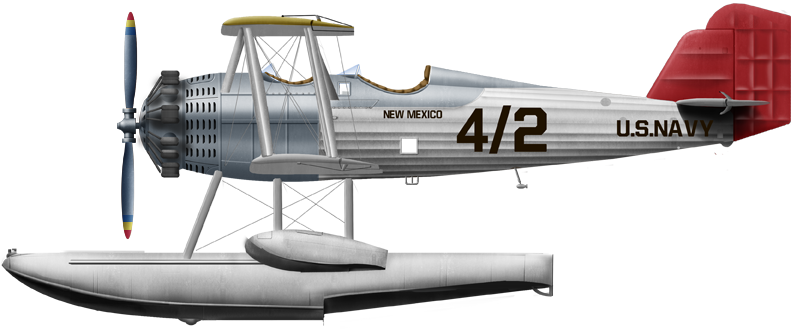
26/02/2022
✈ Vought O2U/O3U (1927)
The name "corsair" in the USN for an aircraft has a long legacy. The cold war LTV A-7 Corsair II produced by Vought through Ling-Temco-Vought is now retired, but modern drones are likely to retake the name, first granted to a Vought plane back in 1928. This was the original one, before the legendary WW2 fighter-bomber. From the 1926 Vought XO-26 prototypes to the production O2U Corsair, the Navy had its standard biplane scout and observation aircraft, both usable with floats or interchangeable wheeled undercarriage. It was used notably on virtually all interwar USN aircraft carriers in wheeled version, being only retired in 1939 on these (O3U), and was also standard on most interwar US Battleships and cruisers. That very long legacy did not ended in WW2, as no fewer than 141 Corsairs were still serving with the US Navy and Marines, and the type was still used by many countries outside the US, notably for training. It saw action in China, in the Colombia-Peru war, and by the Thai air force against France in 1941. It became iconic in the last scene of 1933 classic "King Kong" as well. The "Corsair" despite its age, was licenced-built and largely exported, seeing plenty of action before and during WW2.
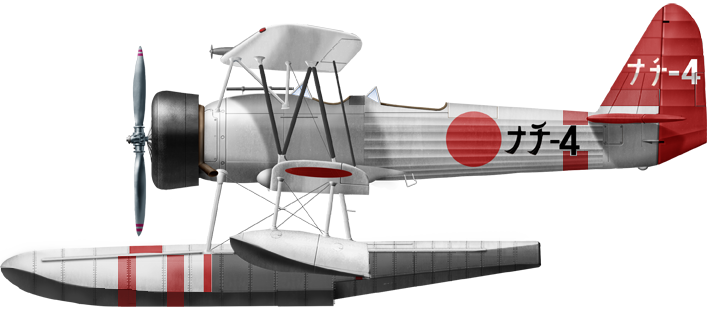
19/02/2022
✈ Nakajima E8N (1935)
The Nakajima E8N was the standard catapult-launched observation and artillery spotting floatplane onboard all battleships and heavy cruisers of the IJN from 1936 to 1941. The type saw heavy action over China and soldiered on until the battle of Midway, before being sidelined. It was reliable, versatile, sturdy enough to be used as a dive bomber, agile enough to dogfight, but slow and weakly armed.

08/02/2022
✈ Fairey Fulmar (1940)
The Fairey Fulmar was a British carrier-borne reconnaissance and fighter aircraft developed and manufactured by Fairey Aviation in 1939-40. Named after the northern fulmar, British Isles seabird it became one of the most used Fleet Air Arm (FAA) model during WW2. Production ceased in 1943 as the new, much more powerful Firefly came into service. Looking superficially to the underpowered RAF Fairey Battle, the Fulmar never had any chance to compete as a fighter against the Bf 109, but still scored many victories and played many important roles until gradually replaced as a fighter by the Sea Hurricane, Martlet and Seafire, and as a general purpose model by the Firefly and later the Firebrand.

18/01/2022
✈ Yokosuka B4Y "Jean" (1936)
The Yokosuka B4Y, also called Navy Type 96 Carrier Attack Bomber was the specialized torpedo bomber of the IJN, and last biplane of that type before the arrival of the B5N "Kate". Introduced in servive from 1936, it equipped all IJN aircraft carriers and was still in use by 1943 in China, in second line and training units. The B4Y replaced the Mitsubishi B2M2 as the last operational biplane by the IJN. It was known by the Allies as "Jean".
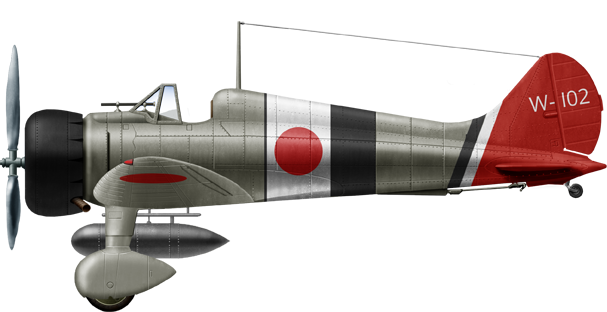
08/01/2022
✈ Mitsubishi A5M "Claude" (1936)
The Mitsubishi A5M (first flight 1935) was the first Imperial Japanese Navy monoplane fighter, derived from the Ka-14 gullwings prototype. It soon appeared to have outstanding performances and was adopted as the A5M1, seeing combat debut in China. The A5M2 and A5M4 mostly served in China when WW2 broke out, but also in the home island and some pacific outposts. It was copied by the Army with the Ki-27 "Nate" and was replaced from 1940 by the legendary A6M "Zero".
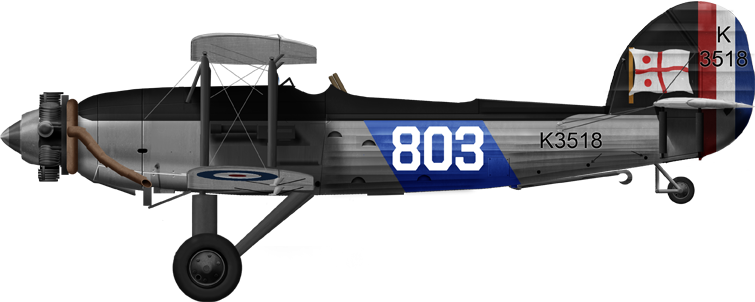
27/12/2021
✈ Fairey Seal (1930)
With 90 built and exported also to Argentina, Peru and Chile, the Fairey Seal was a naval plane usable with undercarriage or floats, derived from the Fairey IIIF. It operated from the deck of all British aircraft carriers before its replacement by the Swordfish in 1936-38. The last one still trained pilots in 1943.
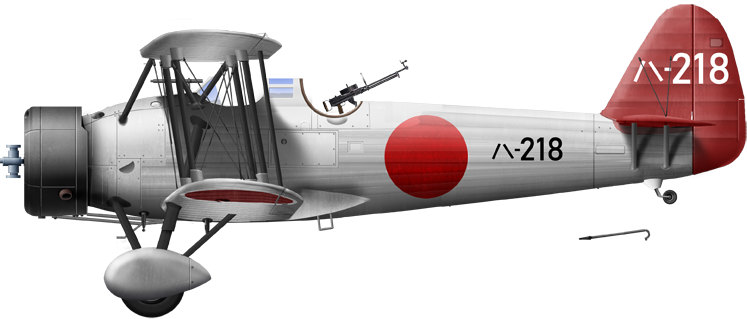
15/12/2021
✈ Aichi D1A/D2A "Susie" (1934)
The Aichi D1A/D2A "Susie" was a reliable, modern dive bomber biplane in service with the IJN from 1935 to 1940 (1942 with Mandchukuo). It was the direct predecessor of the D3A "Val" monoplane of WW2 fame, and still served in many units in China while replaced in the fleet from 1940. Two models were developed, the D1A1 and D1A2, mostly used in China.
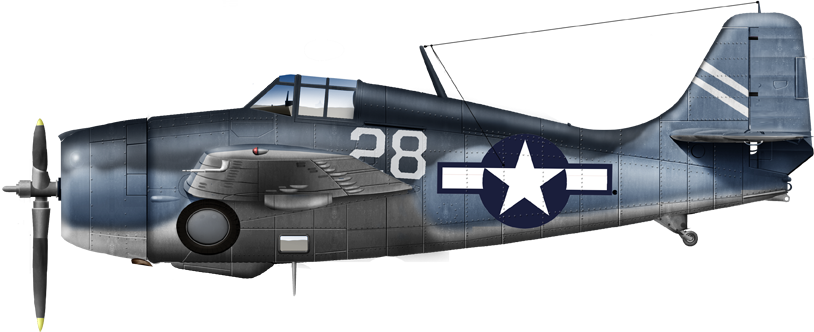
04/12/2021
✈ F4F wildcat (1940)
Rarely fighters in history had been so hard-pressed in desperate situations and proved up to the task than the Grumman Wildcat in 1942-43. When the F4F-3 was chosen for production after a long development going back to 1937, there was a fighter neither pretty nor supremely agile, but it was sturdy yet light and reliable. From 1941 to 1945 it became a staple of USN and Fleet Air arm naval fighters even though better models appeared in between.

16/11/2021
✈ Nakajima A4N (1935)
The Nakajima A4N was the main Japanese naval biplane fighter during the 1937 Sino-Japanese war and until the arrival of the Mitsubishi A6M Zero in 1941. It fought alongside its precedessor the A5M "claude", which was a monoplane, and was still operating in 1940 from many bases throughout China.
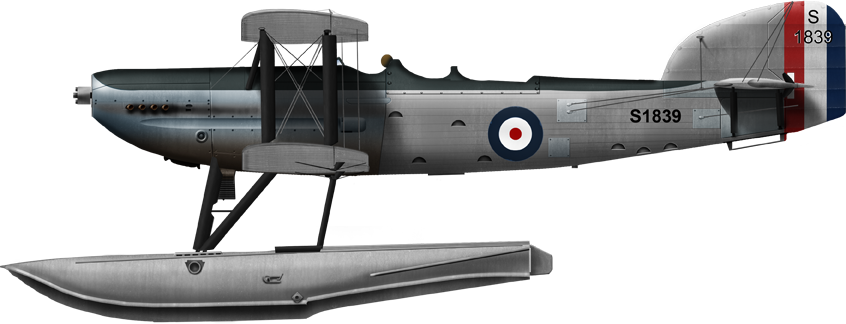
06/11/2021
✈ Fairey III (1917-27)
Fairey Aviation became as indispensable to the British Naval Aviation as Grumman was to the USN or Mitsubishi to the IJN: Probably its most bespoke model was not the Swordfish, but one model going back to 1917: The legendary Fairey III. Derived from the Campania, through its various iterations (A to F), the Fairey III made the near-impossible feat of staying active until WW2 and generating a tree of new models, including the Gordon, Seal, Swordfish and its successors.
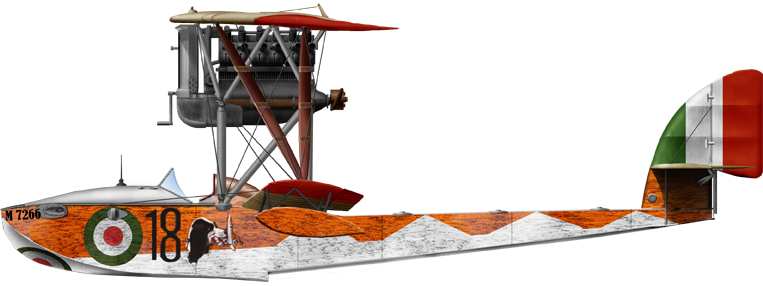
23/10/2021
✈ Macchi M3 (1917)
The #Macchi M3 and its fighter variant, the M5, were an important part of the Italian involvement in the Adriatic campaign of WWI. Derived from a captured Austro-Hungarian Lohner, the M3 and M5 soon appeared as among the best entente naval fighters of the war. The name Macchi was soon associated with excellent seaplanes and its Schneider Cup rivalry with Supermarine. The M5 was also tested by the USN and USMC, and on it, Charles Hammann received the first Medal of Honor awarded to any United States naval aviator. #ww1 https://bit.ly/3nD05L5.

02/10/2021
Mitsubishi B1M (1924)
The Mitsubishi B1M and its variants was the first Imperial Japanese Naval torpedo bomber, in service from 1924 to 1936. It saw service on Hosho, Kaga, Akagi and Ryujo and formed a generation of flying officers and shaped early Japanese airborne torpedo tactics.
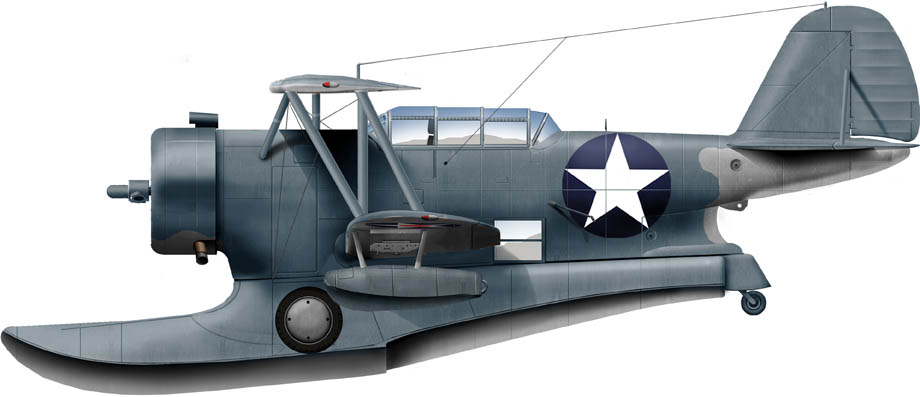
18/09/2021
Grumman J2F Duck (1936)
The Grumman J2F Duck (G-15), another "salty bird". It was a single-engine amphibious biplane used by the USN, Marines, Coast Guard and Air Force from 1937 to the 1950s, notably in air-sea rescue. With its ungainly, unique appearance due to the large float blending under the fuselage, this biplane was sturdy, reliable and had the range needed to perform its mission. Despite a relatively low production (by WW2 standards) of 580 copies, the J2F was a jack of all trades beloved by its pilots, immortalized notably in "murphy's war" in 1971.
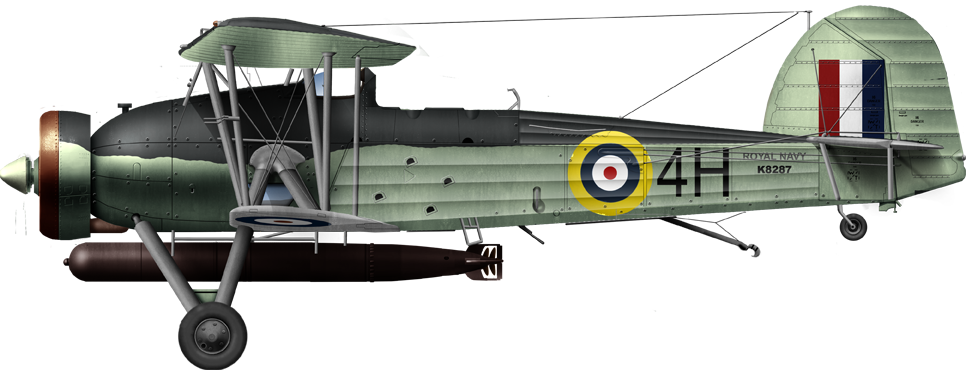
03/09/2021
Fairey Swordsfish
The legendary "stringbag" is perhaps the most famous biplane in WW2 on the allied side (outside training planes like the Tiger Moth). Although it was introduced relatively late, in 1936, it gave invaluable service to the Royal Naval Air Service, sinking many axis vessels or historically instrumental in occasions such as the stopping of KMS Bismarck or the raid on Tarento, which later confirmed the japanese to plan Pearl harbor. Although Fairey planned two replacements for it, the venerable Swordfish soldiered on and was produced practically until the end of the war.

04/08/2021
Curtiss SOC Seagull
The Curtiss SOC Seagull first flew in 1934 and was adopted the next year as main observation floatplane onboard battleship and cruisers in the USN. Production stopped in 1938 and it was scheduled for retirement in 1940, replaced by the new Seamew and Kingfisher. However the new curtiss floatplane was an engineering disaster, so much so the SOC Seagull, versed to training, returned to the front line and soldiered on until 1945...
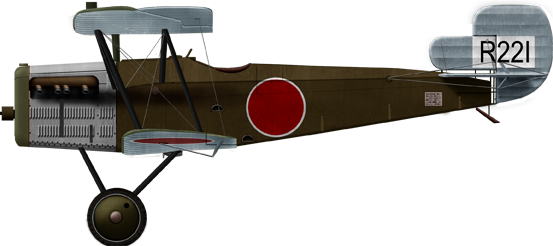
06/07/2021
Mitsubishi 1MF
Weekly Naval Aviation ! The 1MF was born in 1919-1920, designed by Herbert Smith, from Sopwith, to equip the newly built IJN Hosho, and later the Kaga and Akagi. They represented the very first IJN fighter, in activity until 1930. It was a starting point up to a whole lineage. The 1MF1 and 2 were prototypes, the MF3 became the production version (around 150) and evolved into the MF4 and MF5 for training. The MF9 and 10 were completely new animals, prototypes for the 1927 and 1933 contest. The #Mitsubishi 1MF was the first Imperial #JapaneseNavy Fighter, equipping the Hosho in 1923 and later the Akagi and Kaga until 1929 #interwar #IJN
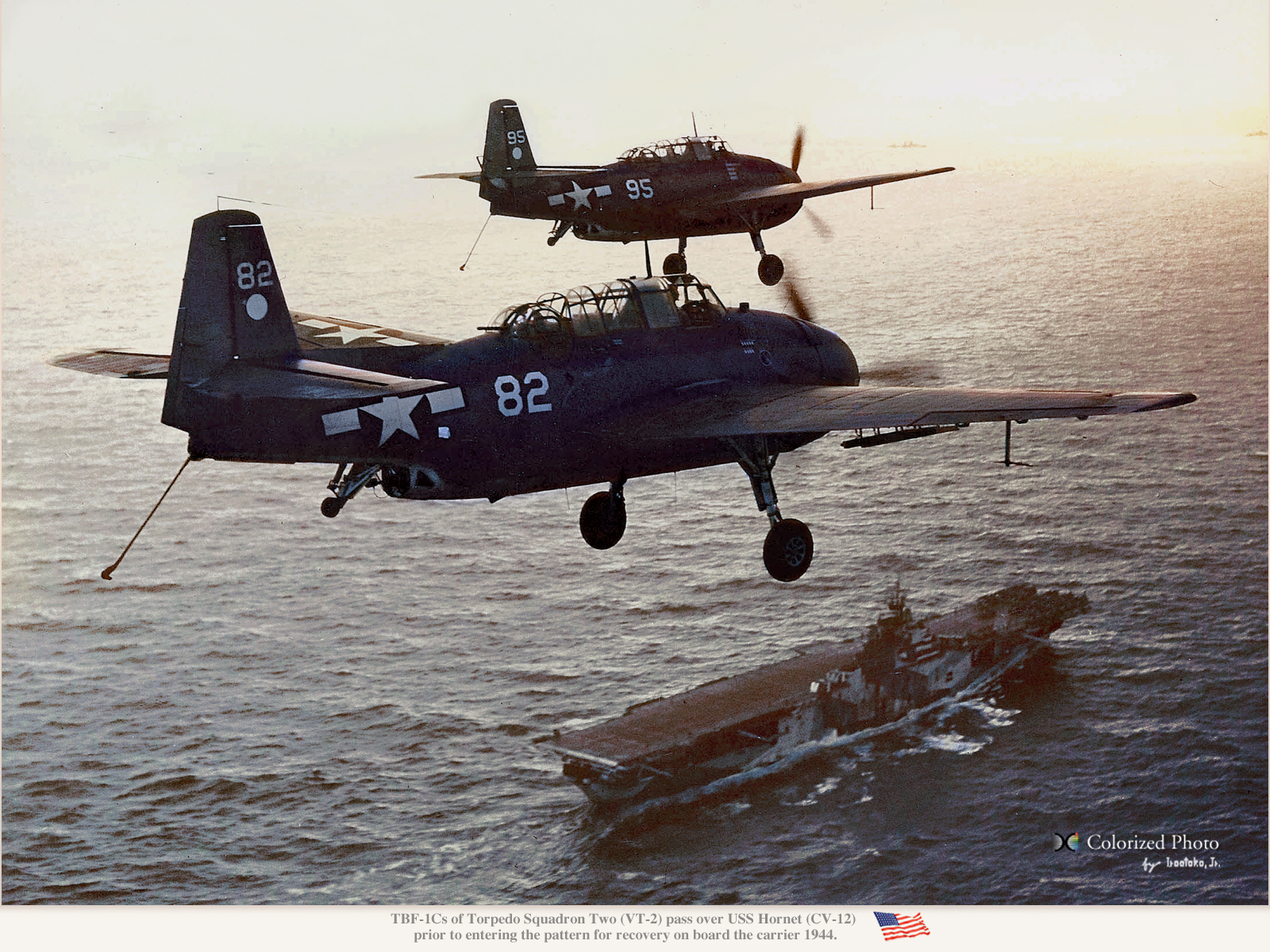
17/06/2021
Fleet air arms in WW2
An overview of fleets air arms of all belligerents, a portal page resuming the naval air forces of the allies, the USN, British, French, Candian, Soviet, Dutch, etc. and the axis, the Luftwaffe and Regia Aeronautica assets used by the Navy, and the IJN aviation. All the models, organization and tactics.

04/06/2021
Douglas SBD Dauntless
Midway special ! - The image is clear now, since the river of history went by, nearly 80 years ago. On 4 June 1942, in a remote corner of the Pacific with no land in sight for hundred of miles, an epic clash turned the tide of the pacific war. It has been told and retold as such, and books tried to moderate the claim, but in the end it still stands strong. No battle was so decisive in its long-term effect. And it was a complex one, with a grand Japanese strategy, a desperate US Navy hang by its fingernails to its last aircraft carriers… and hundreds of courageous pilots. Among these, none but those onboard a handful of Douglas SBD Dauntless had such decisive action at Midway.
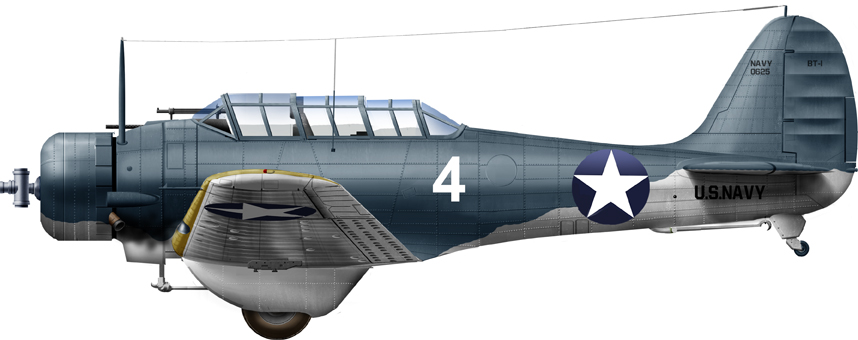
25/05/2021
Northrop BT (1935)
Northrop is rarely associated with US Naval aviation, albeit being one of the most famous and innovative aviation company in history. Innovation was its trademark, and its contribution to the Navy during WW2 has been tremendous for a single reason. In 1933, Jack Northrop’s firm was a small subsidiary of Douglas aircraft corp with just a few prototypes and civilian planes to its credit. Its first solid contract for the Navy was indeed in 1935 the BT, a dive bomber characterized by… perforated air brakes. With them, controlled dive and accurate bombing was possible. Despite a small production (only 55), the Northrop BT was the direct inspiration by its mother company -Douglas- to develop the mass-produced SBD Dauntless that turned the tables at Midway and altered the course of the war in the pacific…

05/05/2021
Grumman F3F (1935)
The Grumman was the last USN biplane fighter indeed, but certainly not the last biplane of the Navy during WW2. Indeed, the Curtiss SBC Helldiver were still around well past 1942, although no longer frontline. It was replaced by the controversial Brewster Buffalo. So before the Wildcat, the frontline USN Fighter onboard all carriers was the Grumman F3F (which never receive its wartime name, although the civilian version was called "Gulfhawk"). In 1939 when WW2 broke out, the Royal Navy also had a biplane fighter, the Gloster sea gladiator. The Japanese had the Mitsubishi A5M, a fixed carriage monoplane, but the superlative A6M just entered service on 1st July 1940, while USN squadrons were just started replacing their F3F by the Brewster F2A. That's a sobering thought.
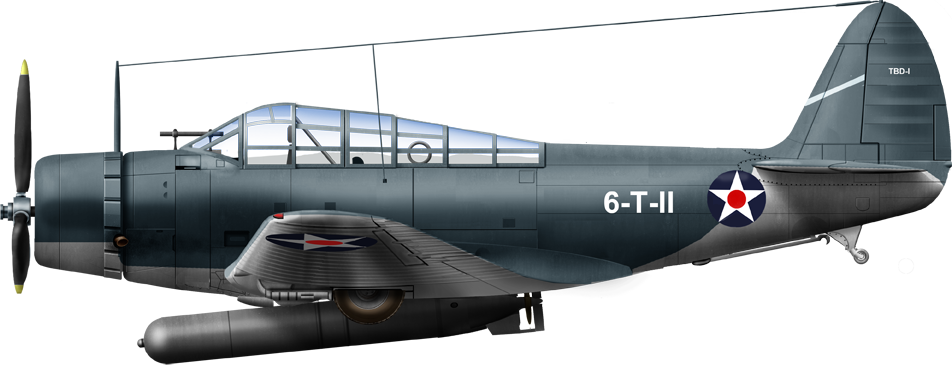
09/04/2021
Douglas TBD Devastator (1936)
First line USN torpedo bomber in 1941-42, the Douglas TBD was caught before its replacement. Ordered in 1934, it entered service in 1937 and at the time, it was not only the most advanced USN aircraft, but possibly the most serious contender for the title of "world's best carrier-borne TB". The pace of aircraft development however caught up, and in June 1942 at Midway, the TBD reputation was destroyed while another Douglas, the Dauntless, won the day, in part because of how the events unfolded. Vastly outclassed for speed and agility while facing the Mitsubishi Zero, remaining TBDs were simply wiped out with little torpedo hits to their credits.
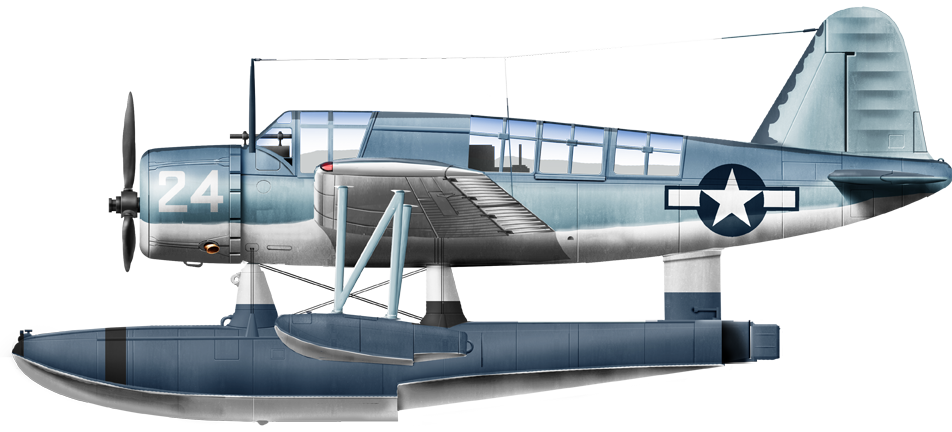
07/03/2021
Vought OS2U Kingfisher (1938)
The Vought OS2U Kingfisher became the staple of the USN’s battleships and cruisers catapulted spotters/recce models, in the shape of a rugged and dependable floatplane. The Kingfisher lacks the aura of the fighters of that time, but they played a vital role when radar technology was in its infancy, and went on even the latter improved during WW2. The OS2U-3 became the Number one artillery spotter plane for battleships, its main task, while also performing long range reconnaissance and recognition of ships previously spotted on radar. But they also carried personal, recovered downed planes or crews, and even hunted down submersibles. 1,519 were built, which also served in the Royal Navy, Royal Australian Air Force and even the Soviet Navy, and went on well into the cold war under other flags. Its direct competitor, the Curtiss SO3C Seamew, was never as popular.

02/02/2021
Brewster F2A Buffalo (1937)
The worst USN fighter ever ? - The Brewster Buffalo has quite a reputation in WW2. For many, it was “the worst fighter of WW2”. That can be analysed in facts and put in relation to the context of its deployment, and compared to the plane’s actual technical issues. But at the end of the day, it started as a naval fighter, ordered by the USN to a young and relatively untested company. Long story short, the Navy tried it, and curtailed the order as soon as reports came in. The production models then were passed onto the “second market” of lend-lease, the British operated it, as did the Dutch in the same theatre of operations, and the Finns. In the hands of the latter it did apparently wonders, which makes the whole case of “worst of WW2” a statement to take with at least a pinch of salt. Now here you go, let’s dive into this model squarely and look at its short career in the US Navy where it started.

05/01/2021
Consolidated PBY Catalina (1936)
The PBY Catalina was during WW2 both a spy and vengeful angel of death for U-Boats, and an angel of mercy for their victims. With more than 3,300 produced, perhaps more than 4,000 in all versions, it was the most common flying boat of WW2. Like the Swordfish also one of the most memorable fleet air arm aircraft for its historical significance. A few spotting fleets often decisively, while thousands others just served reliably and without fanfare, far more often saving lives than taking those. The Catalina also had a very long career spanning the cold war and beyond, notably in the civilian market, still in service today, 80 years after its introduction. In ten years from now (2020), some still flying would be 100 years old. Their pilots kept fond memories of these rugged beast of burdens, yet agile and powerful. The Catalina definitely passed into the legends of aviation and easily can be the most underrated US plane of WW2...

04/12/2020
Vought Vindicator
Two cantilever monoplan dive bombers were in service in USN carriers in December 1941: The Vought Vindicator and Douglas Dauntless. If the latter gained an immortal fame at Midway, the first faded into obscurity as one of the least appealing planes of the USN ever put into service. Despite of this, it carried great hopes and was ordered as soon as it was available by the French and British, but was so disappointing it was soon completely replaced by the Dauntless for USN carrier service, while the Fleet Air Arm discarded these in 1942 despite having no real alternative available. Why it was so ?
To come next...
✈ 2026 Grumman F8F Bearcat (1944)
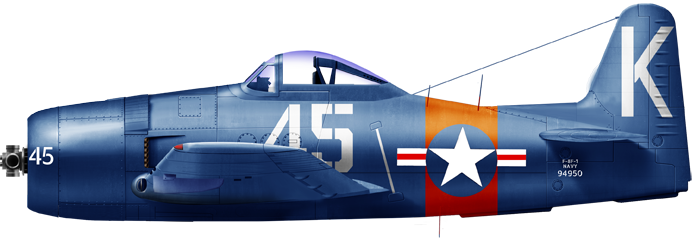
The F6F was recoignised as an excellent fighter but was heavy and lacked the necessary speed to be a carrier-borne interceptor. For this, and under a new requirement in 1943, Grumman started work on a completely different animal. Still animated by a powerful engine it was far more lighter, compact than the F6F and achieved its goal. The Bearcat arrived too late to take part in WW2 and was the unfortunate best but last USN frontline piston-engine fighter. It made also a career under other flags until 1960. (Planned Post)
✈ 2026 Douglas AD Skyraider (1945)

Although some of the most prominent WW2 aircraft, such as the F4U Corsair or the P51 Mustang, constantly upgraded, still took part in various combats in the 1970-80s, the Douglas Skyraider is certainly one of these surprises. Known at first as the AD Skyraide this very robust and reliable single-seat attack aircraft was in service from 1946, virtually to the early 1980s, making a remarkably long and successful career for a piston-engined model in turboprop and jet age. For these longevity reasons it was also nicknamed lately the "Spad", a reference to the French WWI fighter. In the 1960s indeed when it soldiered over Vietnam, there was as much time since its first flight from the Spads in US service. (Planned Post)
✈ 2026 Blackburn Firebrand (1942)

The FAA followed the same path as the USN concerning single-seat multirole attack aircraft, but sooner, in 1941, when was first planned the Firebrand. Since armoured carriers had a limited air group, the FAA still looked as powerful "jacke of all trades", and the latest creation of Blackburn was to be its pinnacle. The imposed Napier Saber engine, designed for the Hawker Typhoon made it already dated, and it was slow in development, being only ready by 1945. 200 were manufactured and saw the early cold war before retirement in 1953. (Planned Post)
✈ 2026 Vought F4U

36 years of service for the “Gullwing Marvel”. Probably the most famous fighter ever designed for any Navy, arguably, was the Vought F4U Corsair. After the F4U-1 or "birdcage" next posts will be upgrades of the next versions, the prolific F4U-1A, 1C, 1D, F4U-4, F4U-5, AU-1, F4U-7, the Brewster F3A-1/1D, Goodyear FG-1/1D, F2G-1/2... and in international service until the 1970s.
✈ 2026 Martin AM Mauler (1945)
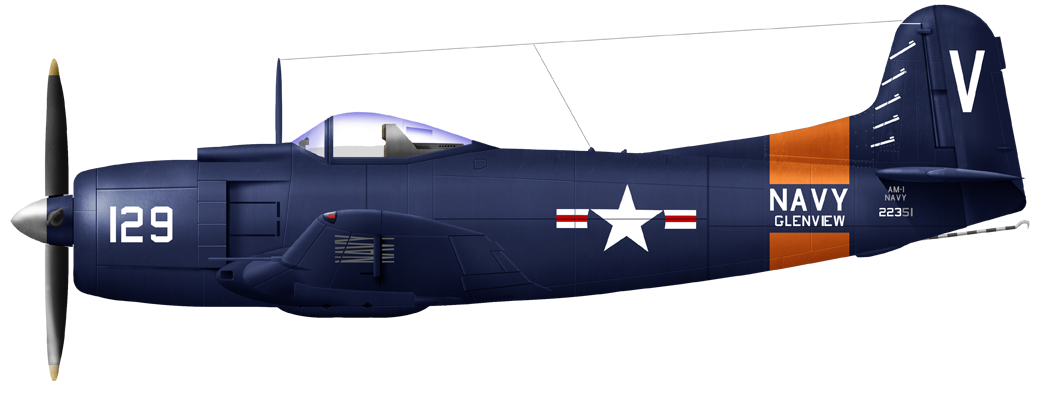
The Martin AM Mauler was of a generation of successors for both the Helldiver and Avenger, which first flew in 1945. Designed as a single-seat carrier-based attack aircraft it met so many development delays that it failed entering service until 1948 and proved troublesome until 1950, replaced by a former competitor, the reliable Douglas AD Skyraider. The "beast" remained in second line units until 1953, some reequipped with the AM-1Q EW system. (Planned Post)
✈ 2026 Grumman AF Guardian (1945)
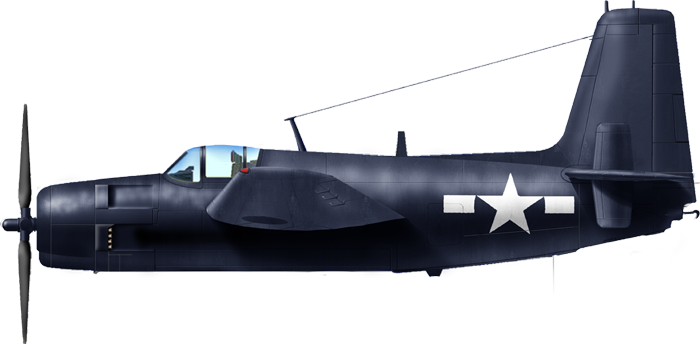
First purpose-built anti-submarine warfare (ASW) carrier-based aircraft, it first flew by December 1945 but was only introduced in 1950, built to 389 units and retired by August 1955, early than many modernized and reconverted Avengers. Redesignated as AF-2W (TB3F-1S) and AF-2S (TB3F-2S) for its two versions and commencing service in September 1950 VS-24 and later with VS-25, the 193 AF-2S Guardians built were succeeded in a sense by the 1952 AF-3S (ASW hunter) using a magnetic anomaly detector (MAD) for detection (40 built). The last arrived in March 1953 and they saw action during the Korean War, but was unpopular, both underpowered and heavy on the controls, with a high accident rate. Its replacement came just in time as the twin-engine Grumman S2F Tracker as a combined hunter-killer, making for a quick removal of the Guardian until 31 August 1955, some still active with the ENN Air Reserve until 1957.
✈ 2026 Vought F8 Crusader (1955)

Nicknamed "the last gunslinger" and adored by its pilots for its speed and agility, this was the only recent successful venture of Vought for the USN after the lackluster results of the Pirate and Cutlass. Both had been failures with little production and quick retirement. However with the Crusader, the company revived this trust. The record-breaking interceptor anihilated the US Air Force F-100 supersabre and stole the show at the time in aviation circles. It really imposed its will during the Vietnam war, but performing -unlike it's reputation- a single kill with guns, and all the rest were sidewinder missile victories. Nevertheless, it had the best kill/loss ratio in the USN and earned the final nickname of "mig master".
✈ 2026 McDonnell Douglas Phantom II (1958)

The multirole, strange looking McDonell Douglas Phantom II (since the first of the name already served in the USN in the 1950s), was a mach 2 fighter bomber which was not the most agile (compared to the Crusader especially) but certainly the most versatile, with a lot of raw power and an amazing payload capacity. It was used as a "missile truck" as well as bomber, carrying all sorts of ordnance in Vietnam, shooting more MIgs than any other models, and leading to constant upgrades and variants during it's very long international career, where it became the most produced NATO and US modern military jet ever.
✈ 2026 Douglas A4 Skyhawk (1954)

The Douglas A4 Skyhawk was a small jet designed to replace the Skyraider, a sturdy piston-engine model from 1945. The latter would continue to serve nevertheless for decades, while the Skyhawk nevertheless soon cemented its place as an ideal design for a multirole model on small carriers, notably those of the Colossus/Majestic class of WW2. It served for most of the cold war, a much appreciated asset for its general performances and payload in the USN.
✈ 2026 Grumman F9F Panther (1948)
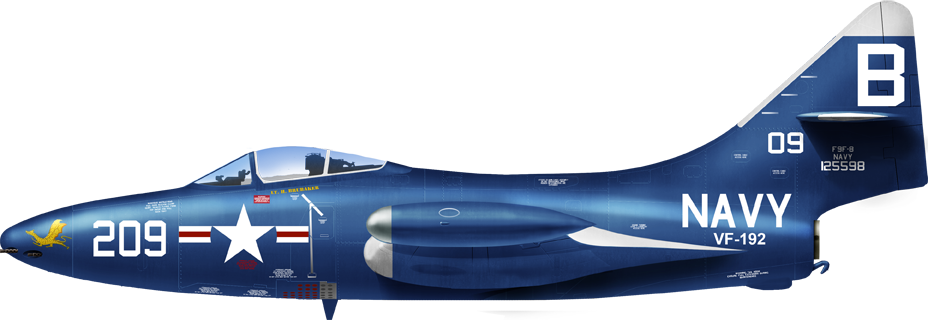
The Grumman F9F Panther was one of the United States Navy's first successful carrier-based jet fighters. It entered service in 1949 and played a significant role during the Korean War, where it served primarily in the ground-attack and close air support roles. The Panther was powered by a single Pratt & Whitney J42 turbojet engine, giving it a top speed of around 575 mph (925 km/h). It was armed with a combination of cannons and rockets, making it effective against both air and ground targets. The Panther's success paved the way for further development of carrier-based jet aircraft by Grumman, including the more advanced F9F Cougar.
✈ 2026 North American A5 Vigilante (1958)

The North American A5 Vigilante was for its time, the largest and fastest bomber in service in any navy. It would be handled only by the largest "supercarriers" and made its combat debuts on USS Enteprise (CVAN-65). However the inter service rivalry eventually condemned the innovative bird to only perform reconnaissance missions, which it did for decades.
✈ 2026 BAE Sea Harrier (1978)

The Hawker Siddeley Harrier was the world’s first operational vertical/short takeoff and landing (VTOL/STOVL) jet fighter. Developed in the 1960s by Hawker Siddeley, it was designed to operate from short runways, forward air bases, or unprepared surfaces, making it highly adaptable for combat situations...
✈ 2026 Blackburn Bucaneer

The Blackburn Buccaneer was a British low-level strike aircraft that served with the Royal Navy and the Royal Air Force. Developed by Blackburn Aircraft, it was primarily designed for maritime strike missions against Soviet ships and submarines during the Cold War.
✈ 2026 De-Havilland-Sea-Vixen.php

The De Havilland Sea Vixen is a British twin-engine, twin-boom, carrier-based fighter aircraft developed during the late 1950s. It was designed by the De Havilland Aircraft Company, primarily for service with the Royal Navy's Fleet Air Arm. The Sea Vixen was intended to provide fleet defense and strike capabilities. But it ended as one of the strangeest naval jets ever developed, a true confirmartion of function over form.
✈ 2026 Hawker Sea Fury
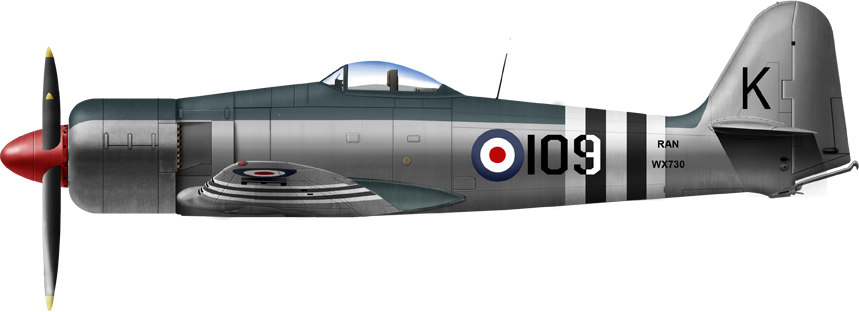
The Hawker Sea Fury was a brillant machine, and a replacement, more than a development of the land-based Hawker Tempest. The Sea Fury really was the last piston-engine model to enter service with the RN, boasting even with the full additional ordinance, a top speed of 460 mph and 20,000 feet climbed in just under five minutes, while staying very agile.
✈ 2026 Hawker Sea Hawk

The Hawker Sea Hawk was a British single-seat jet fighter aircraft developed in the 1940s. It served primarily with the Royal Navy's Fleet Air Arm (FAA) from the early 1950s until the late 1960s. The Sea Hawk was designed by Hawker Aircraft, which was later merged into Hawker Siddeley. It was a rugged and reliable aircraft, seeing action during various conflicts, including the Suez Crisis and the Indian-Pakistani Wars.
✈ 2026 Supermarine Scimitar

The Supermarine Scimitar was a single-seat, twin-engine naval strike fighter, exclusively used by the Royal Navy’s Fleet Air Arm and last aircraft fully designed and built by Supermarine, famously the maker of the Spitfire. The programme was initiated in 1945 as a model specifically designed for "sprung" rubber decks then in development for easier landings (later abandoned). The project then evolved as a 2nd generation jets and a previous prototype, the Type 508, first flew in 1951.
✈ 2026 Tupolev TU-142

To start this new cold war naval aviation section, let's start not with the USN but the Soviet Navy, giving the fact that using extensive air assets was part of the doctrine to compensate for the numerical inferiority of the Sovietsky Flot when facing the USN Navy. For this, the TU-142 "Bear-F" was one its serious ace in that long range overseas reach. Derived from the Tu-95 "Bear" strategic bomber, it was a Maritime reconnaissance/anti-submarine warfare. It was in fact to be capable of hunting down US submarines first, then deal with taske forces with large antiship missiles, although this role was better taken over by shorte range Tu-16 Badger, Tu-22 Blinder and Tu-26 Backfire naval variants. Stil, this rival of the iconic USAF B-52 bomber had no equivalent in the west, but the P-3 Neptune and P-5 Orion, smaller, slower and shorter range.
✈ 2026 Yakovlev Yak-38 "forger"

The Yakovlev Yak-38 was the Soviet Union's first operational vertical take-off and landing (VTOL) aircraft and the only VTOL strike fighter to enter service with the Soviet Navy. Introduced in the early 1970s, it was developed by the Yakovlev Design Bureau as part of the Soviet Navy's initiative to equip its small aircraft carriers, such as the Kiev-class, with fighter aircraft.
- Lohner E (1913)
- Macchi M3 (1916)
- Macchi M5 (1918)
- Ansaldo ISVA (1918)
- Short S.38 (1912)
- Sopwith Baby (1916)
- Short 184 (1916)
- Fairey Campania (1917)
- Sopwith Cuckoo (1917)
- Felixstowe F.2 (1917)
- Friedrichshafen FF 33 (1916)
- Albatros W4 (1916)
- Albatros W8 (1918)
- Hanriot HD.2
- Grigorovich M5 (1915)
- Grigorovich M9 (1916)
- IJN Farman MF.7
- IJN Yokosho Type Mo
- Yokosho Rogou Kougata (1917)
- Yokosuka Igo-Ko (1920)
- Curtiss N9 (1916)
- Aeromarine 39
- Vought VE-7
- Douglas DT (1921)
- Boeing FB.5 (1923)
- Boeing F4B (1928)
- Vought O2U/O3U Corsair (1928)
- Blackburn Blackburn (1922)
- Supermarine Seagull (1922)
- Blackburn Ripon (1926)
- Fairey IIIF (1927)
- Fairey Seal (1930)
- LGL-32 C.1 (1927)
- Fokker T.II (1921)
- Caspar U1 (1921)
- Dornier Do J Wal (1922)
- Rohrbach R-III (1924)
- Mitsubishi 1MF (1923)
- Mitsubishi B1M (1923)
- Yokosuka E1Y (1923)
- Nakajima A1N (1927)
- Nakajima E2N (1927)
- Mitsubishi B2M (1927)
- Nakajima A4N (1929)
- CANT 18
WW1
✠ K.u.K. Seefliegerkorps:
 Italian Naval Aviation
Italian Naval Aviation
 RNAS
RNAS
 Marineflieger
Marineflieger
 French Naval Aviation
French Naval Aviation
 Russian Naval Aviation
Russian Naval Aviation
 IJN Air Service
IJN Air Service
 USA
USA
Interwar
 Interwar US
Interwar US
 Interwar Britain
Interwar Britain
 Interwar France
Interwar France
 Interwar Netherlands
Interwar Netherlands
 Interwar Germany
Interwar Germany
 Interwar Japan
Interwar Japan
 Interwar Italy
Interwar Italy
- Curtiss SOC seagull (1934)
- Grumman FF (1931)
- Curtiss F11C Goshawk (1932)
- Grumman F2F (1933)
- Grumman F3F (1935)
- Northrop BT-1 (1935)
- Grumman J2F Duck (1936)
- Consolidated PBY Catalina (1935)
- Brewster/NAF SBN-1 (1936)
- Curtiss SBC Helldiver (1936)
- Vought SB2U Vindicator (1936)
- Brewster F2A Buffalo (1937)
- Douglas TBD Devastator (1937)
- Vought Kingfisher (1938)
- Curtiss SO3C Seamew (1939)
- Douglas SBD Dauntless (1939)
- Grumman F4F Wildcat (1940)
- F4U Corsair (NE) (1940)
- Brewster SB2A Buccaneer (1941)
- Grumman TBF/TBM Avenger (1941)
- Consolidated TBY Sea Wolf (1941)
- Grumman F6F Hellcat (1942)
- Curtiss SB2C Helldiver (1942)
- Curtiss SC Seahawk (1944)
- Grumman F8F Bearcat (1944)
- Ryan FR-1 Fireball (1944)
- Douglas AD-1 Skyraider (1945)
Fleet Air Arm
- Fairey Swordfish (1934)
- Blackburn Shark (1934)
- Supermarine Walrus (1936)
- Fairey Seafox (1936)
- Blackburn Skua (1937)
- Short Sunderland (1937)
- Blackburn Roc (1938)
- Fairey Albacore (1940)
- Fairey Fulmar (1940)
- Grumman Martlet (1941)
- Hawker sea Hurricane (1941)
- Brewster Bermuda (1942)
- Fairey Barracuda (1943)
- Fairey Firefly (1943)
- Grumman Tarpon (1943)
- Grumman Gannet (1943)
- Supermarine seafire (1943)
- Blackburn Firebrand (1944)
- Hawker Sea Fury (1944)
IJN aviation
- Aichi D1A "Susie" (1934)
- Mitsubishi A5M "Claude" (1935)
- Nakajima A4N (1935)
- Yokosuka B4Y "Jean" (1935)
- Mitsubishi G3M "Nell" (1935)
- Nakajima E8N "Dave" (1935)
- Kawanishi E7K "Alf" (1935)
- Nakajima B5N "Kate" (1937)
- Kawanishi H6K "Mavis" (1938)
- Aichi D3A "Val" (1940)
- Mitsubishi A6M "zeke" (1940)
- Nakajima E14Y "Glen" (1941)
- Nakajima B6N "Jill" (1941)
- Mitsubishi F1M "pete" (1941)
- Aichi E13A Reisu "Jake" (1941)
- Kawanishi E15K Shiun "Norm" (1941)
- Nakajima C6N Saiun "Myrt" (1942)
- Yokosuka D4Y "Judy" (1942)
- Kyushu Q1W Tokai "Lorna" (1944)
Luftwaffe
- Arado 196 (1937)
- Me109 T (1938)
- Blohm & Voss 138 Seedrache (1940)
Italian Aviation
- Savoia-Marchetti S.55
- IMAM Ro.43/44
- CANT Z.501 Gabbiano
- CANT Z.506 Airone
- CANT Z.508
- CANT Z.511
- CANT Z.515
French Aeronavale
- GL.300 (1926-39)
- Levasseur PL.5 (1927)
- Potez 452 (1935)
- Loire 210 (1936)
- Loire 130 (1937)
- LN 401 (1938)
Soviet Naval Aviation
- Shavrov SH-2 (1928)
- Tupolev TB-1P (1931)
- Beriev MBR-2 (1930)
- Tupolev MR-6 (1933)
- Tupolev MTB-1 (1934)
- Beriev Be-2 (1936)
- Polikarpov I16 naval (1936)
- Tupolev MTB-2 (1937)
- Ilyushine DB-3T/TP (1937)
- Beriev Be-4 (1940)
-
Skoda Š-328V
R-XIII Idro
Fokker C.XI W (1934)
WW2
- De Havilland Sea Vixen
- Hawker Sea Hawk
- Supermarine Scimitar
- Blackburn Buccaneer
- Hawker Sea Harrier
- Douglas A4 Skyhawk
- Grumman F9F Panther
- Vought F8 Crusader
- McDonnell-Douglas F-4 Phantom-II
- North Am. A5 Vigilante
- TU-142
- Yak 38 forger
☢ Cold War
✧ NATO
 Fleet Air Arm
Fleet Air Arm
 US Navy
US Navy
☭ Warsaw Pact
Merch
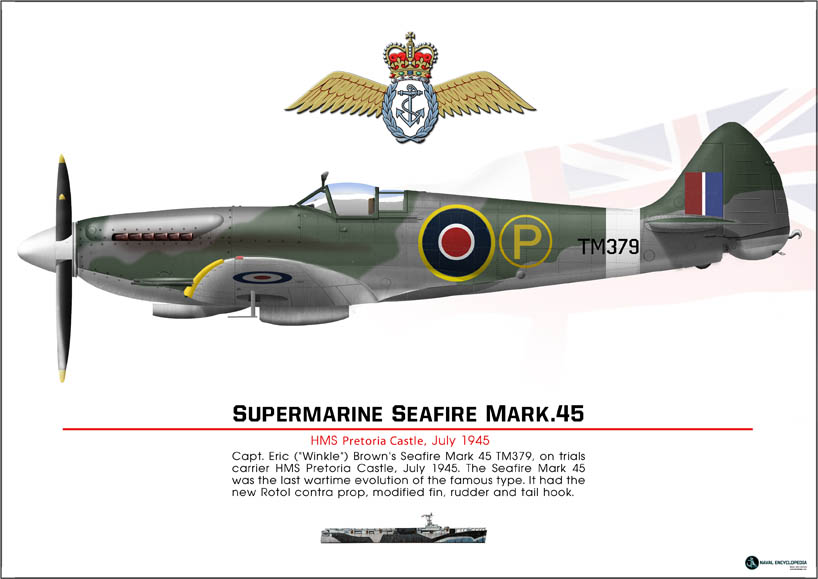
Seafire Mark 45; HMS Pretoria Castle
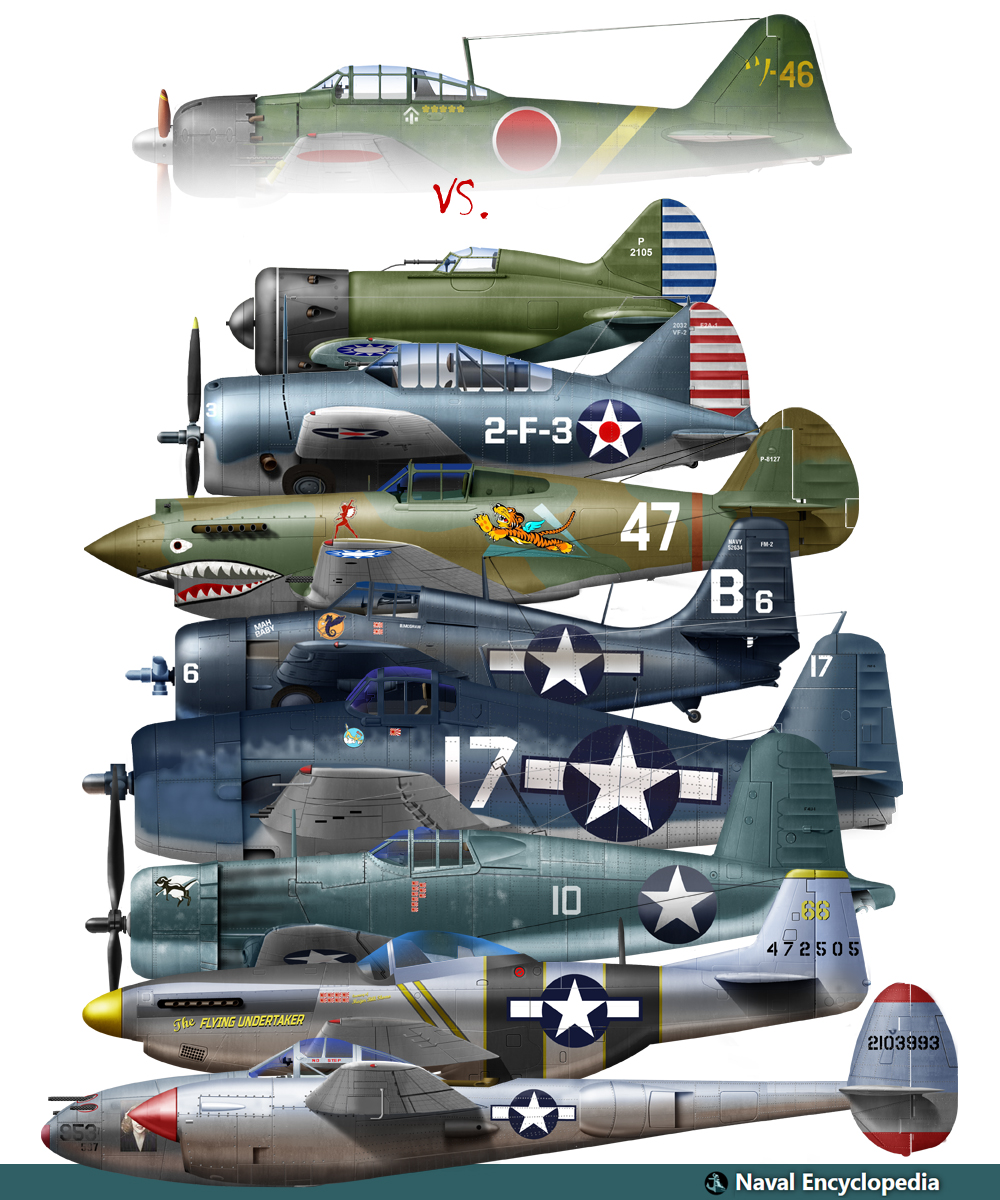
Zeros vs its aversaries
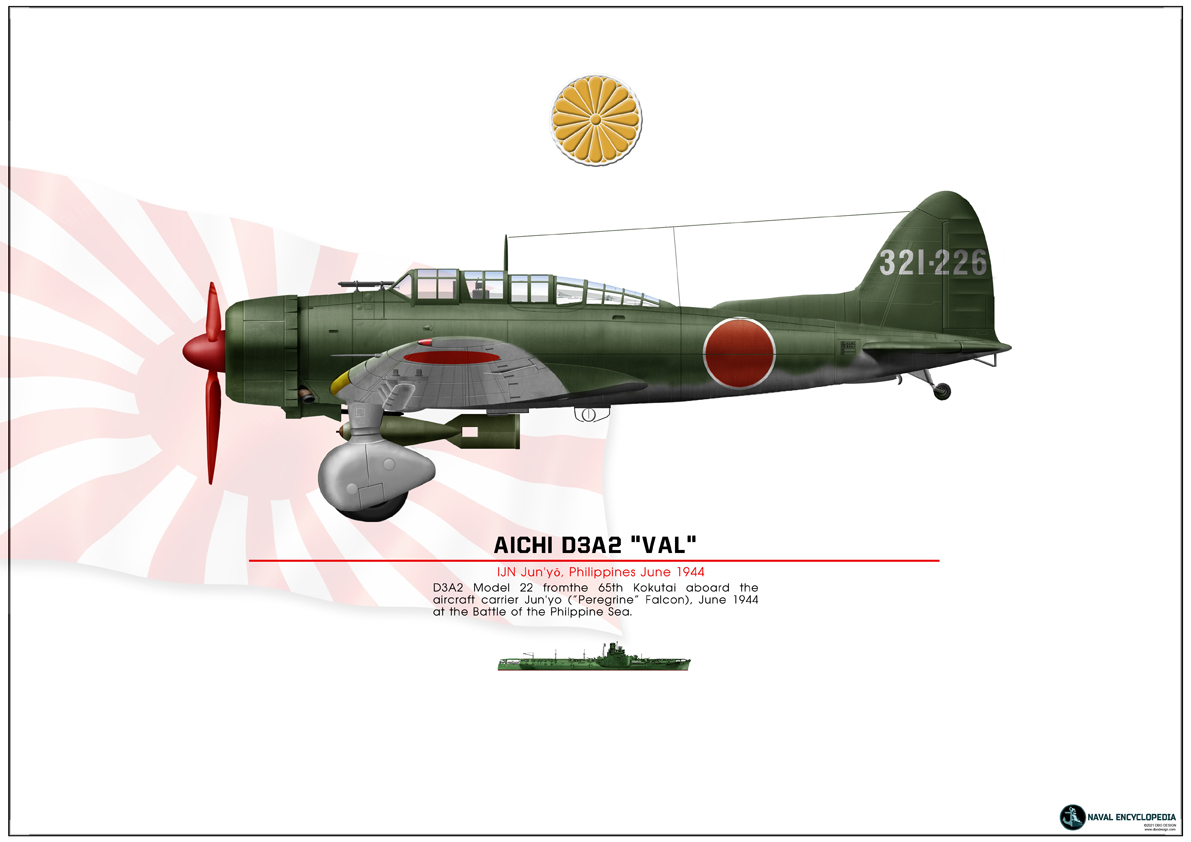
Aichi D3A “Val” Junyo
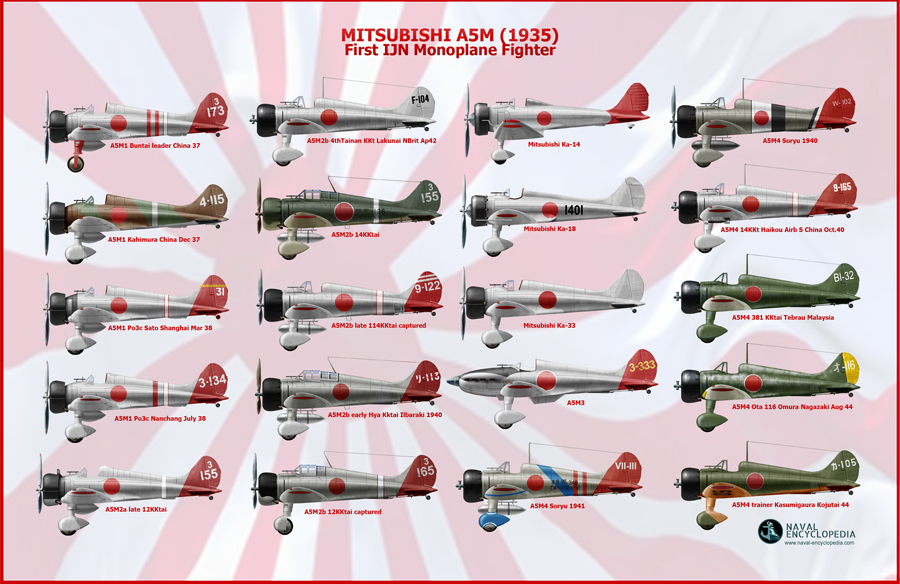
Mitsubishi A5M poster
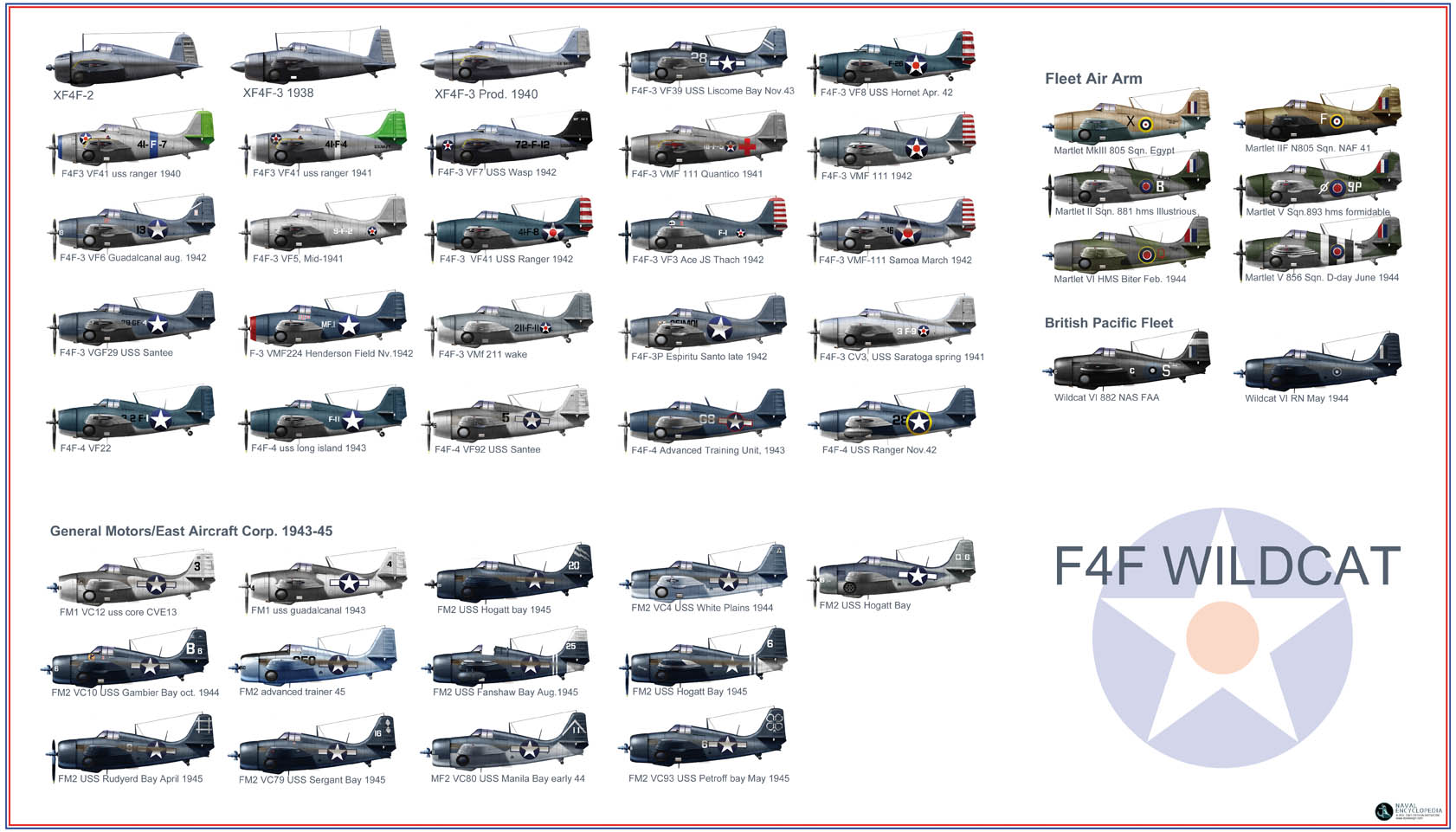
F4F wildcat
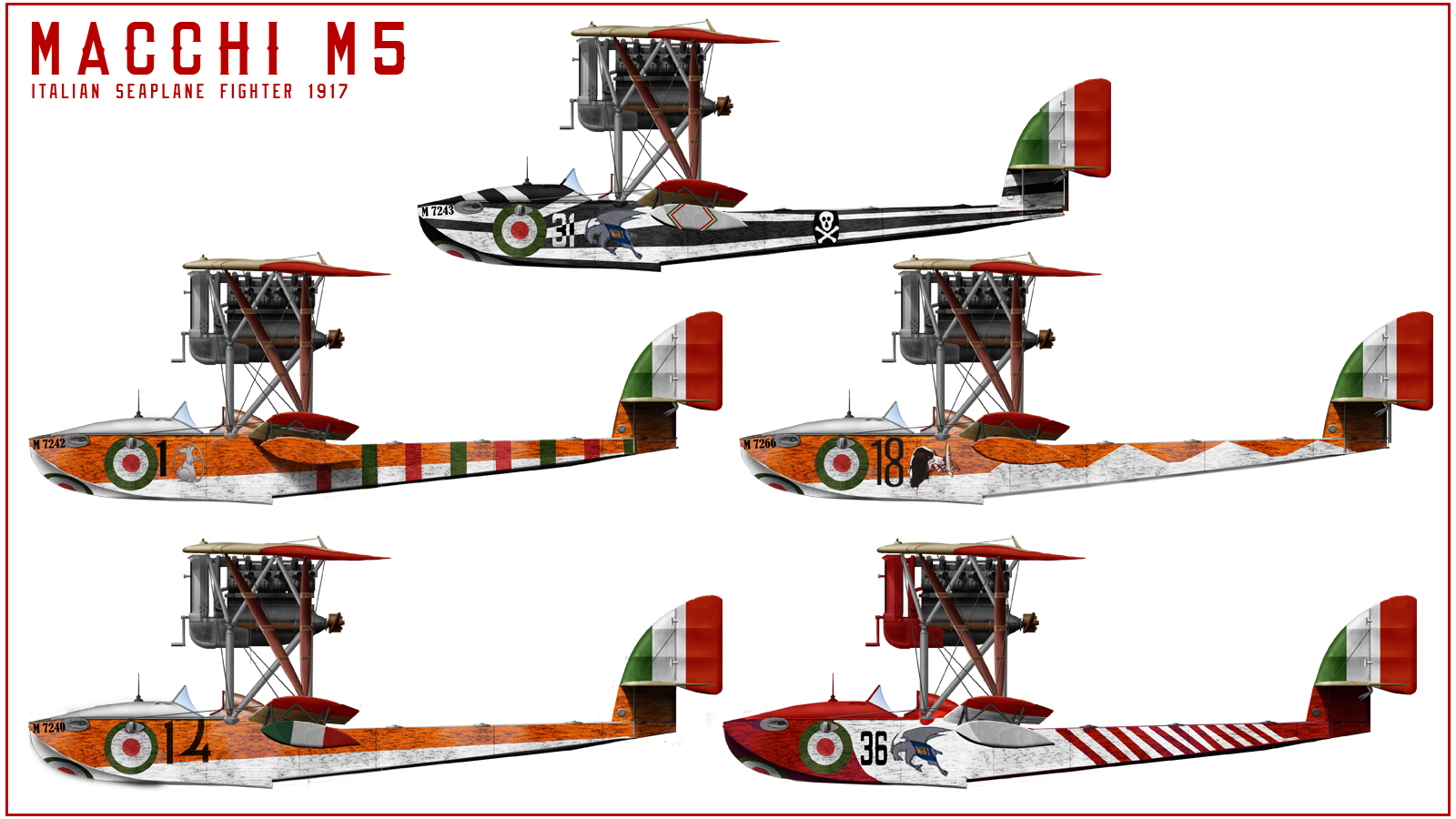
Macchi M5
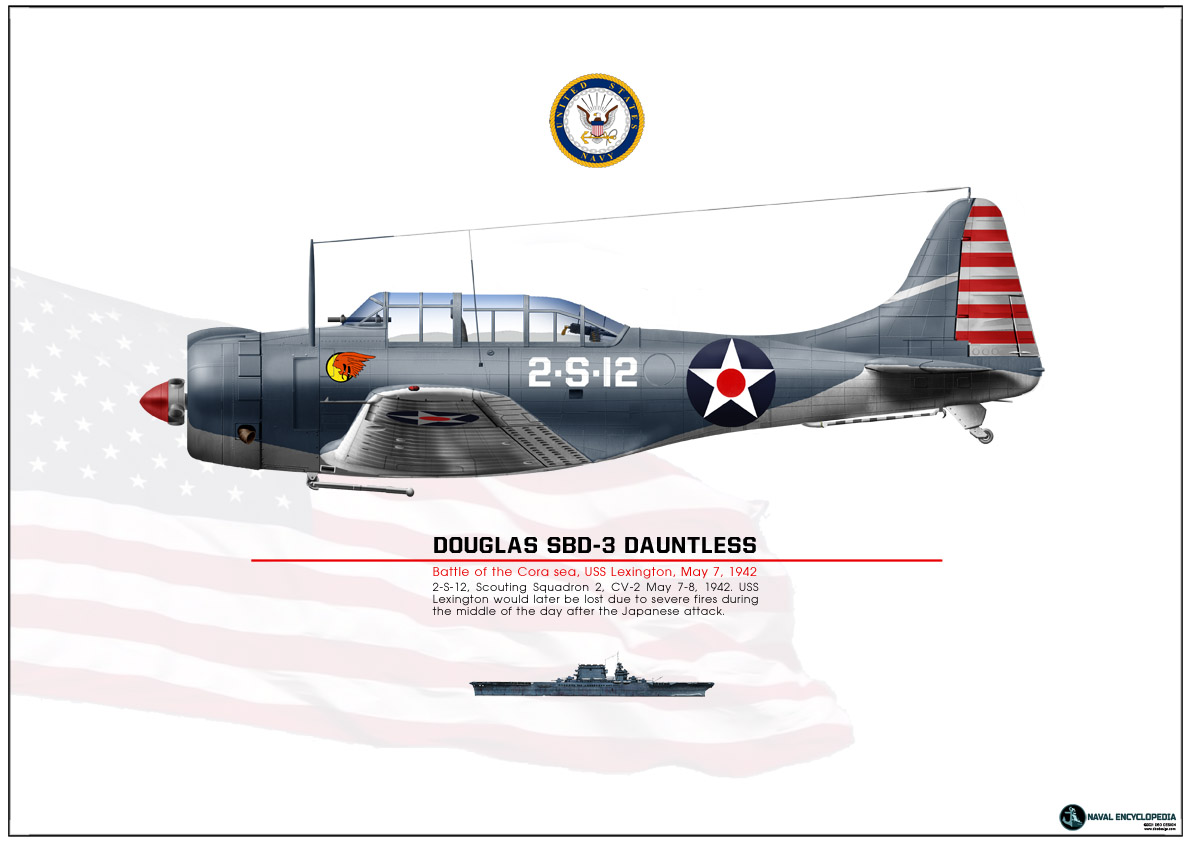
SBD Dauntless Coral Sea
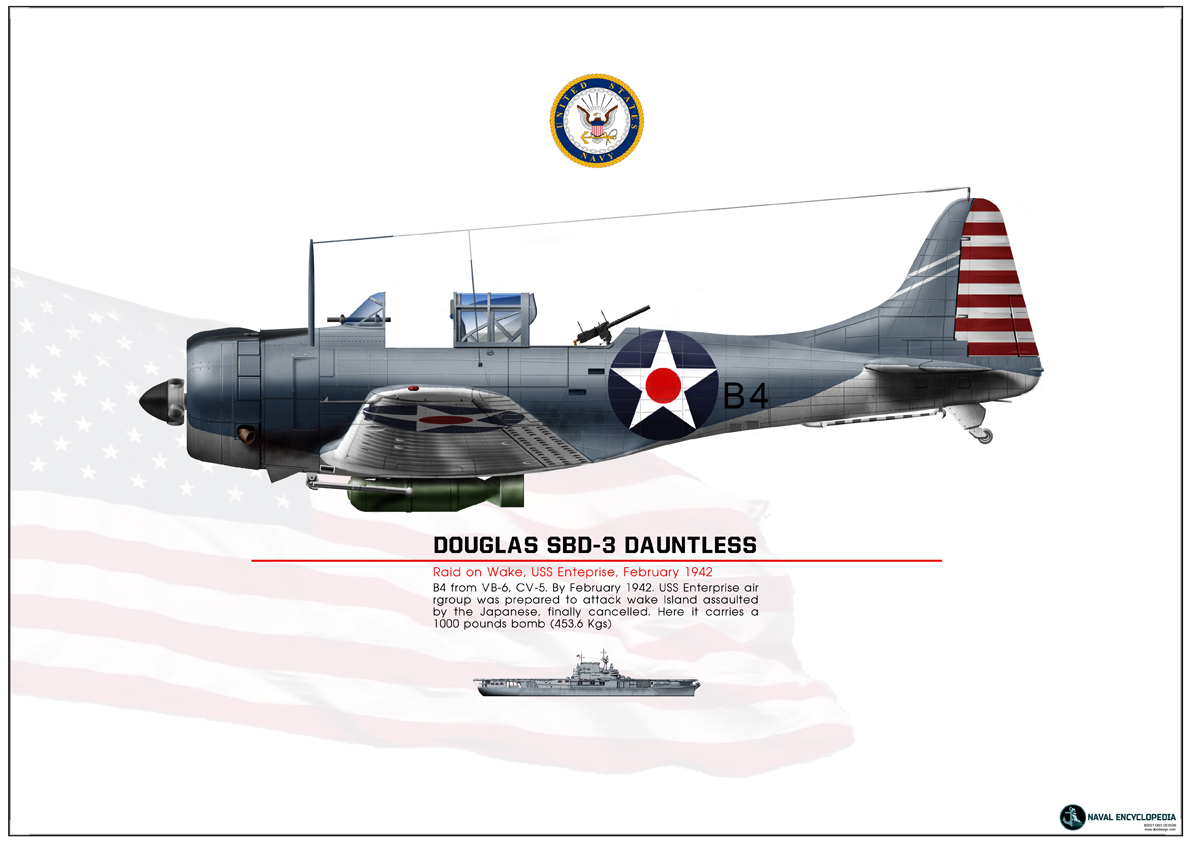
SBD Dauntless USS Enterprise
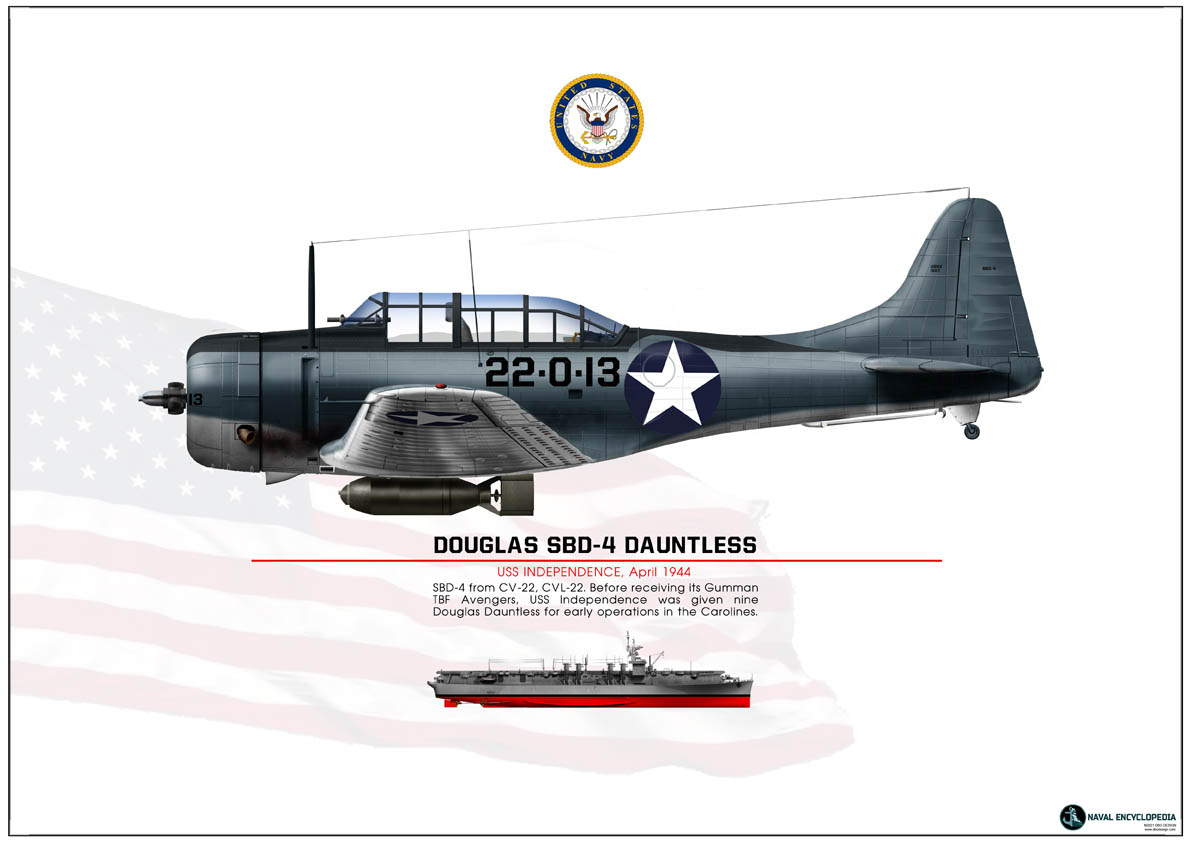
SBD-4 CV22
